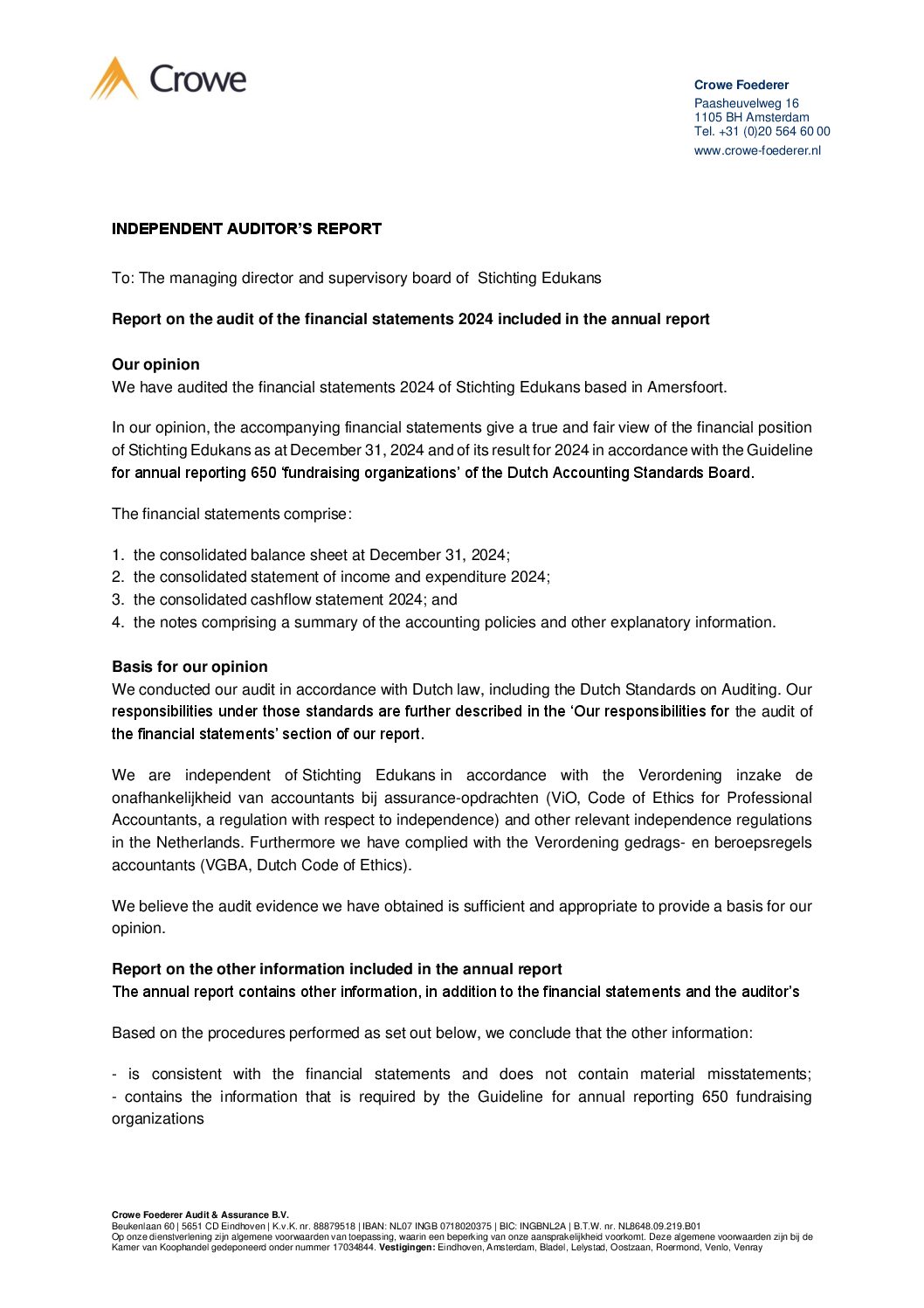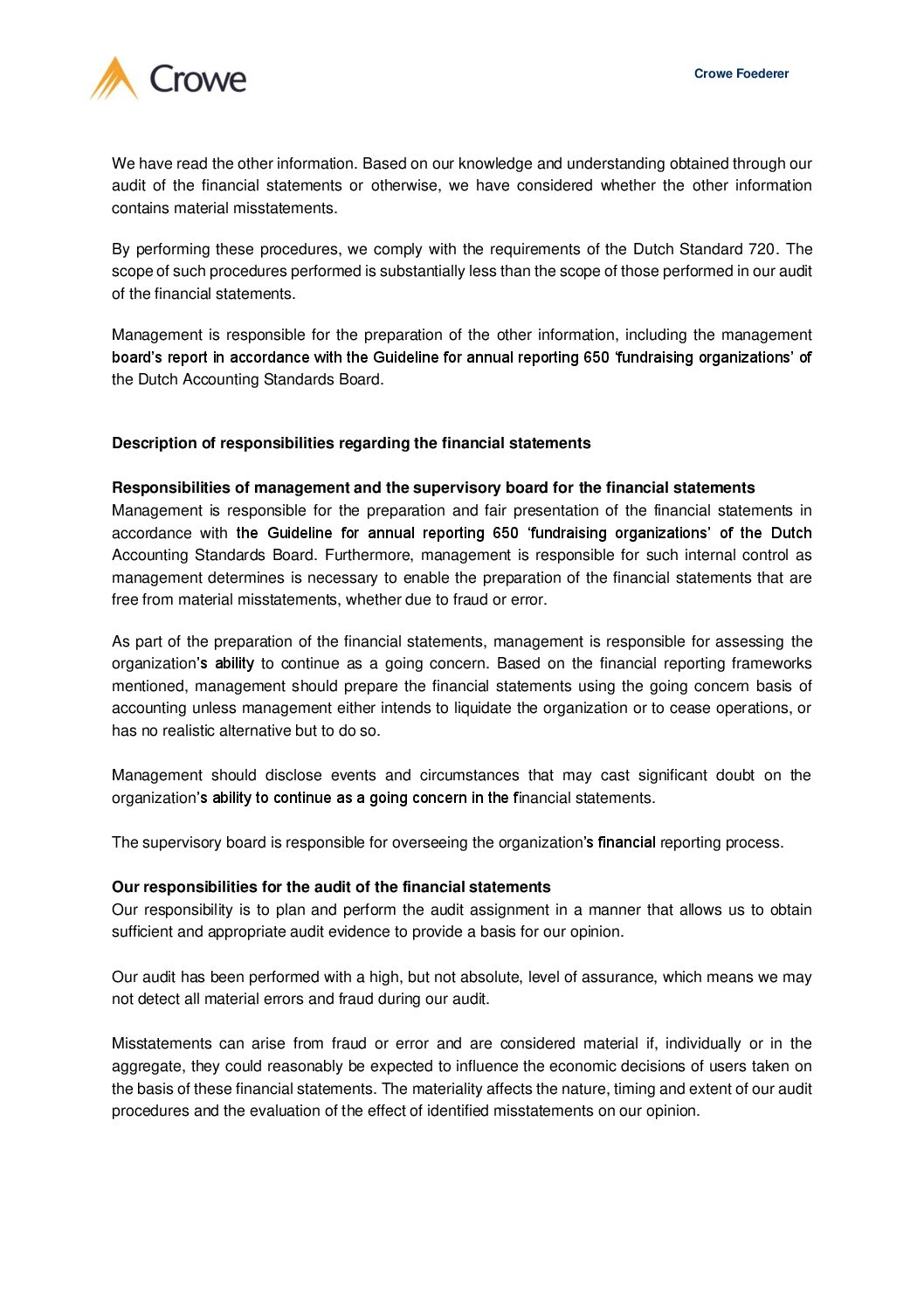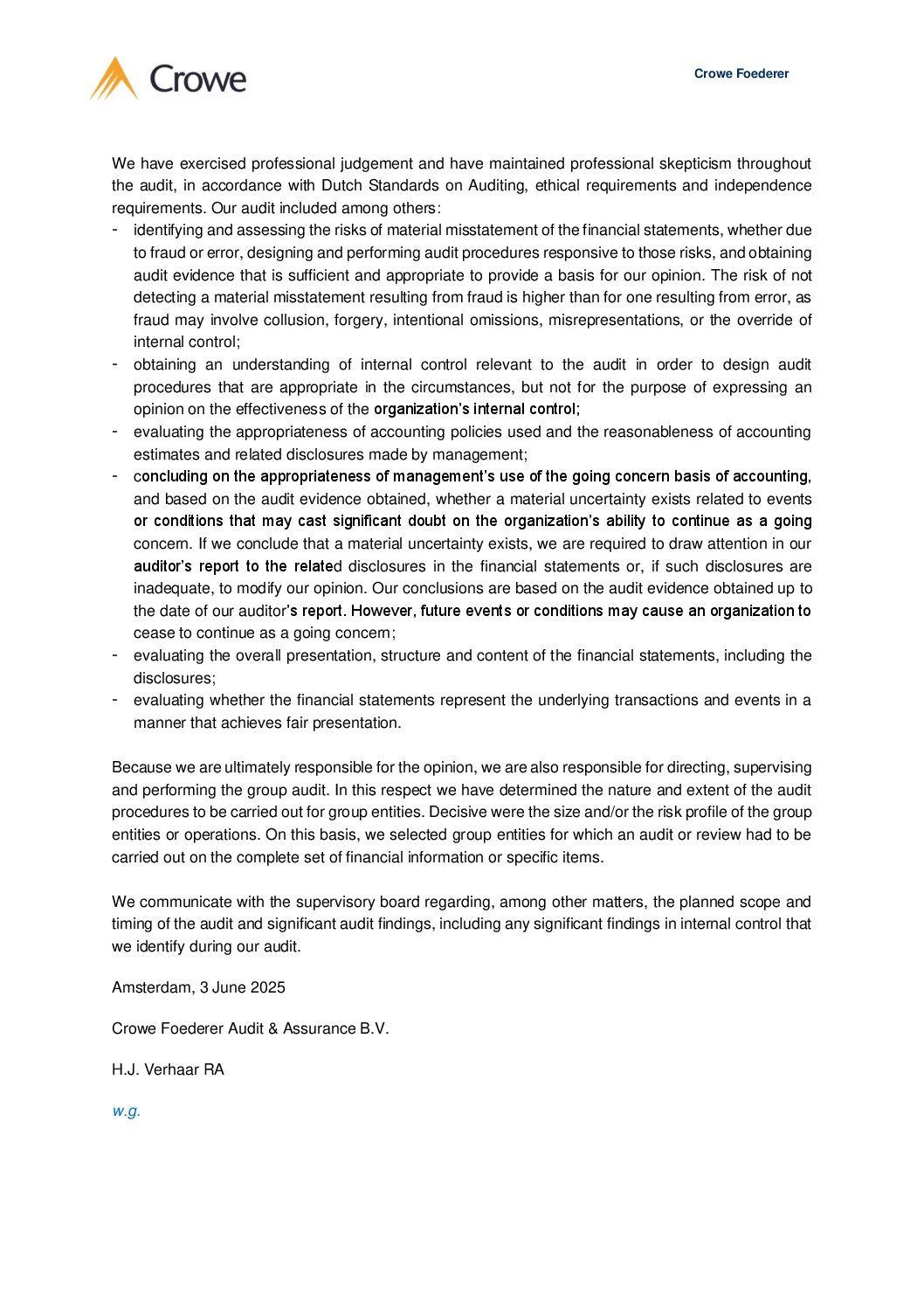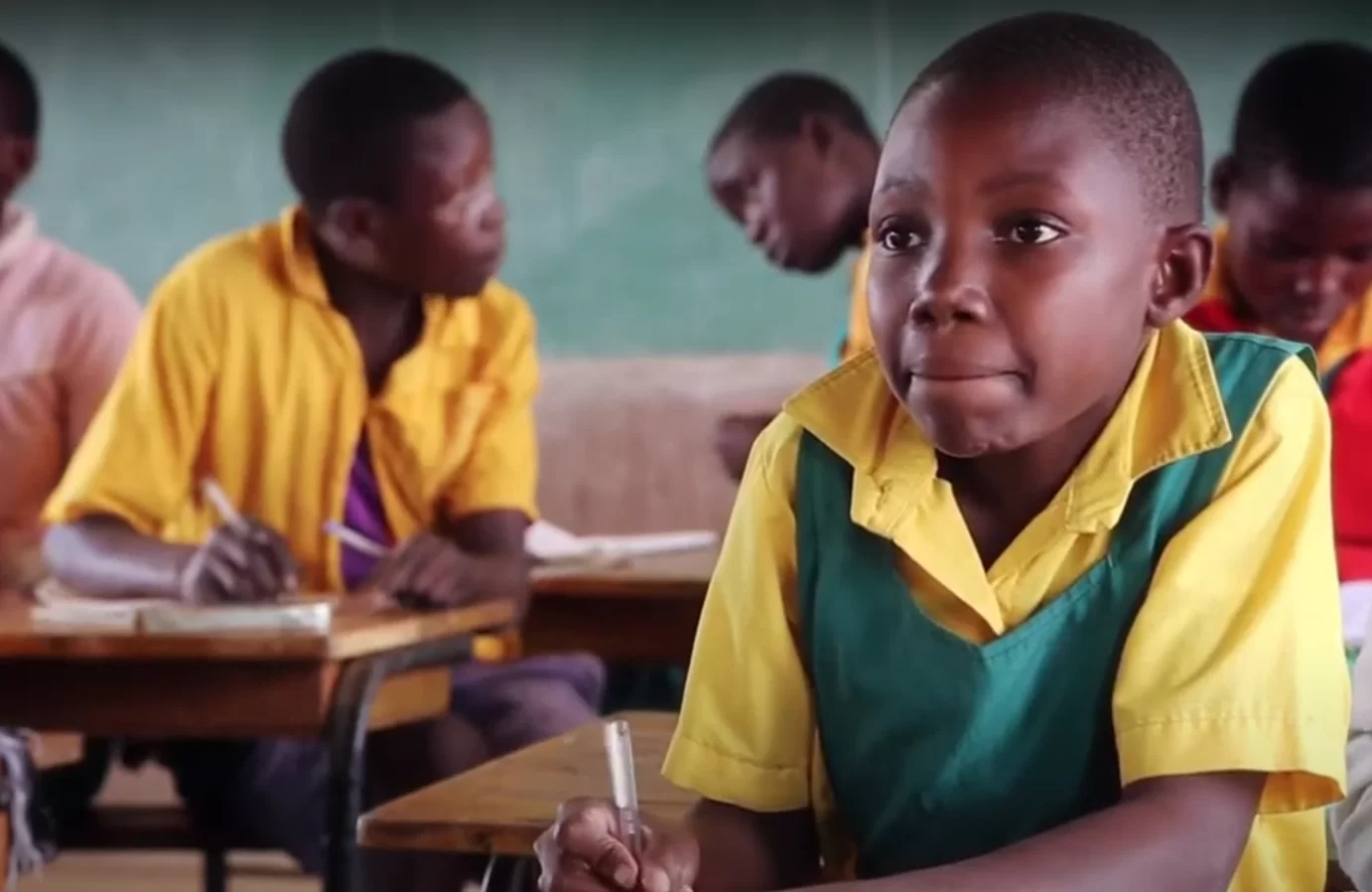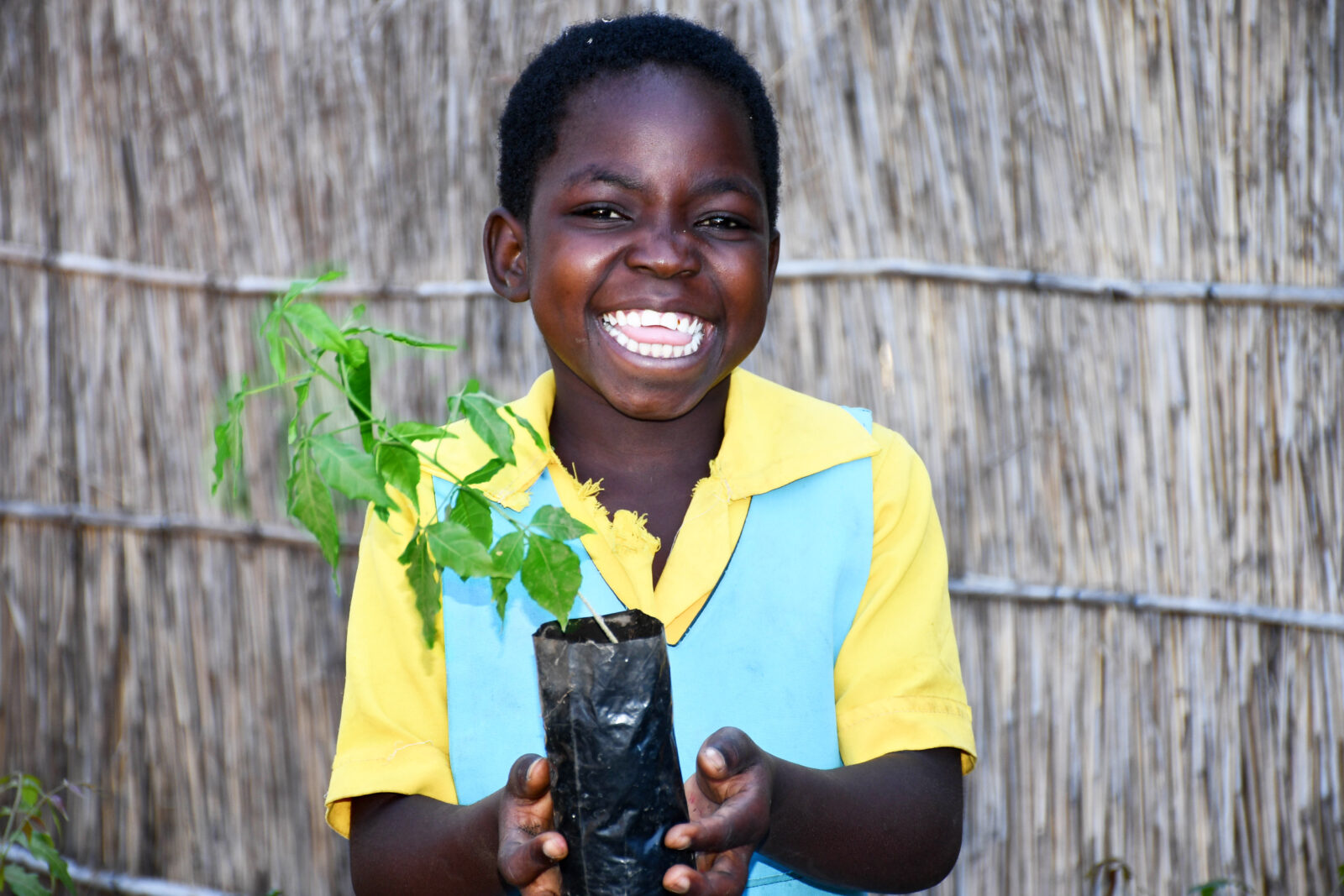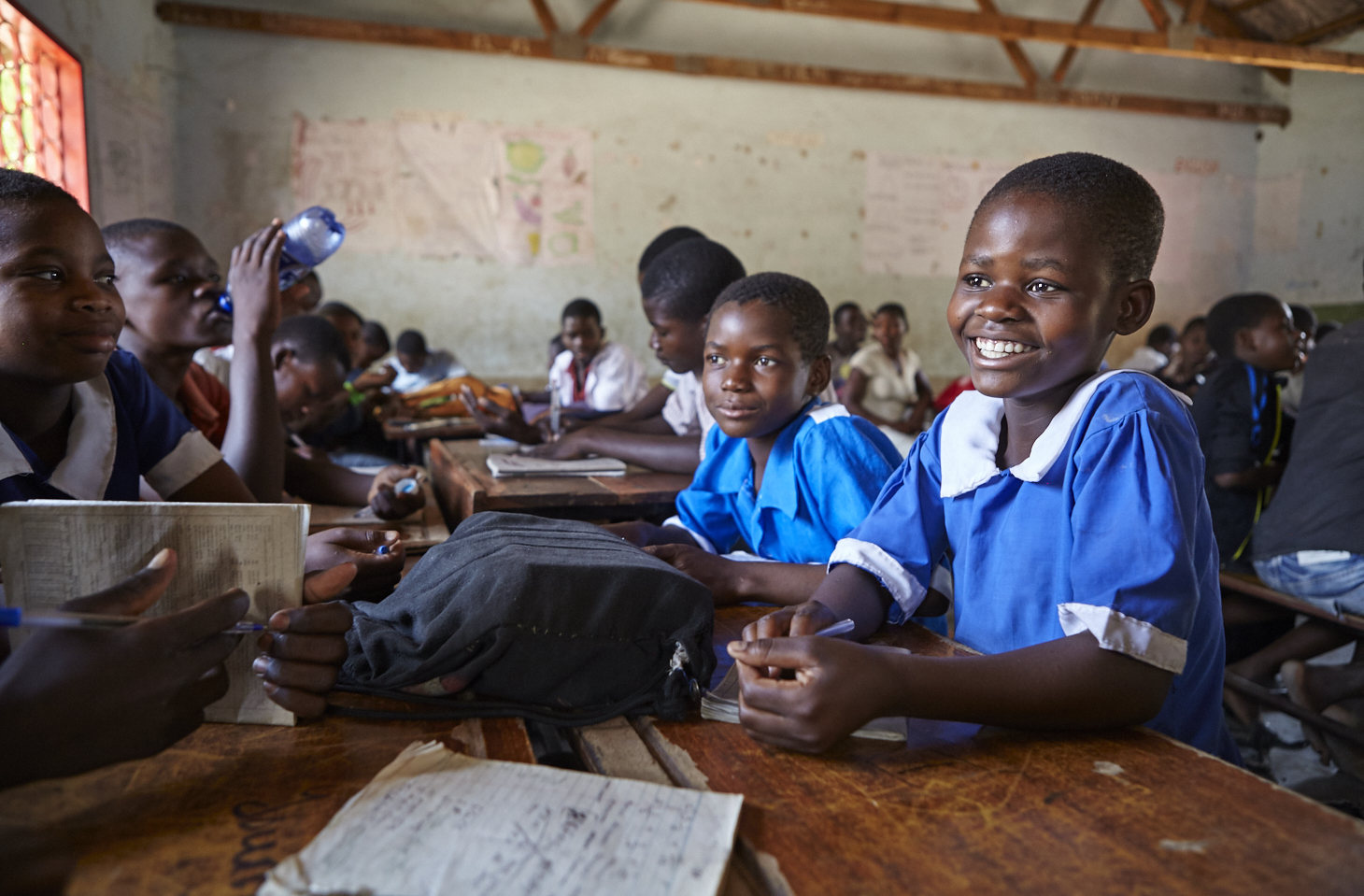Annual Report Edukans 2024
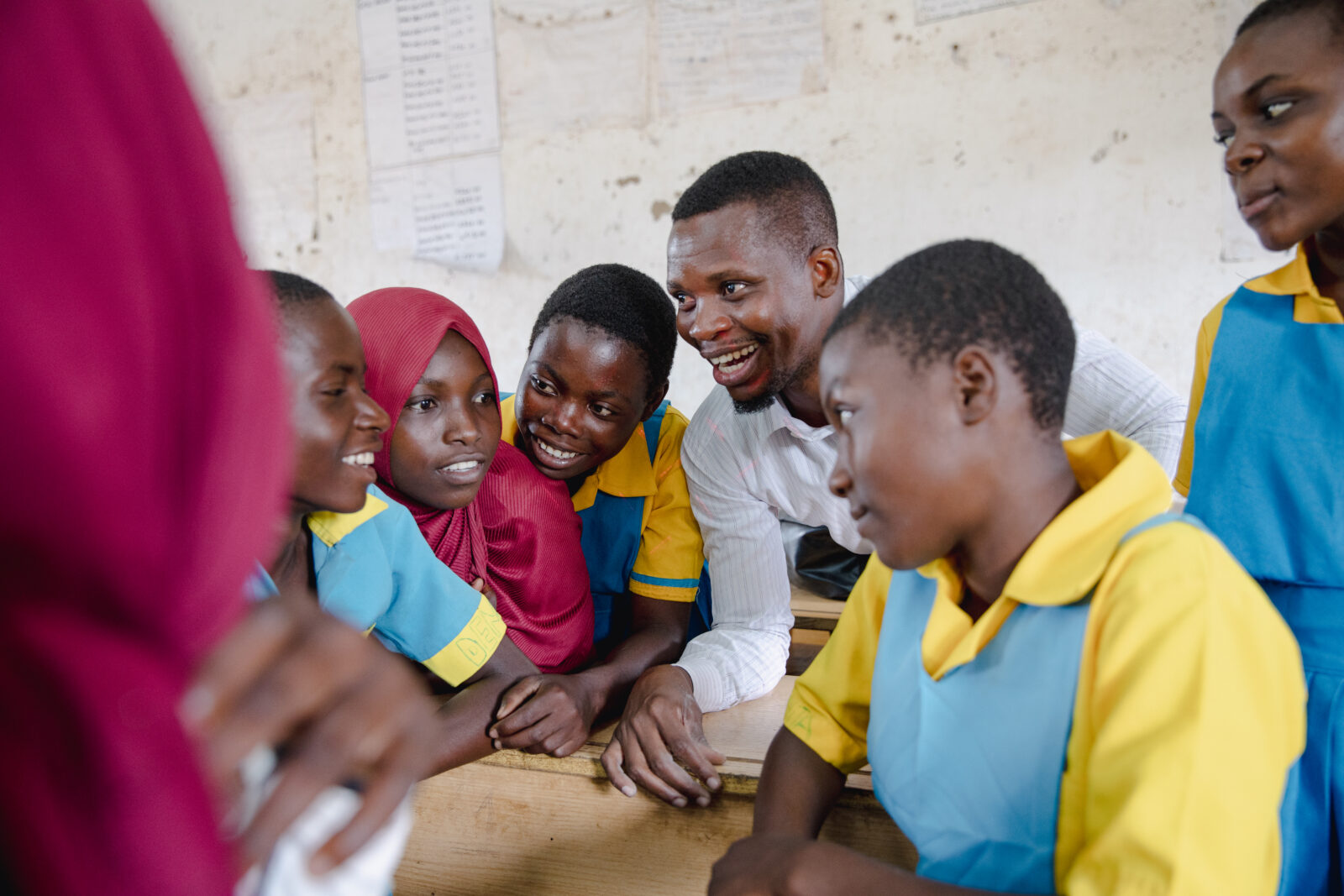

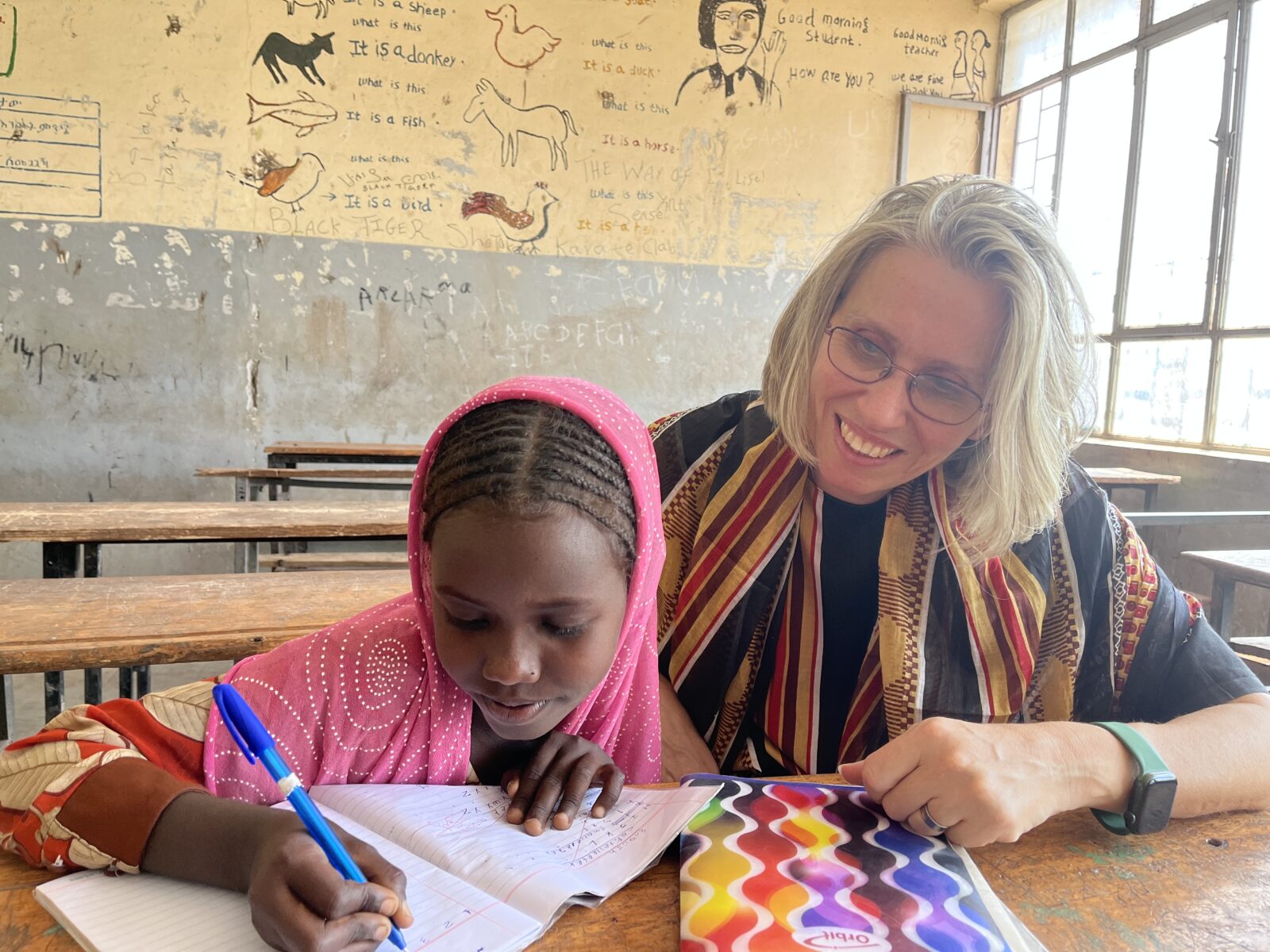
Message from our executive director
Message from our executive director
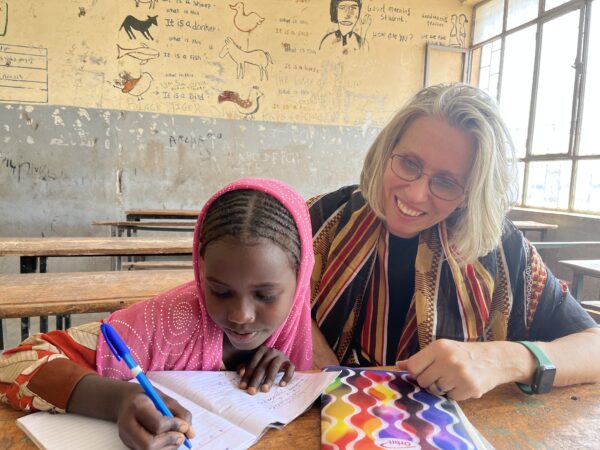
Start learning today for a brighter tomorrow
The world is changing at an unprecedented pace, presenting both challenges and opportunities that shape our future. We are living in an era of rapid change, marked by technological advancements, geopolitical dynamics, climate emergencies, demographic changes, and growing inequalities. The global landscape for civil society organisations is undergoing significant transformation. Available funds from institutional funds are under pressure, largely due to shifts in budget priorities both in the Netherlands and globally.
“You can cut budgets, but you can’t cut away humanity.”
This principle is at the heart of everything we do and remains the foundation of our work. We are dedicated to empowering children and youth* by providing access to quality education, it is a commitment we will never compromise.
Education has never been more crucial than it is today. It is the key to unlocking human rights and breaking the cycle of poverty. Edukans and its partners are committed to advocating and promoting quality education at all levels, ensuring it remains a top priority. Education empowers children and young people with the knowledge, values, and skills to shape their own futures and become agents of education themselves.
Through our programme pillars Basic Education, Skills for Work and Life, Education in Emergencies, and Exchange, we empower children and young people with the tools to make informed decisions and claim their fundamental rights. Quality education lays the foundation for a healthier, fairer world, fostering equality, strengthening communities, and driving sustainable change. We believe education is the most powerful engine for driving progress. Opening doors to opportunities, freedom and peace.
Edukans is Unleashing the Power of Education for a sustainable future for children and young people in Ethiopia, Ghana, Kenya, Lebanon, Malawi, Rwanda and Uganda. In 2024, we launched innovative programmes connecting education with sustainability. Edukans works to improve education quality through a holistic approach that integrates cross-cutting themes, with a strong focus on Climate Change and Digitalisation as critical priorities in all our programmes.
One of these initiatives is “Wear the Green Future”, supported by the Dutch Postcode Lottery. This project equips young people with the green skills needed to transform the textile and fashion industries in Kenya and Ethiopia into sustainable industries. Wear the Green Future empowers young talent to build a greener world and serves as a steppingstone for broader education and circularity programmes.
A key example of our digitalisation programming is Malawi’s BEFIT programme (Building Educational Foundations through Innovation & Technology), which strengthens foundational literacy and numeracy for all primary school learners in the first four years of primary school.
* Children in our Basic Education programmes are between 4 – 18 years old.
Youth in our Skills programmes are between 18 – 35 years old.
We are scaling up our impact with a strategic and comprehensive programmatic approach where projects reinforce each other to reach even more children and young people. By integrating our methodologies into local government frameworks, we strengthen education systems, empower teachers with participative learning methods, foster local ownership, and ensure long-term sustainability.
We have accomplished many significant milestones and I am proud to share a few key highlights from 2024 that we aim to expand further in the coming year.
- Launched several new projects focused on green education, innovation, and technology to build sustainable futures, examples of this include Eco-star schools in Malawi, green schools in Ethiopia and Wear the Green future in Kenya and Ethiopia.
- Strengthened our strategic positioning with long-term partnerships, including Edukans’ appointment as lead education partner, for example with the AFAS Foundation and UNHCR.
- Initiated the development of an Education Expertise Hub in Ethiopia, funded by a generous legacy. This initiative will be further developed and implemented by 2025.
- Enhanced the effectiveness of data-driven action research and innovative teaching methods, such as the Teaching with Impact methodology.
- Successfully engaged loyal supporters and a broader audience through the Green Wish campaign.
This important work would not be possible without the support of people like you, nor without the passionate commitment of the teachers who empower children and young people with the tools to shape their future in freedom. We are also deeply grateful to our ambassadors, whose dedication helps us share Edukans’ mission with a wider audience and reach even more young people with quality education.
At Edukans, we are privileged to work with an exceptional team. I would like to extend a special thank you to all my colleagues for their professionalism, dedication, and resilience – often in challenging conditions. What unites us is a shared passion for education and a belief in its power to transform lives.
A heartfelt thank you to everyone who supports our mission and for placing your trust in us. Together, we are not just providing quality education; we are unlocking potential, breaking down barriers, and transforming lives. The impact we create today will shape generations to come.
Warm regards,
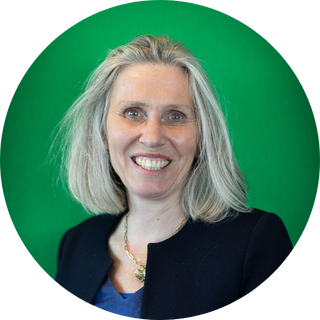
Petra van Haren, CEO Edukans
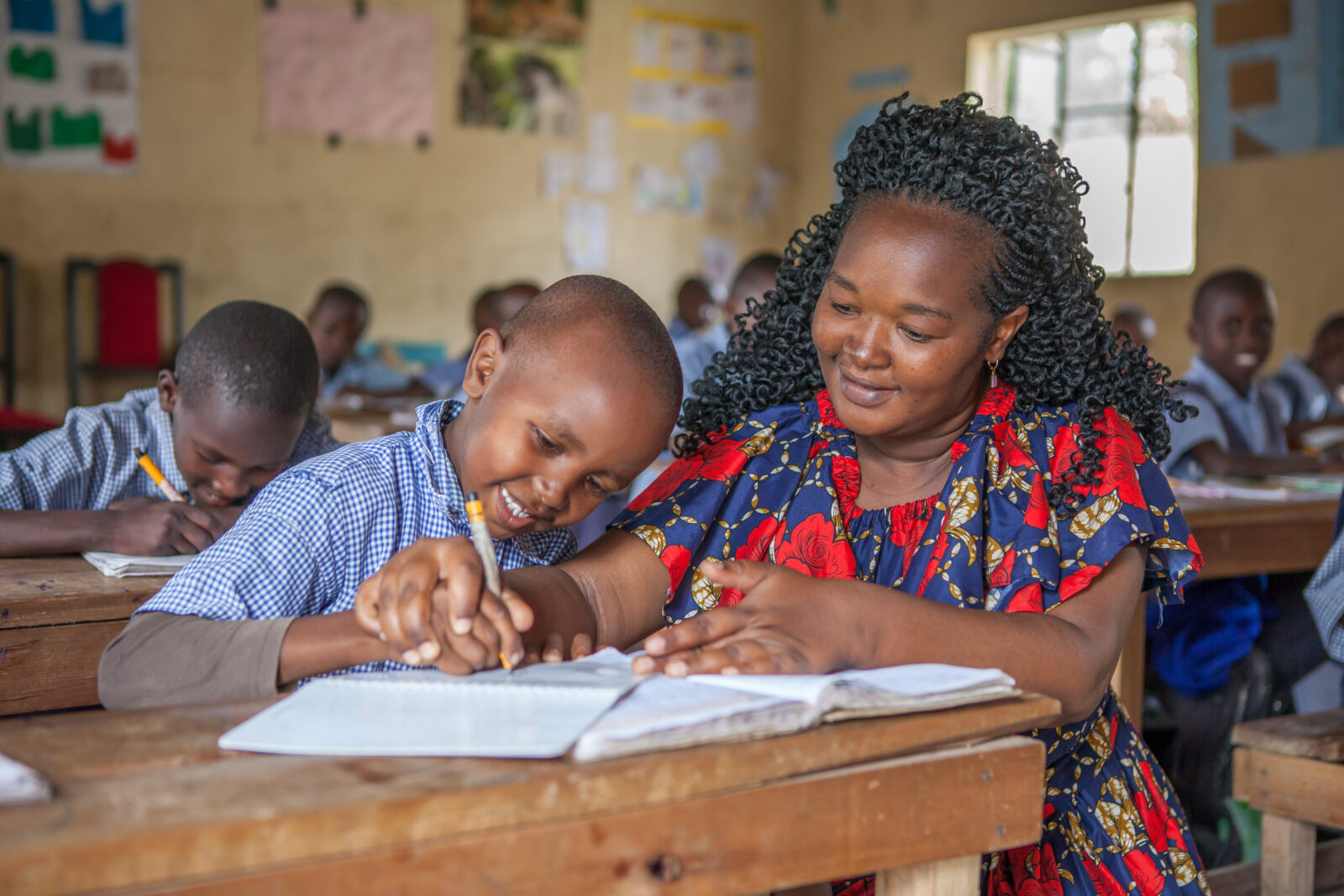
Why do we do what we do?
1. About Edukans

1. About Edukans

Edukans is an international NGO with offices in Ethiopia, Kenya, Malawi, the Netherlands, and Uganda. Alongside our dedicated and passionate teams, we are working to strengthen the education systems across Eastern Africa. We believe education is the most powerful engine for progress. It can enable young people to flourish as they discover and develop their talents, resulting in a healthier, happier and more successful life. It has the power to change societies from within and to support sustainable, inclusive and safe communities. Edukans is committed to unleashing the power of education. To realise its full potential for improving the well-being of individuals and communities, especially those who are marginalised and displaced. We work towards education that equips children and young people with the skills they need to participate in a rapidly changing world, ranging from reading and writing to social and digital skills.
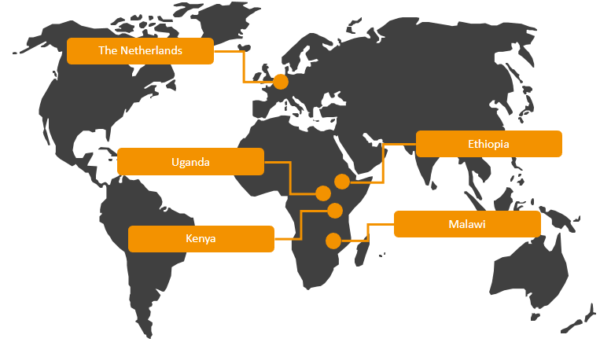
Let’s unleash the power of education together.
Edukans
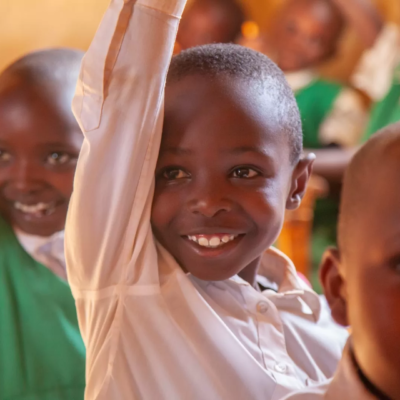
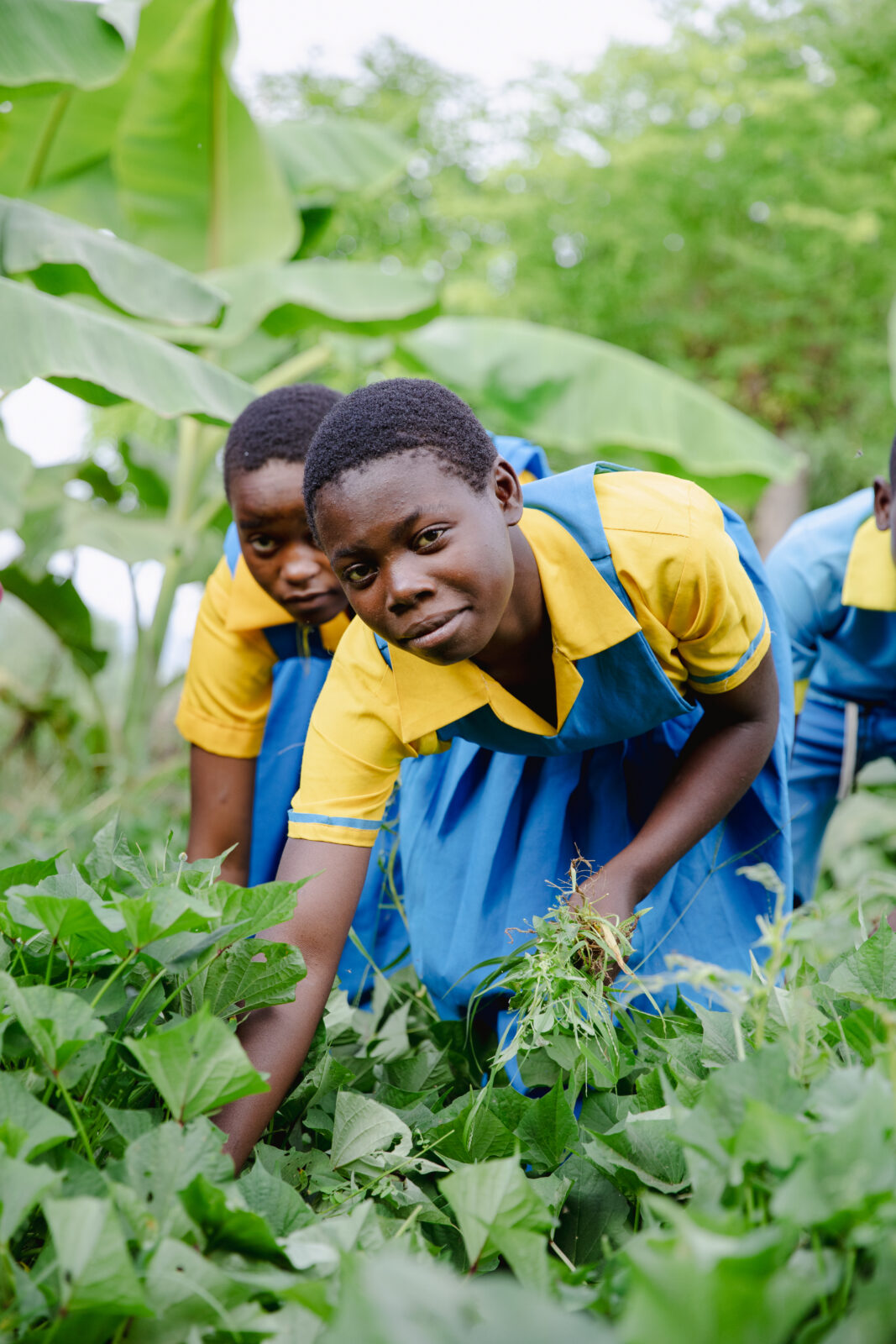
1.1 Our mission
Our mission is to create opportunities, enabling children and young people in Eastern Africa to shape their futures with confidence. We aim to serve them by providing our experience and expertise in the improvement of education on a structural level, because education has the power to change societies from within. We believe that education is the answer to the greatest challenges of our time, such as climate change.
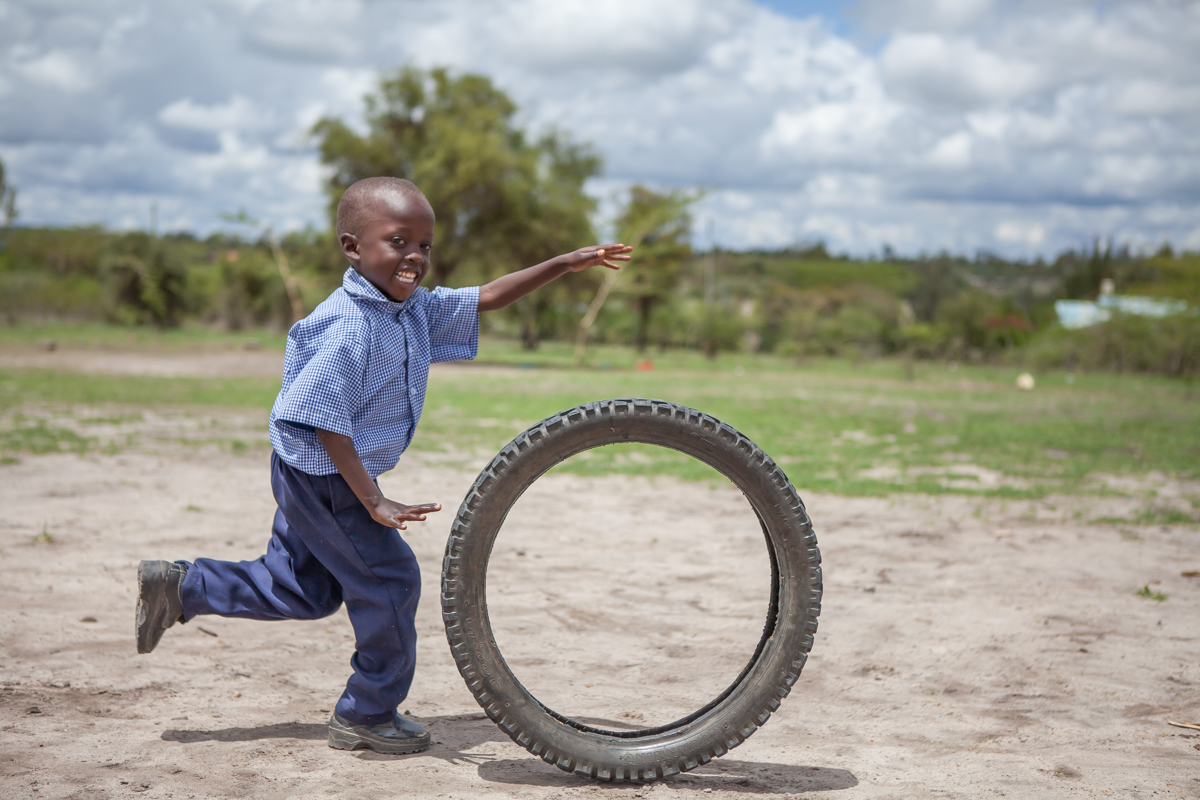
1.2 Key challenges
Edukans addresses key educational challenges in our focus countries Ethiopia, Kenya, Malawi, and Uganda and in 2024 we also implemented projects in Ghana, Lebanon and Rwanda. In these countries, many children attend school however the learning outcomes are quite poor due to less effective teaching methodologies, overcrowded classrooms, and a lack of resources. Youth unemployment remains high because students leave school without the right skills for the job market. Crises such as conflicts and natural disasters disrupt education for millions, while gender inequality prevents many girls from accessing school. In remote and impoverished areas, education remains out of reach due to costs, long distances, or a lack of schools. Edukans tackles these issues by improving teaching quality, providing teacher training, ensuring education in emergencies, and promoting equal opportunities for all. Edukans believes in turning challenges into opportunities and has achieved sustainable impact on quality education through our programmes.
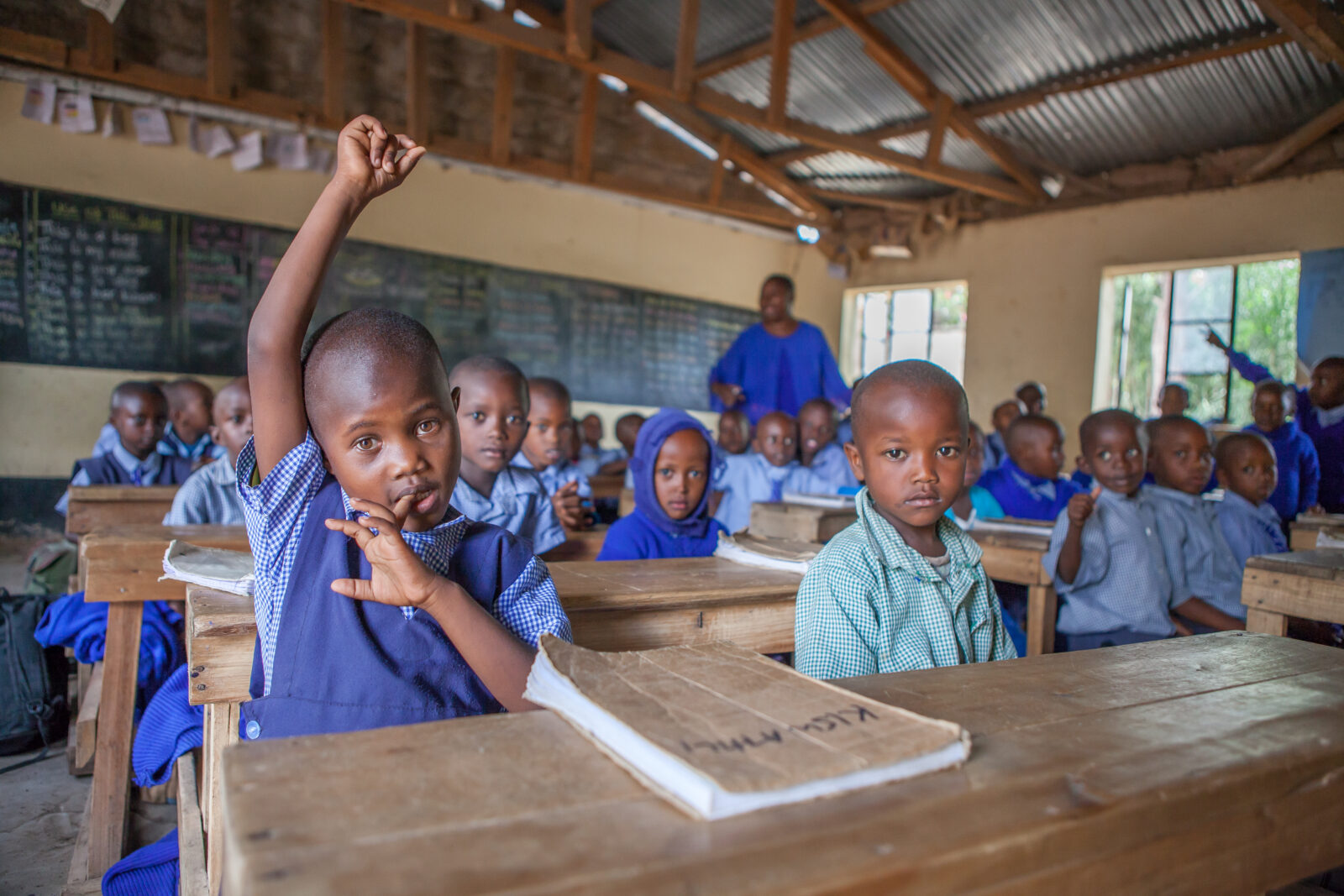

Globally, there is a 9% increase in hourly earnings for every extra year of schooling. That makes education an investment for life. Education delivers significant, consistent returns in terms of income, and is the most important factor to ensure equity and inclusion.
Source: World Bank, 2024
Edukans and the Sustainable Development Goals
We believe in the value of the Sustainable Development Goals which aim to make the world a better place by 2030. Through our efforts to achieve good-quality education for all, Edukans projects and programmes contribute to SDG 4, 5, 6, 8 and 16. We mainly focus on contributing to the goals 4, 5 and 8.
SDG 4 – Quality education
Ensure inclusive and equitable quality education and promote lifelong learning opportunities for all.
SDG 5 – Gender equality
Achieve gender equality and empower all women and girls.
SDG 8 – Decent work and economic growth
Promote sustained, inclusive and sustainable economic growth, full and productive employment and decent work for all.





1.3 Our programmes and ambitions
With a strong professional and personal approach, we are committed to ensuring quality education for children and young people in Eastern Africa. Our ambition for 2021-2025 focuses on four key programme pillars. By reaching millions of students, training thousands of teachers, and empowering young people with essential skills, we are building a future where education is accessible, inclusive, and transformative.
Ambition
In 2024, we further rolled out our strategic agenda. To shape sustainable futures our education system needs to be redefined, and an upscaling of our interventions is necessary, while maintaining the professional, personal, and solid method of working that is so characteristic for Edukans. Our approach aims to ensure the best possible education for children and young people.
Ambition 2021-2025
Basic Education
- To reach 5 million children in primary and secondary education with good education.
- To provide 100,000 teachers with training to develop their teaching skills.
Ambition 2021-2025
Skills for Work and Life
- To train 200,000 young people in skills needed for work and life.
- To train the staff of 100 TVETs (Technical and Vocational Education and Training) in our skills methods (7-Steps to Work, Entrepreneurship, Work Based Learning, Life skills, and Active Teaching and Learning).
Ambition 2021-2025
Education in Emergencies
- To ensure that 250,000 displaced children and 25,000 young people enjoy full access to quality education, including wellbeing, by training 6,000 teachers.
Edukans Theory of Change
With over 20 years of experience, we have developed a solid Theory of Change that is guiding our work for quality education.
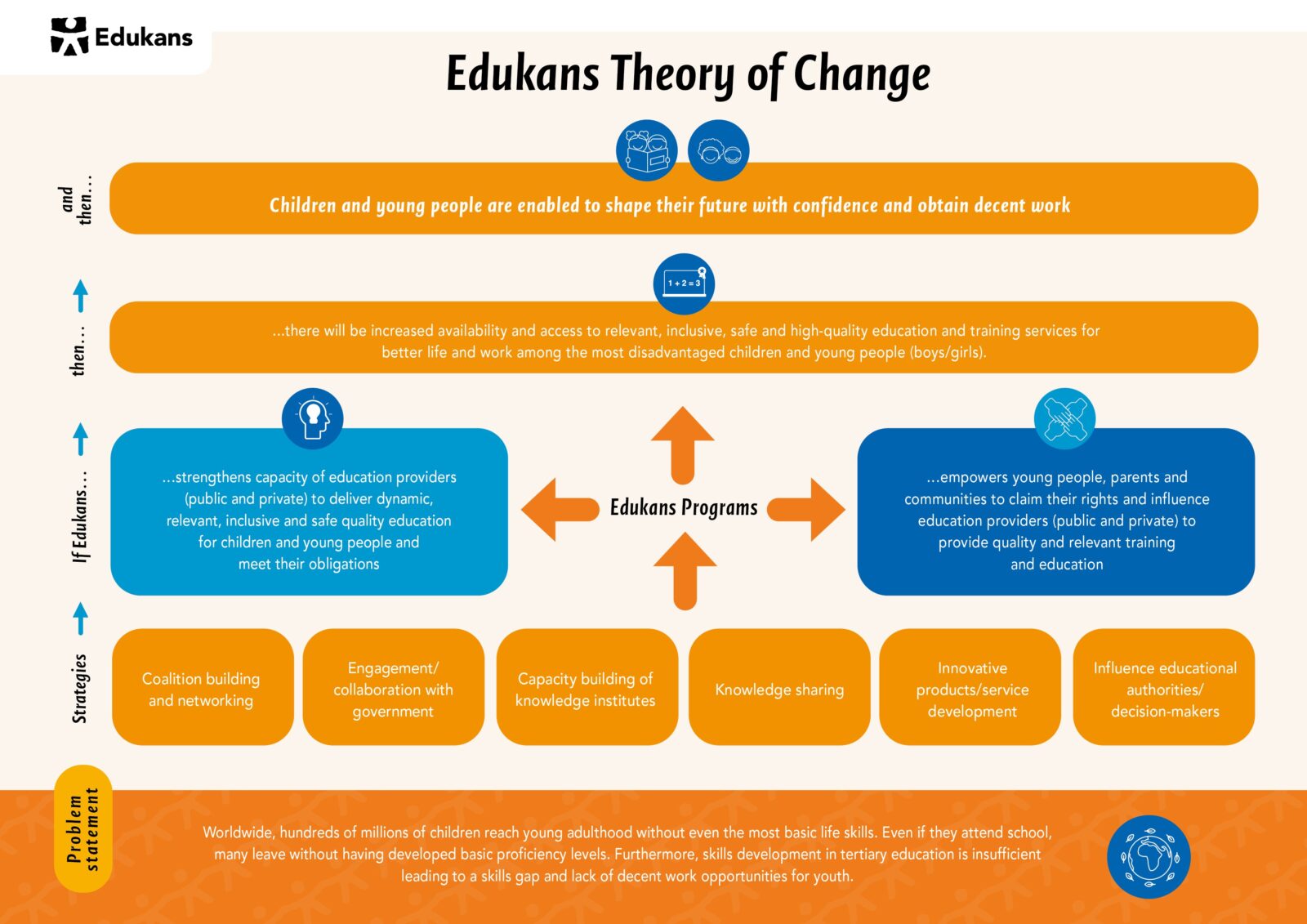
Financial Sustainability & Boosting Strategy
In June 2024, we conducted a comprehensive evaluation of how we are achieving our financial and organisational targets. To accelerate our efforts, we are implementing a focused boosting, high-impact strategy. With this approach, we aim to accelerate progress towards our strategic goals and address funding challenges head-on. In the final year of our current multi-annual strategy, we are concentrating on critical pathways to maximise meaningful impact, achieve financial sustainability, and advance our efforts towards meeting the goals of SDG 4 and 8.
- Pathway 1: Operational capacity and fostering a culture of accountability
- Pathway 2: Boosting quality and deepening our education expertise
- Pathway 3: Strategic fundraising
- Pathway 4: Development of new multi-annual strategy
Geographical focus
Edukans is active in four focus countries: Ethiopia, Kenya, Malawi and Uganda. Country offices have been established and registered in these countries, and national staff engaged. In these countries, Edukans aims to develop a diversified portfolio, offering the full range of Edukans programmes to change the long-term prospects of people in these countries. In addition to the focus countries, Edukans also implemented projects in Ghana, Lebanon, and Rwanda in 2024.
Cross-cutting themes
Edukans is dedicated to improving education quality through a holistic approach that integrates cross-cutting themes into all our programmes. Climate change is no longer just one of many concerns – it is the defining crisis of our time, demanding a multidisciplinary response. We are committed to rethinking how education can contribute to climate solutions. Digitalisation is another key priority, as the digital divide continues to limit learning opportunities for millions of children. By embedding digital skills into pedagogy, we ensure students are equipped for the future. Gender and inclusion remain at the heart of our mission, as true equality in education requires equal access and opportunities for all. Through clear policies and inclusive methodologies, we create learning environments where diversity is embraced, barriers are removed, and every student can thrive.
Basic Education
We believe in the power of quality basic education to enable children to develop, and ultimately to contribute to a better world. Edukans’ vision on quality education involves the promotion of safe, inclusive schools where children enjoy learning from well-trained teachers and develop the competencies – skills and attitudes – to continue their education.

To make our interventions a success, Edukans works with the Star School quality model which follows a clear programme encompassing five domains for quality education: learning environment, teaching, learning, school management, and community and parental involvement.
We support the improvement of basic education with our Star School quality model, our Teaching with Impact methodology, the assessment tool EDU Q-card, and our Social and Emotional Learning approach. Learn more about these interventions below.
“Every child has the undeniable right to education, yet sadly this is not always a reality. As a parent, I witness every day how transformative education is in preparing my children for the challenges and opportunities ahead. That’s why I’m honoured to work with Edukans, an organisation committed to prioritising quality education. By uniting efforts with governments and local partners, we equip children with the knowledge and skills to claim their right to education, build a sustainable future, and uplift their communities. At the core of everything we do is the belief in the power of education, and the resilience of young people fuels our drive every step of the way.”
– Bas JM Beek, Head of Programmes
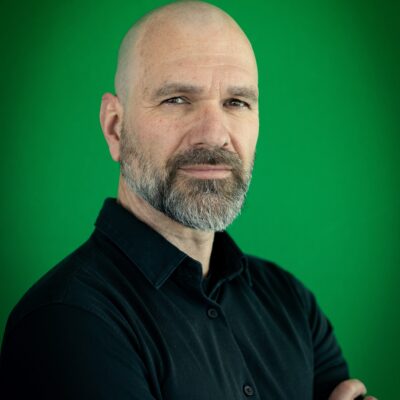
Skills for Work and Life
Skills for Work and Life is an Edukans programme for young people which helps them to develop their skills in preparation for work and for meaningful participation in society. Employers are looking for employees with the skills that will be needed tomorrow, for the jobs of the future. The programme focuses on the development of skills which are relevant to the labour market so as to increase the chances of decent (self) employment. We support the development of relevant skills for young people with our 7 steps to WORK model, our Work Based Learning approach, life skills and digital pedagogy trainings. Learn more about these interventions below.
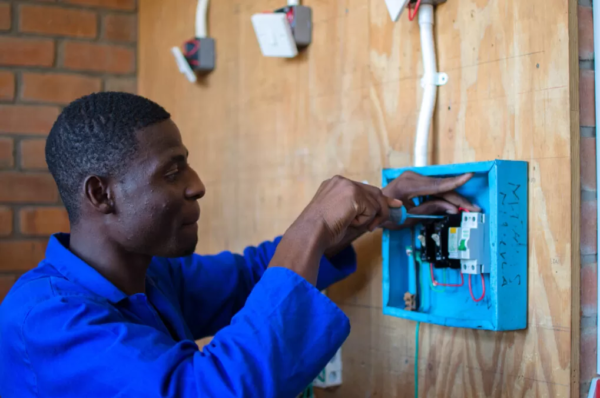
Education in Emergencies
Edukans ensures that children in crisis-affected areas – whether due to conflict or natural disaster – continue learning in safe environments. Schools provide not just education but also stability, mental health support, and a pathway to a better future. Our programme focuses on access, quality, well-being, and advocacy. We establish safe, green schools, train teachers in inclusive and climate-resilient education, and support students with Social and Emotional Learning, creating long-term impact in crisis settings.

Exchange
At the heart of Edukans’ mission is the belief that empowered teachers shape the future of education. The Exchange Programme promotes collaboration between educators in the Netherlands and our focus countries, creating opportunities for knowledge-sharing, professional development, and the advancement of quality teaching and learning. By connecting teachers international, Edukans facilitates peer-to-peer learning, pedagogical skill growth, and improved school management while reinforcing educators as role models in children’s lives. In doing so, we empower teachers to inspire and motivate one another.
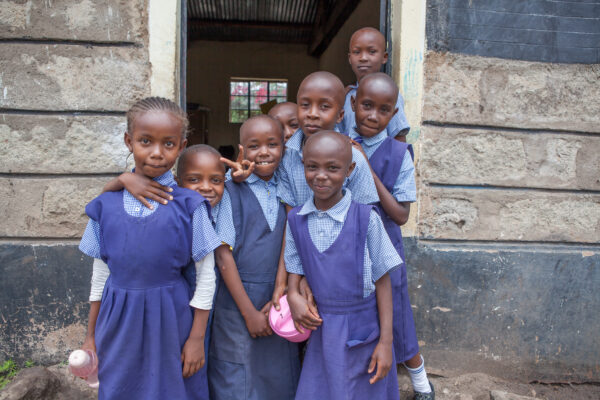
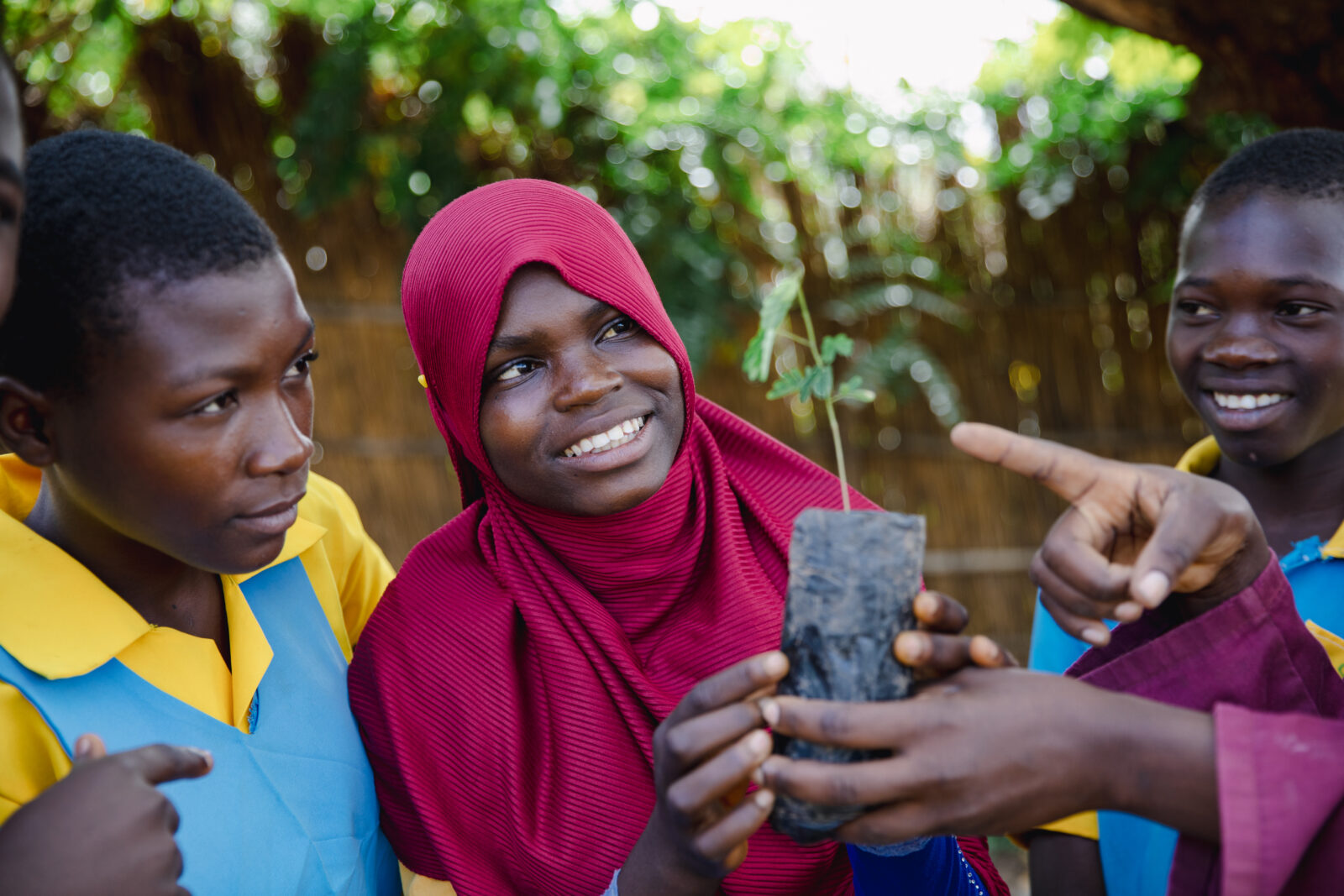
How did we make the difference?
2. Our results in 2024

2. Our results in 2024

Introduction
In 2024, we have contributed to learning opportunities for 334,294 children and adolescents. Our impact goes beyond just the number of new children and young people we reached this year. We are still dedicated to supporting those we started working with in previous years, making sure they continue to grow and thrive. It is a result we are proud of, yet there is still much work to be done.

Total reach:
334,294 children & young people
received improved quality education
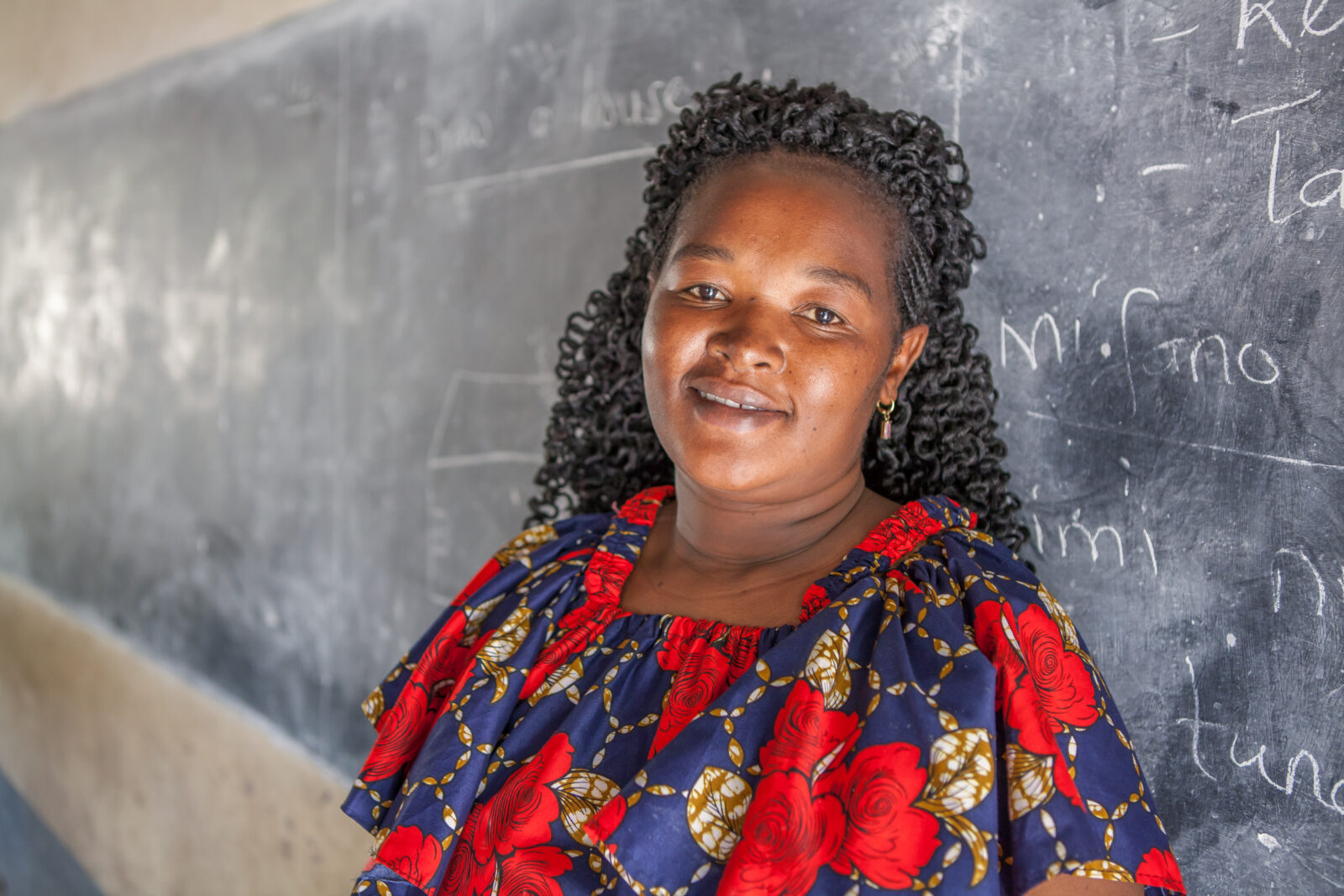

Total reach:
10,361 teachers
were equipped with the competencies to improve the quality of education
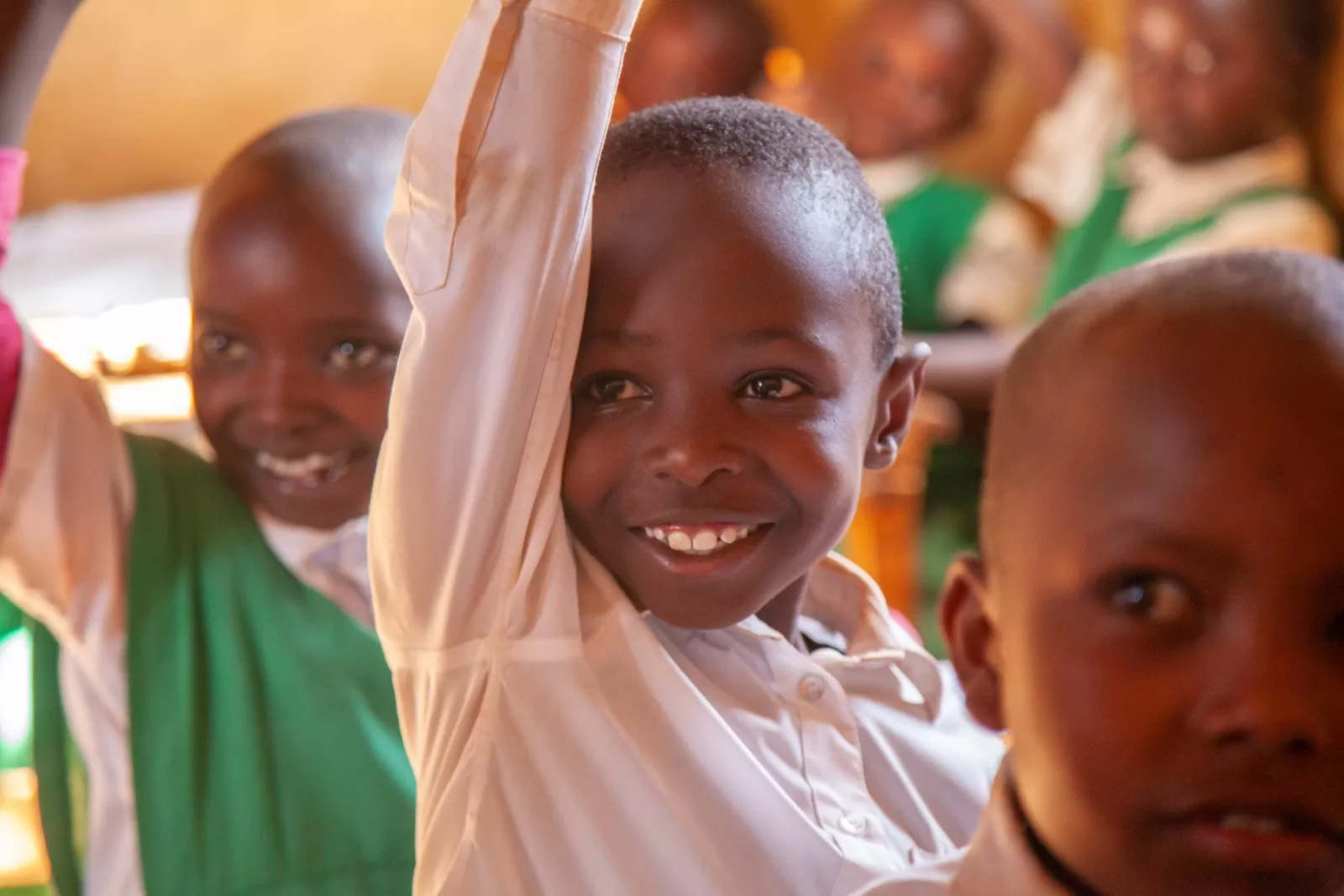

Basic Education
271,160
children received improved quality education

Basic Education
7,868
teachers developed their pedagogical skills

Basic Education
2,590
Star Schools improved the quality of education for learners and teachers

Skills for Work and Life
5,651
young people developed their skills in preparation for work and life

Skills for Work and Life
339
teachers were equipped with the competencies to teach life skills
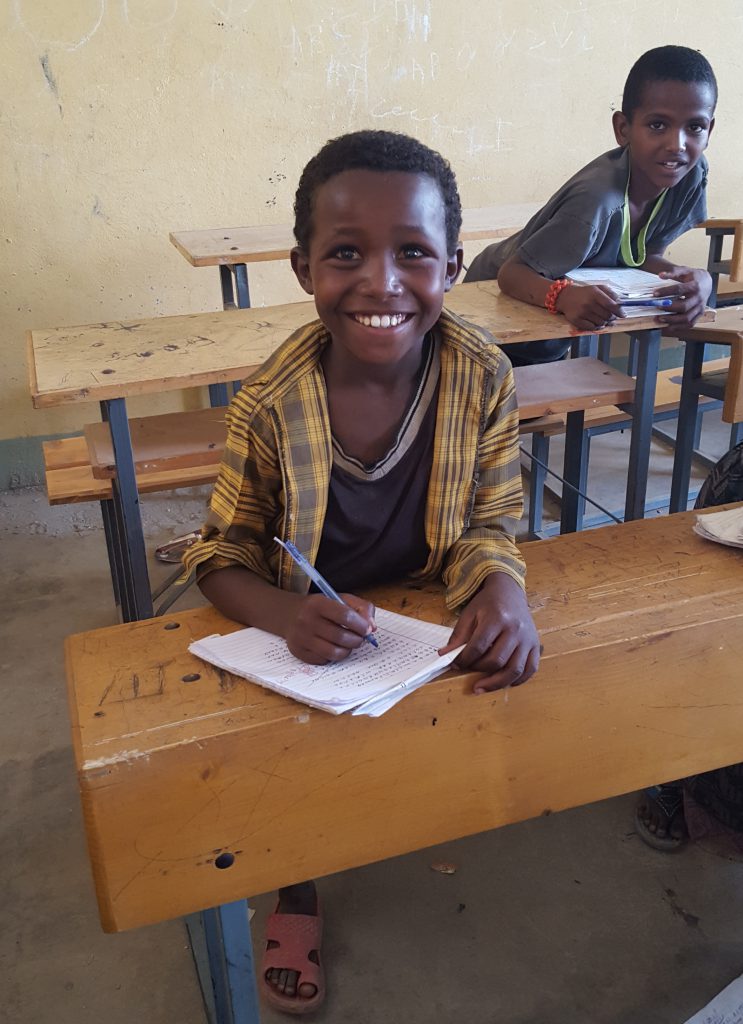

Education in Emergencies
57,483
children and young people received quality education in emergency situations

Education in Emergencies
2,154
teachers were trained in child-centred pedagogy and learning and behavioural difficulties

We have worked on
28
projects

We have worked in
7
countries
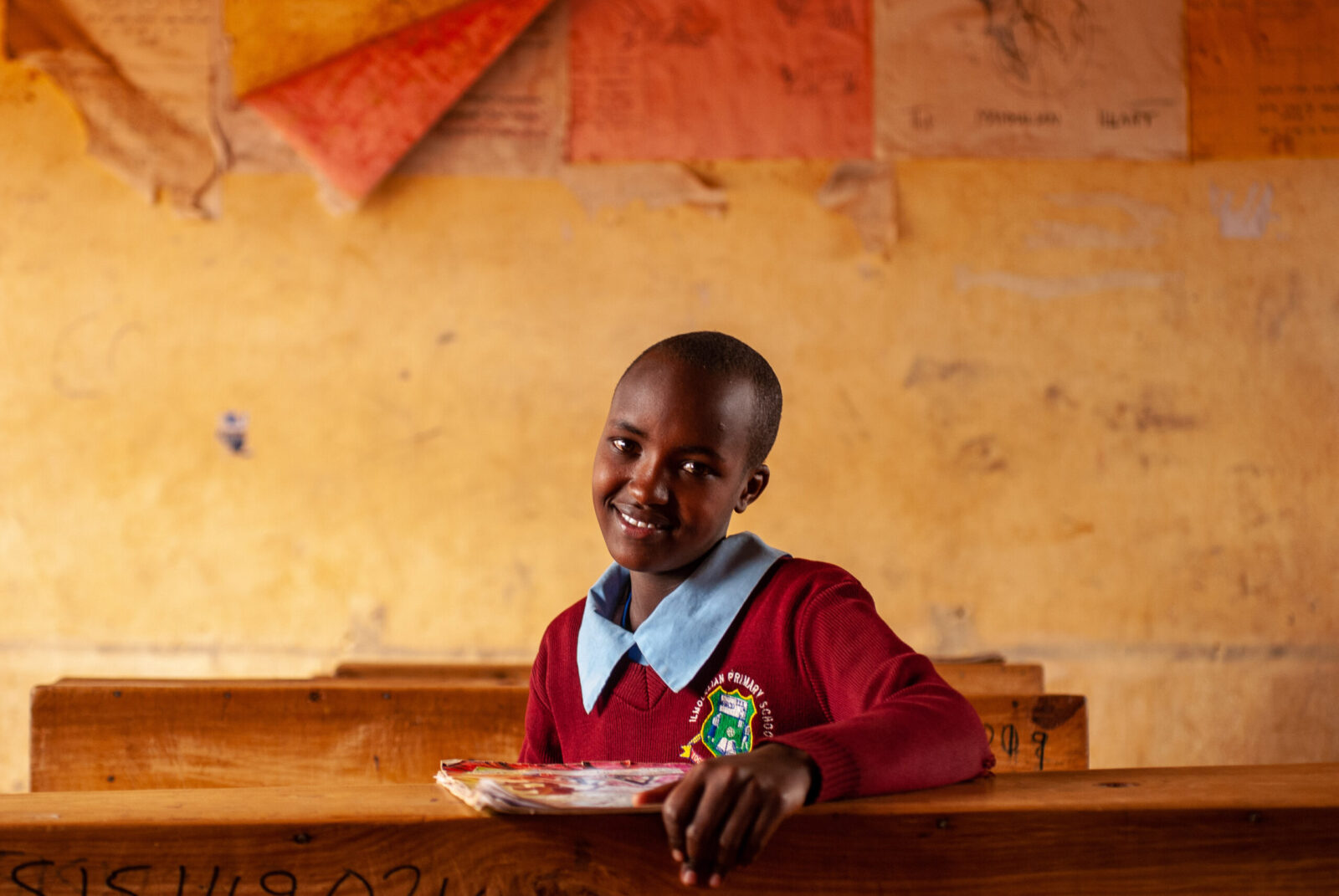

We have offices in
5
countries
Total income from fundraising
€5,831,845
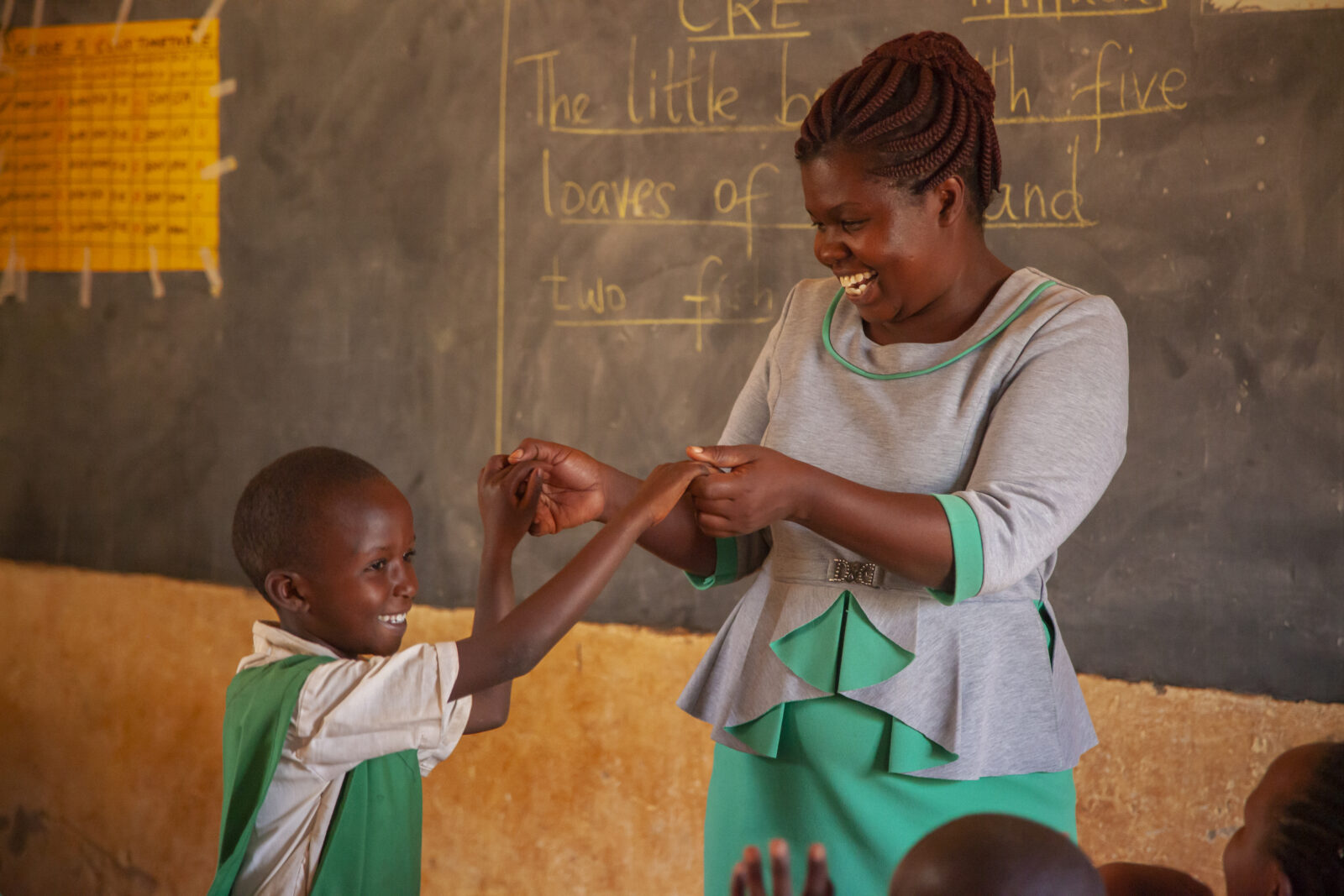

We received support from
44,182
individual donors
Total spending:
€5,798,656
On objectives
€4,312,046
On fundraising
€1,023,257
Management and administration expenses
€463,353

We established long term relationships and
strategic partnerships
with national and global partners such as UNHCR, UNICEF, The Chocolonely Foundation, Dutch Postcode Lottery and AFAS.
We are a
member
of numerous global and national networks: Goede Doelen Nederland, GCE, Philae, Partos, PerspActive, KROS, INGO networks, Federation for Ugandan Employers, NUTIP.
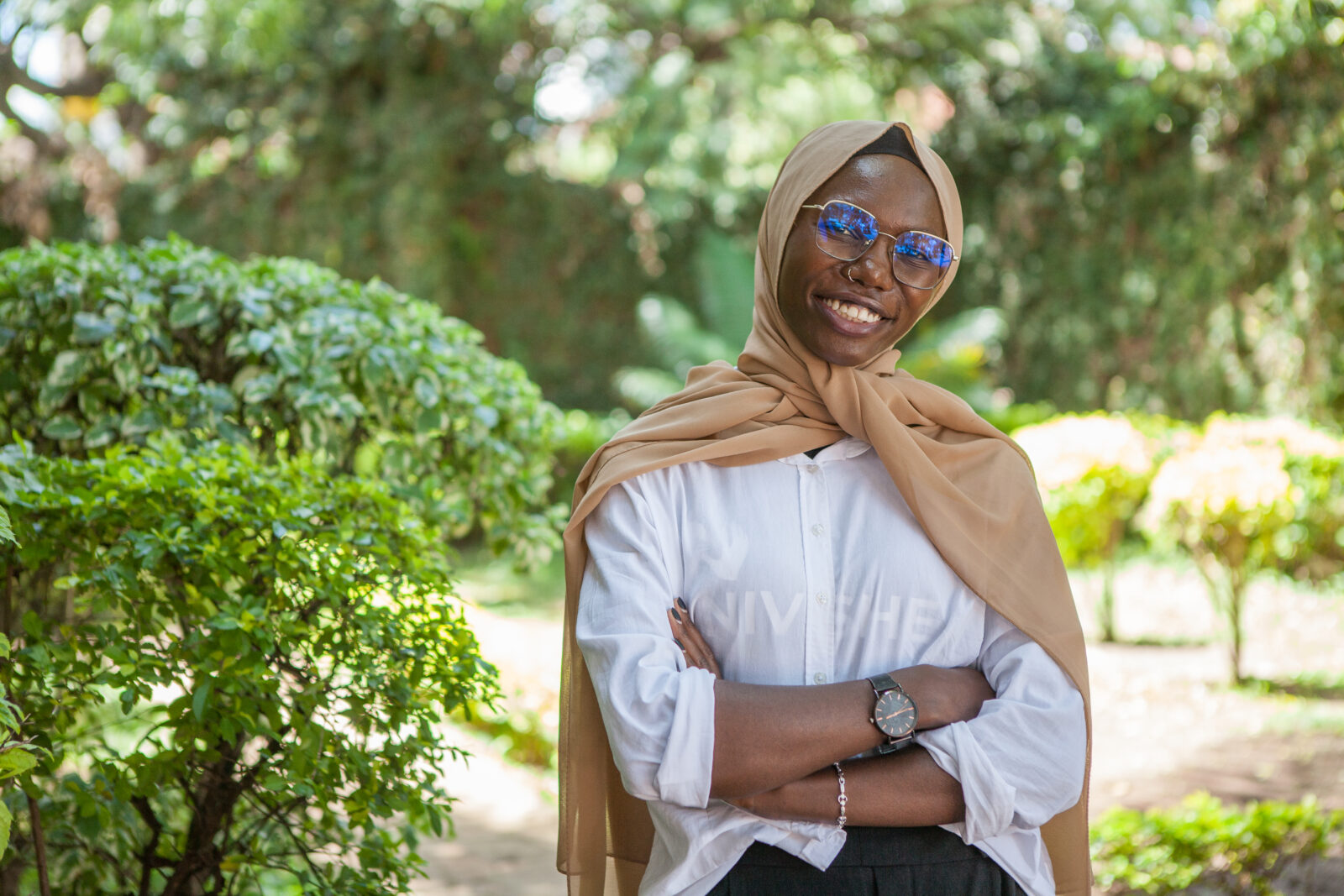

We have joined
consortiums
for funding and programme development.
Visualisation of our work:
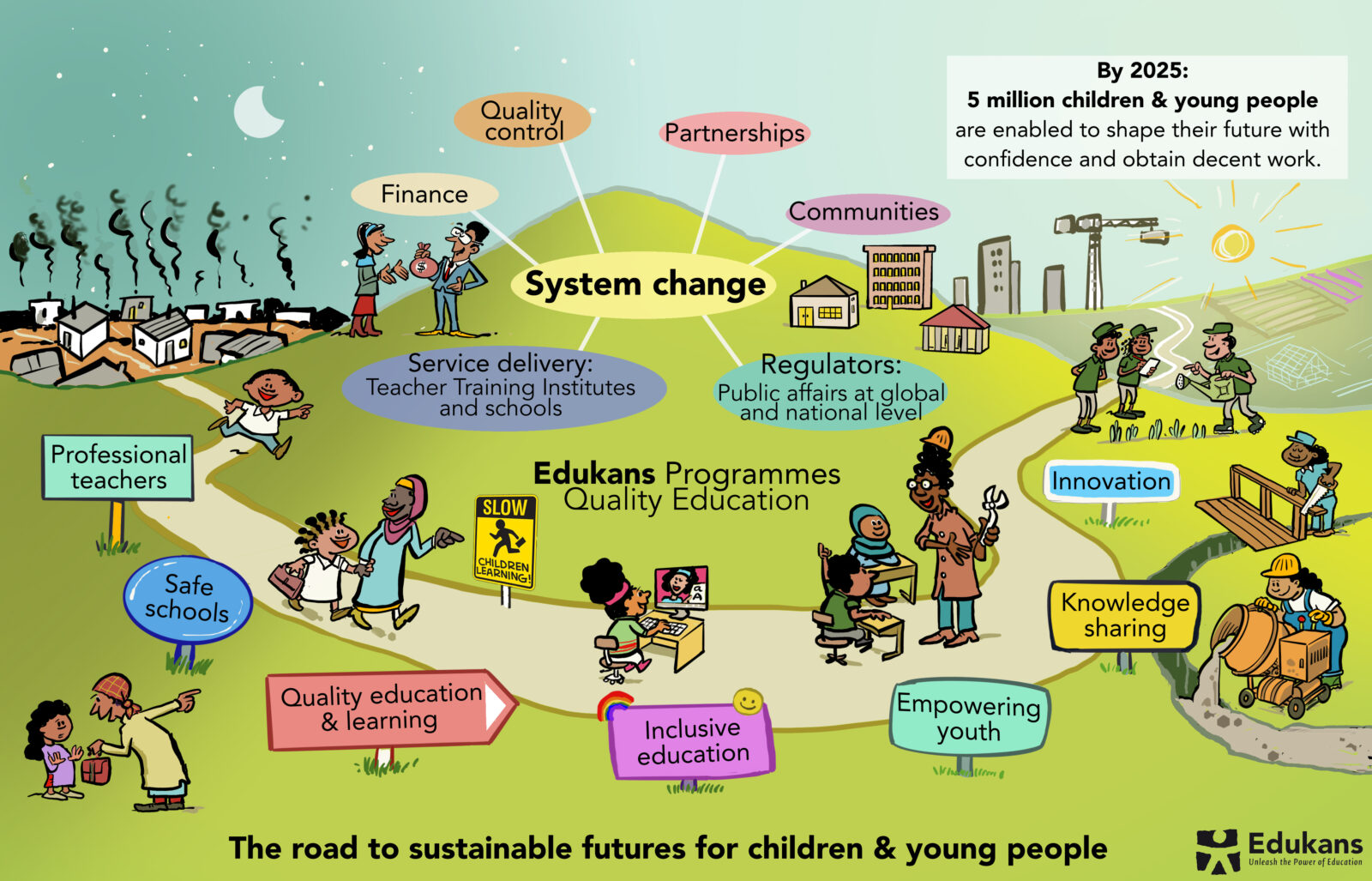
Conclusion
In 2024, Edukans achieved strong results, directly reaching over 334,000 children and youth and training more than 10,000 teachers. As national governments increasingly adopt our methods, our indirect impact continues to grow. This shift marks a transition to larger, collaborative programs – such as the Befit literacy initiative in Malawi (targeting nearly 3 million children) and a nationwide teacher training program in Uganda (reaching over 35,000 teachers). Although some projects take longer to launch, they lay the groundwork for sustainable, system-level change. Through these efforts we will deliver meaningful, long-term results. With every step we take, we remain committed to ensuring sustainable impact and creating a brighter future for the children, young people, and teachers we serve.
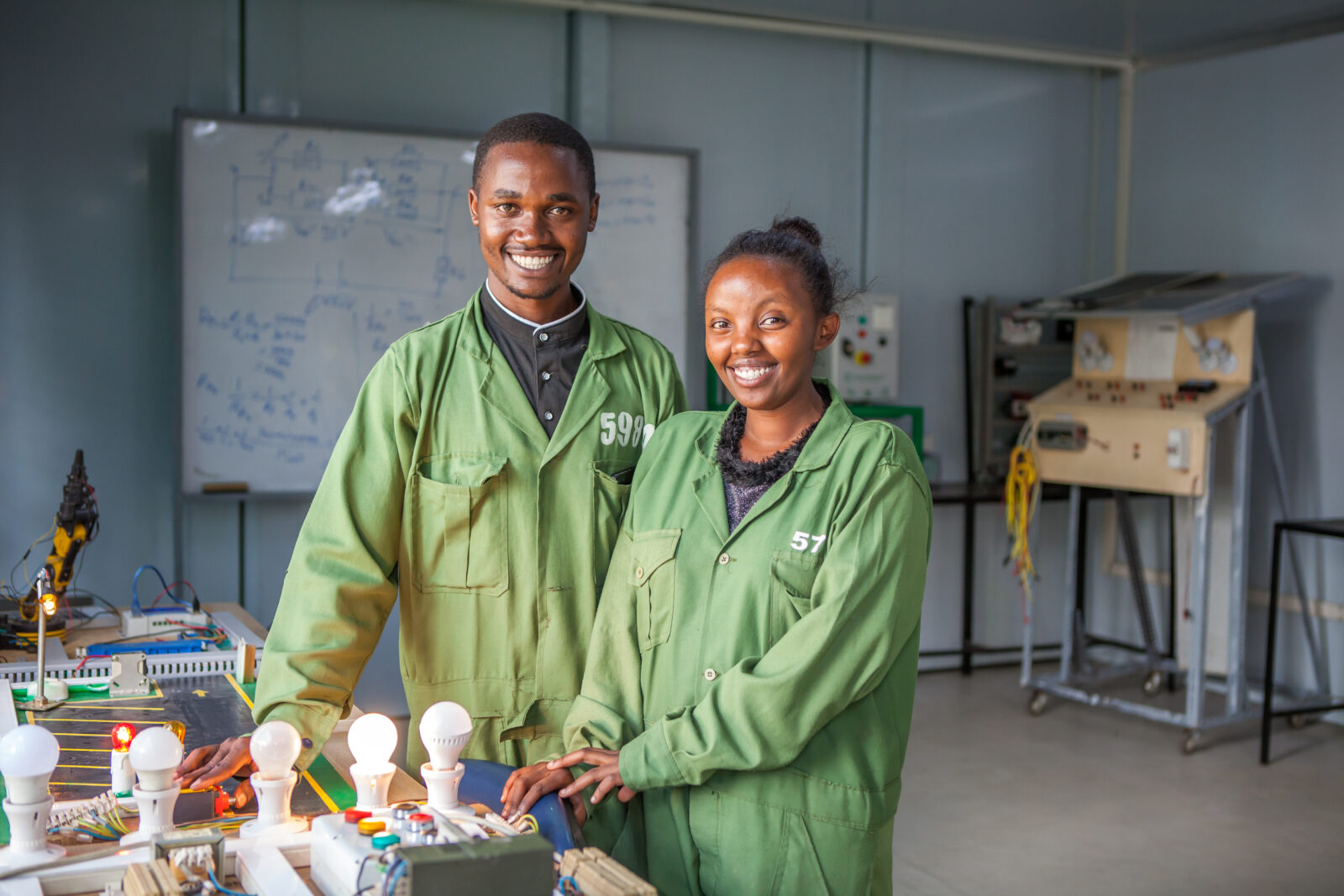
Which projects defined 2024?
Navigate to
3. Highlights of the year

3. Highlights of the year

Project highlight Basic Education
Building Education Foundation Through Innovation and Technology (BEFIT) in Malawi
In 2024, Edukans Malawi launched the BEFIT programme to improve the quality of basic education through innovative, tablet-based learning for children in Standards 1–4 (the first four years of primary school). The interactive software strengthens literacy and numeracy skills by offering engaging, level-based tasks that support and complement teachers’ efforts. The software is in the local language of Chichewa and supplements existing teacher-led instruction.
Edukans is responsible for the daily implementation of the programme in 83 public primary schools across three districts: Zomba Rural, Mangochi, and Machinga. Learners use tablets for around one hour per day, increasing their “time on task” and learning outcomes.
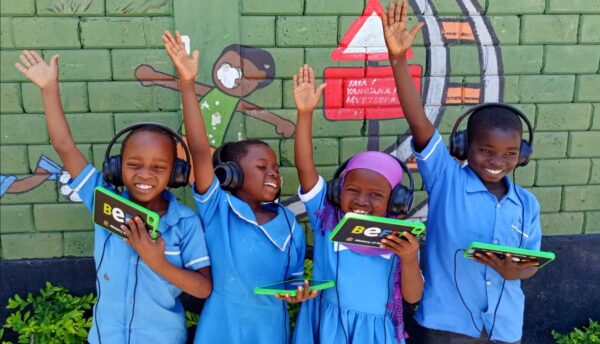
“The more time a learner interacts with the tablet, the more learning takes place. The digital teacher guides the learner, while the classroom teacher supports the process.”
- Thomas Kanjodo, Education Projects Coordinator and Team Lead, Malawi
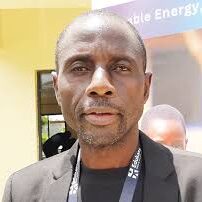
The BEFIT programme focusses on three core objectives:
- Strengthening teachers’ digital teaching skills
- Improving access to quality learning materials
- Encouraging parental and community involvement
The programme follows a holistic approach, combining teacher training, digital content, and local stakeholder engagement for sustainable impact.
Implementation & Partnerships
BEFIT is a government-led initiative from Malawi’s Ministry of Education, supported by a consortium including Imagine Worldwide, One Billion, VSO, Edukans, and others. Edukans contributes to local implementation, capacity building, and community engagement.
The programme is aligned with the national curriculum, utilises existing government systems and is integrated into school timetables for long-term sustainability.
The BEFIT programme focusses on three core objectives:
- Strengthening teachers’ digital teaching skills
- Improving access to quality learning materials
- Encouraging parental and community involvement
The programme follows a holistic approach, combining teacher training, digital content, and local stakeholder engagement for sustainable impact.
Implementation & Partnerships
BEFIT is a government-led initiative from Malawi’s Ministry of Education, supported by a consortium including Imagine Worldwide, One Billion, VSO, Edukans, and others. Edukans contributes to local implementation, capacity building, and community engagement.
The programme is aligned with the national curriculum, utilises existing government systems and is integrated into school timetables for long-term sustainability.
Approach Basic Education
Monitoring the quality of education and digitalisation with the EDU Q-card assessment tool
As Edukans we work together with local governments, educational institutes, and teachers on the best possible education. We strive to create an optimal learning environment by supporting teachers in enhancing their pedagogical skills, assisting school management, and involving parents and the wider community.

The EDU Q-card is proving highly effective when working towards this mission. It is a web-based instrument designed to assess the quality of education. Its primary objective is to enable head teachers, SMCs/PTAs, and inspectors to easily monitor the quality of education in schools and take actions to address areas that require improvement.
Using the EDU-Q card motivates school administrators to create school improvement plans based on a combination of the instrument’s outcomes and the specific priorities and resources of each school. The tool is designed to facilitate dialogue between school staff and external experts, ultimately fostering an ongoing commitment to enhancing education quality.
To date, the digital tool has approximately 650 direct users who have user rights to enter data on the platform. Beyond these direct users, our broader engagement encompasses teachers, community members and others involved in the dialogue and making school improvement plans. These individuals, integral to utilising the system, bring our estimated total of direct users to around 7,800 when applying a conservative multiplication factor. This expanded reach covers all seven countries where the application has been piloted over the past few years: Ethiopia, Ghana, India, Kenya, Malawi, Surinam, and Uganda. Additionally, over 400 schools have worked with the tool and/or are still using it, demonstrating widespread adoption and impact.
Project highlight Basic Education
Young people in rural Ghana catching up on education
In 2023, Edukans and Savana Signatures launched the two-year project ‘Rural Youth in Ghana Catching Up on Education’, funded by the Chocolonely Foundation. The project aims to improve teaching quality and parental engagement in fifteen school communities in the Asetenapa cooperative, Eastern Region. The goal is to help 2,608 children stay in school, improve their learning outcomes, and complete their education.
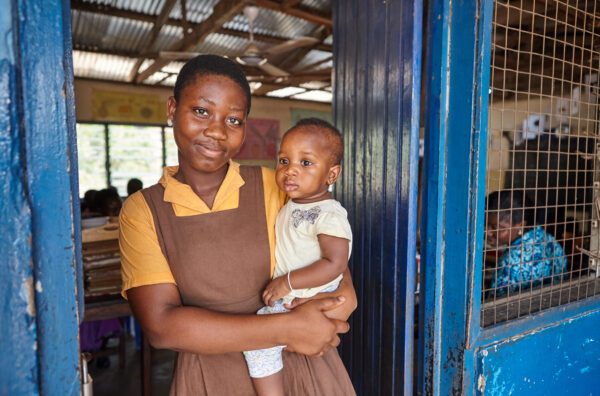
In cocoa-growing rural areas, many children struggle with basic skills – only 30% of adolescents aged 10–14 reach grade 3 reading levels, with even lower rates in numeracy. Girls face additional barriers such as early pregnancy and child marriage, leading to school dropout.
The project integrates three key components: Teaching with Impact, Social and Emotional Learning (SEL), and Reproductive Health Education (RHE). A total of 4,500 students benefit from improved teaching and receive lessons in SEL and RHE. The target group includes 15 schools, 1 college of education, 89 teachers, School Improvement Support Officers (SISOs), and school leaders.
In 2024, the focus shifted to increasing community involvement to reinforce the project’s educational impact. Key achievements include:
- Organising refresher trainings for teachers on Teaching with Impact, SEL, and RHE.
- Providing coaching, review sessions, and experience-sharing for 82 teachers and 15 school managers via virtual platforms and school visits.
- Engaging 150 parents in discussions on children’s rights, education policy, and preventing child marriage.
- Facilitating community dialogues in 13 villages to address challenges and promote SEL and child protection.
The project strengthens education and builds supportive communities for long-term positive outcomes.
Project Highlight Skills for Work and Life
Wear the Green Future: ‘From fast fashion to sustainable futures’
The Wear the Green Future (WtGF) project, led by Edukans in Kenya and Ethiopia and supported by the Postcode Lottery, aims to empower young people engaged in fair fashion with the skills needed to drive sustainability and circularity in the textile industry. By partnering with TVETs (Technical and Vocational Education and Training institutions), the project enhances the knowledge and expertise of trainers around green skills and sustainability. Simultaneously, it supports companies in building their capacity for waste management and circular practices, contributing to sustainable job creation and climate change mitigation.
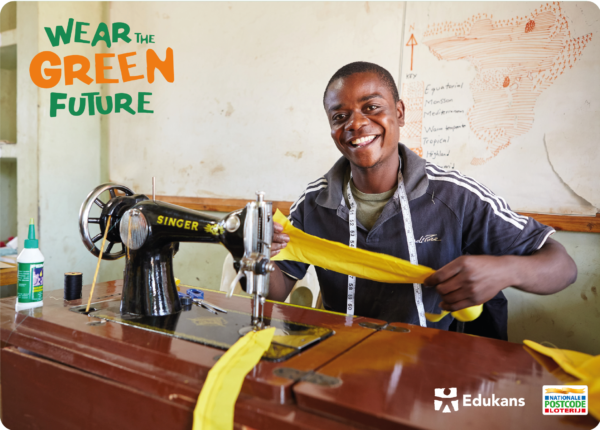
To create lasting impact, WtGF focuses on systemic change through collaboration with young people, TVETs, the private sector, and governments. The goal is to reduce waste, water pollution, and CO₂ emissions across the textile industry and promote economically viable practices for future generations.
The project was successfully launched in both Kenya and Ethiopia, with strong participation from government officials, education institutions, industry, and youth. Stakeholders expressed enthusiasm and a shared commitment to making the project’s vision a reality.
“Finding well-trained staff is a real challenge for our 1,000-employee factory. Training new hires ourselves is costly and time-consuming. A vocational curriculum that matches our sustainability goals would help greatly. That’s why we’re excited about the Wear the Green Future project and eager to participate as a partner.”
- Jeylan, Human Resource Manager at Riders Else Addis Industrial Development PLC, Ethiopia
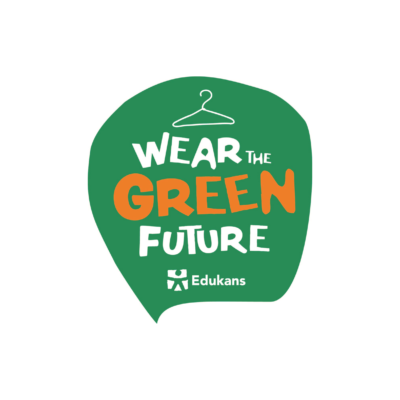
Key achievements in 2024 include labour market assessments, analysis of the TVET and fashion sectors, and the development of green skills training modules. These will be implemented in the coming phase. The project also raised awareness of sustainability and circularity among TVETs, MSMEs, government ministries, and industry actors.
Key achievements in 2024 include labour market assessments, analysis of the TVET and fashion sectors, and the development of green skills training modules. These will be implemented in the coming phase. The project also raised awareness of sustainability and circularity among TVETs, MSMEs, government ministries, and industry actors.
“A market analysis identified green skills gaps and opportunities, and our expertise was recognised by the Ministry of Trade, Investment and Industry, who invited us to contribute to the development of the Cotton, Textile and Apparel Policy – aimed at strengthening the broader system.”
- Mary Mugo, Country Director Edukans Kenya
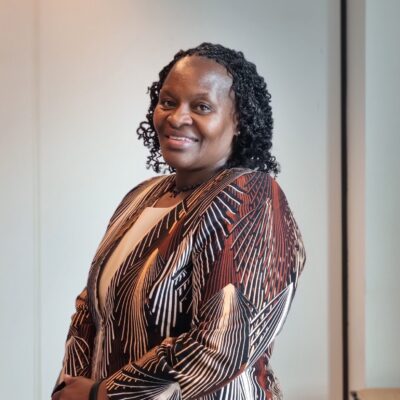
Project Highlight Skills for Work and Life
Yumbe Gamechangers: enhancing the employability of young refugees in Uganda
Yumbe Gamechangers: ‘From skills to employability’ aims to deliver demand-driven skills trainings to enhance the employability of 400 young refugees and host community members in the Bidi Bidi refugee settlement. Bidi Bidi is located in Yumbe District in the West Nile sub-Region in Uganda.
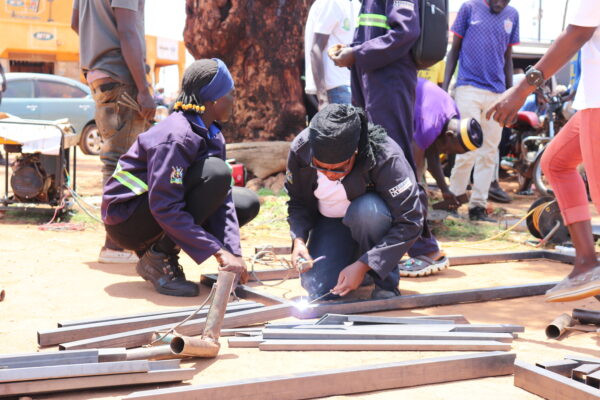
Access to skills training in Bidi Bidi is considered to be one of the main ways to improve these young people’s livelihood prospects, focusing on trades such as mechanics, agriculture and welding. In addition to this, skills development is key to support integration within local communities. The project builds on existing partnerships with the private sector when providing skills training. The trainings were conducted in line with the Ugandan Government’s TVET policy and will be assessed and certified by the DIT.
The specific objectives of the project were:
- 400 (280 refugees and 120 host community) young people (>50% women) will improve their livelihoods and earn decent incomes from (self-)employment as the result of having acquired skills demanded by the local labour market.
- The capacities of the TVET providers and 50 private sector actors will be strengthened and expanded, providing meaningful placements and making skills more labour-market relevant.
Key achievements
- 73% of the 400 young people trained are earning income from their enterprises, including 55 mothers with babies.
- 386 young people completed their skills training, comprising 65% refugees and 35% host community members.
- The TVET programme integrated entrepreneurial and life skills, achieving 69.2% success at endline.
- 19 TVET teachers improved their skills in integrating CBET (Competency-based Education and Training).
The project was successful in providing young people with skills that would increase their employability and strengthened the capacities of the TVET provider and private sector actors, leading to meaningful placements.
Young people who completed the training were grouped together and provided with start-up kits. During the set-up of their own business, they were coached by various mentors from the private sector.
Project Highlight Skills for Work and Life
Equipping 9,000 young Kenyans with up-to-date skills for better chances in the labour market
Kenya, like many other African countries, has a high youth unemployment rate; 67% of young people (aged between 15 and 34) are unemployed. Every year around a million young people are added to this statistic. With support from AFAS Foundation, Edukans and the KCCB (Kenyan Confederation of Catholic Bishops), started a three-year project to improve vocational training in 30 TVETs. The project focusses on improving the quality and relevance of education by, for example, training trainers and improving the management of TVET institutes. The quality of the courses is continually enhanced with the addition of practical skills, life skills, entrepreneurial skills, and digital skills. In this way, young people learn a variety of different skillsets allowing them to build a personal and professional profile and leaving them better equipped to find a job on the labour market after graduation.

During the implementation of this project, we also invest in forging relationships between the TVETs and the local business community. Our aim is to facilitate internships, which in turn enable young people to gain more practical skills, and also the involvement of those businesses in the operations of the TVET institutes. An added advantage is that students also gain experience in other soft skills such as communication and time management, etcetera.
“It is very important to invest in training young people, so that they acquire the skills necessary to meet labour market demands. Vocational education plays a crucial role in giving them a chance at a good job. I am proud that with this programme we can contribute to creating opportunities for young people. By working to reduce youth unemployment, we support young people and their families to build a stable future.”
- Gerben Eversdijk, director of AFAS Foundation
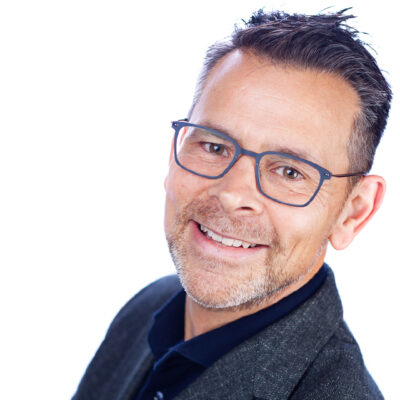
Start-up kits
As an addition to this project, young people are equipped with start-up kits allowing them to start their own entrepreneurial journey. These young people will not only receive equipment, but also additional training and mentorship from people in the industry.
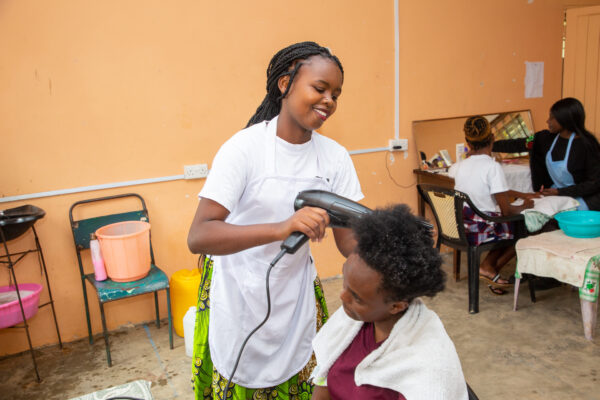
Achieved major outcomes
In the second year of the three-year collaboration, the majority of activities were focussed on training TVET trainers and management of TVETs including leadership training, entrepreneurship, life skills and Work Based Learning and Labour Market Assessment. We have worked with the Kenya School of TVET on the improvement of the trainers’ skills. Throughout the project the various modules have been updated and contextualised. After training trainers, the project has followed up making sure that the TVET trainers share and practice the knowledge they have obtained.
“It is captivating to work on challenging projects that seek to address the unemployment problem in our society. I have seen positive impact on lives and livelihoods of young people, and I hope that there will be more opportunity to scale up Edukans programmes to reach more young people.”
- Lindah Cherop, skills-expert Edukans Kenya
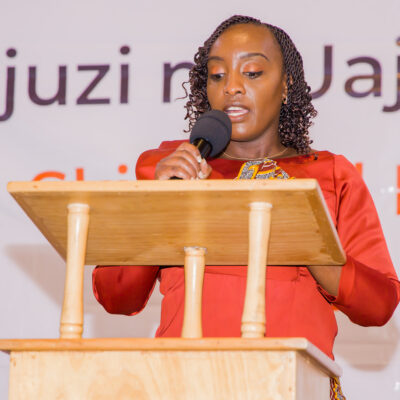
Project highlight Education in Emergencies
Clean water keeps children in Samburu, Kenya in school
Edukans supports a project in Kenya, under the name: “Enhancing Inclusive Quality Education in Samburu”. The pastoralist area of the Samburu is known to experience prolonged drought, communal conflict, forced early marriages for girls, and cattle rustling. The project addresses: (1) enhancing the wellbeing of learners and teachers in a volatile context, (2) promoting access to education for children faced with extreme adversity, and (3) improving the quality of education.
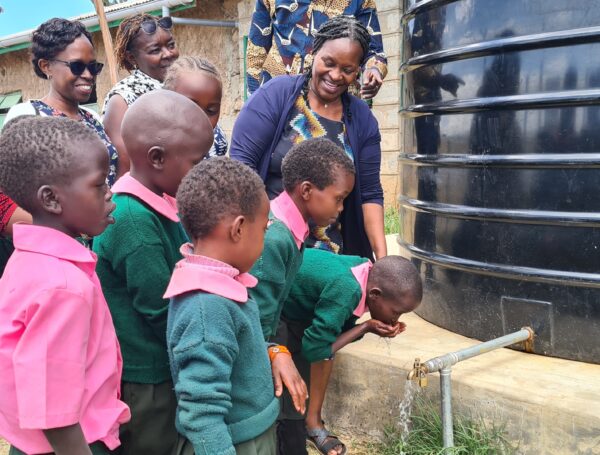
Achieved major results:
- Edukans has provided six schools in Samburu with water harvesting gutters, water tanks, and pipes. School children now have access to safe drinking water and hand washing and the school kitchens are using the water to prepare school meals.
- Schools harvested food (vegetables, beans and maize) from their kitchen gardens, which has improved nutrition for learners.
- Training was delivered to teachers by the Edukans master trainers. (e.g. instructors from the teacher training colleges) about Social and Emotional Learning (SEL), Mental Health, Active Teaching and Learning (ATL) and how to use erasable notebooks in the classroom.
- 8,659 primary school students (4,256 boys and 4,403 girls) benefitted from the project
- Erasable notebooks were distributed and are currently used in all classrooms
- An advocacy event was organised by Edukans Kenya, bringing together the key stakeholders of the project such as government officials, political and religious leaders, community and parents, SHERP (our partner working on inclusion), UNESCO, and other education partners.
“With access to clean water, students can now safely wash their hands and drink safely. The availability of water has led to improved retention rates and better academic performance. Learners no longer need to leave school to fetch water, allowing them to stay longer and focus on their studies. Since the start of the project, learning outcomes have increased.”
- Solai, school director of Naiborkeju school in Samburu
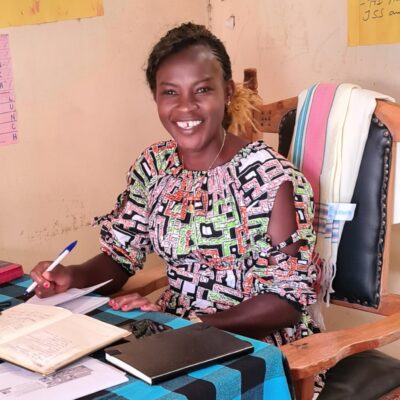
Project Highlight Education in Emergencies
School Greening in Ethiopia
In northern Ethiopia (Afar region) three schools which are close to the river are taking part in this project. The first step of the project is always the fencing of the school, to avoid cows and goats from entering the school compound and eating the new plants. The second step is land clearance, preparation and planting of vegetables and trees (a job for students, teachers and parents). Finally, the school greening initiative is linked to what is happening inside the classroom (curriculum) and the profit the community makes from the school garden. Parents create their own gardens after receiving seeds from the school. Next year it should be measurable how much surplus is made in terms of extra income.
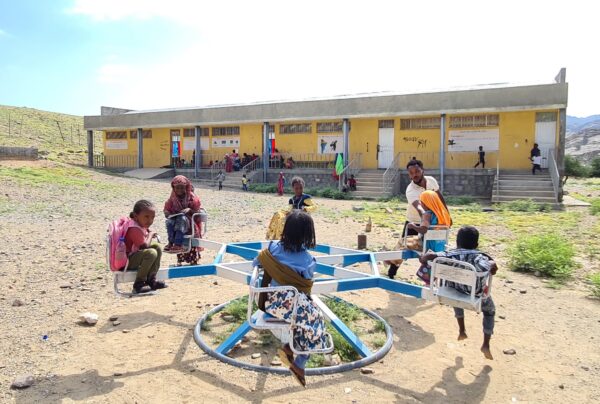
“Since the school is fenced, I can send my daughter to a safe school. We started greening the school compound. This is a shared responsibility.”
- Gubi Humed Mohammed, Parent Teacher Association member Berga school, Afar
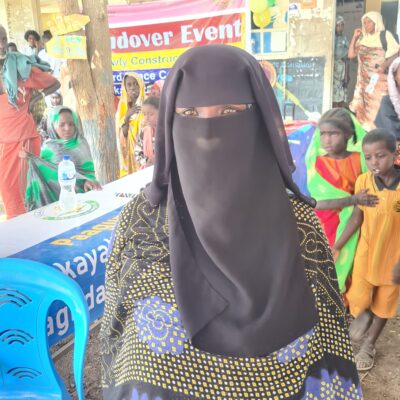
Achieved major results:
- A wall was constructed around Arado and Berga school, and a fence around the compound in the Refugee camp school to keep unwanted visitors out. Without a barrier, cows and goats roam around the school, eating the newly planted vegetables and trees.
- Edukans Ethiopia produced a training manual and trained instructors at the college for teachers’ education (School greening, Gardening and Climate Change sensitive education). The instructors trained teachers. The manual is now used in their classrooms.
- Cotton and other plants are used as teaching aid: as concrete learning material in the classroom.
- With support from an agriculture expert, water is linked to the school by channels and pumped from the river if necessary.
- 2,566 students (of which 1,123 girls) learned about climate change and environmental protection, in the classroom and outside in the garden. Students bring gardening skills to their homes.
- Parents with a plot of land created their own garden at home, after collecting suitable vegetable seeds and fruit trees from the school. They organised tree-planting campaigns, developed eco-friendly gardens, and implemented waste management practices.
- The school income from fruits, vegetables, and grass is used to pay the salary of the cleaner and the school meals programme.
“Earlier this year we harvested tomatoes, onions, cabbage and salad. We are so happy with our school. This green environment is much better for us. The sun shines, but it is not so hot as before. Since the fence was constructed, animals no longer eat our small vegetables and mango trees. We also learned to take care of the garden. We water the plants and the trees and help the teacher to sell out the products. Look around you, and you understand why we are happy.”
- Fatima Abdu, student at Arado school
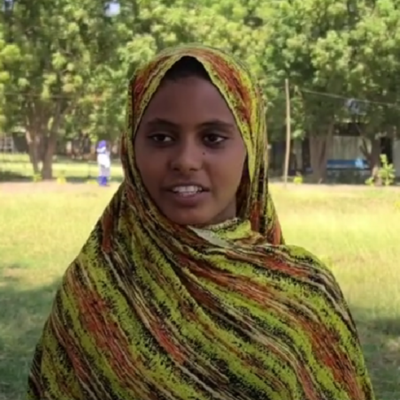
Project Highlight Exchange
Tackling the learning crisis: World Teacher 2024 in Kenya
A project highlight for Exchange was the World Teacher 2024 edition in Kenya, held across Elgeyo Marakwet and Kajiado Counties. Led by four World Teachers, the programme focused on enhancing pedagogical skills through “Teaching with Impact” workshops, peer coaching, and leadership training for teachers in 29 schools. The workshops provided a space for exchanging feedback, practicing active learning techniques, and sharing best practices and strategies for enhancing school management. This edition directly impacted 6,320 learners and 244 teachers, boosting teacher motivation, student-teacher relationships, and parental engagement.

Recognising its significance, officers from the Ministry of Education and the Teachers Service Commission have embraced the programme. Moving forward, Edukans is dedicated to advancing the World Teacher program to facilitate learning and knowledge exchange. By fostering teacher collaboration, the programme is committed to addressing the learning crisis and shaping the future of education.
Moving forward, Edukans will continue the international knowledge exchange between educators with a clear focus on educational excellence and leadership. This exchange will address the learning crises and help shaping the future of education in the countries we work with.
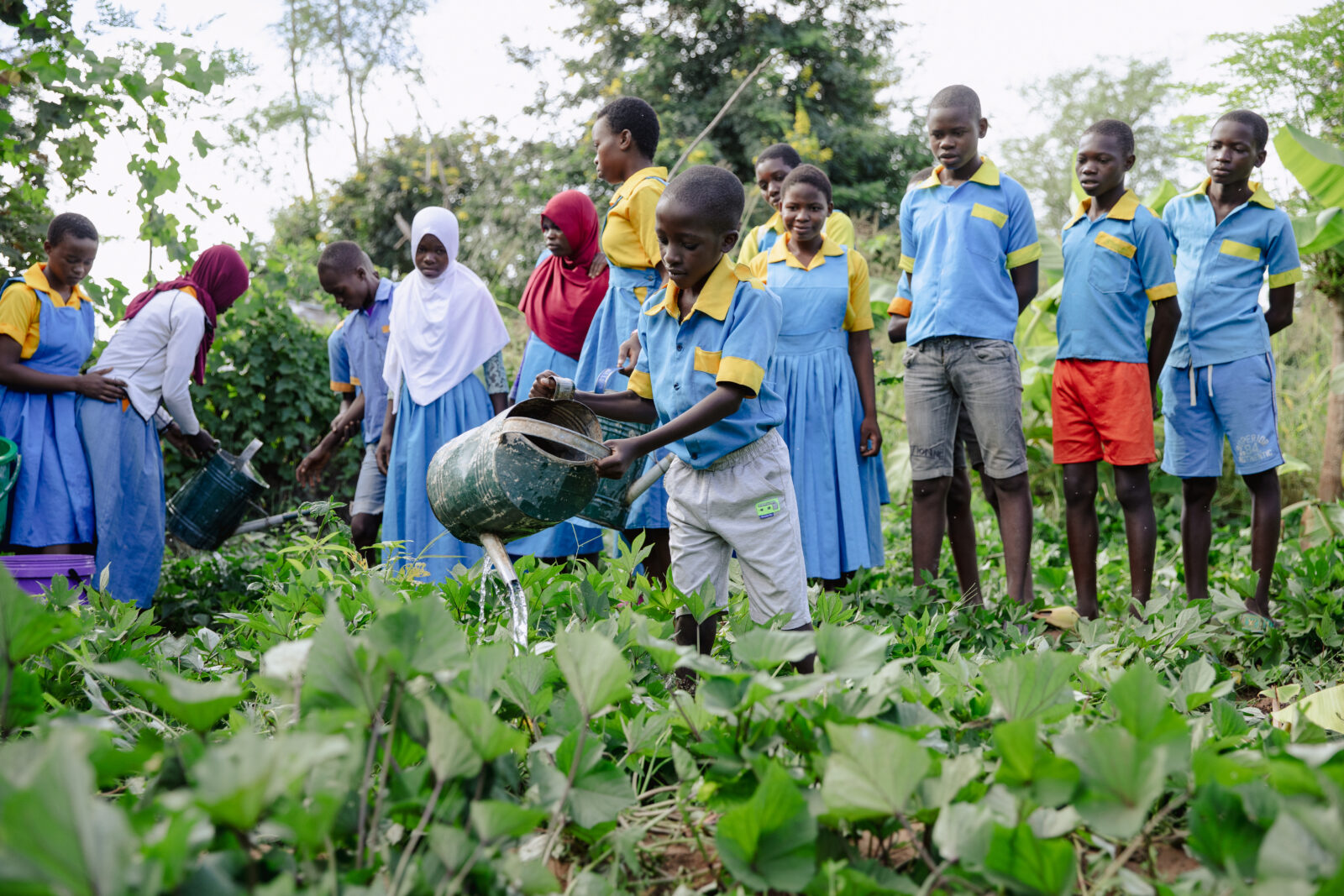
How did Edukans raise funds last year?
4. Our supporters and partners

4. Our supporters and partners

As in the former years, also in 2024, we were fortunate to receive warm support from foundations, corporations, individual donors, schools, churches, and our dedicated ambassadors. Each of these supporters recognises that quality education is the key to a sustainable future for children and young people in the countries where we work. Sofie van den Enk, one of our ambassadors, put it beautifully:
“Education is the equality motor of our world; everyone profits from that.”
- Sofie van den Enk, Edukans ambassador
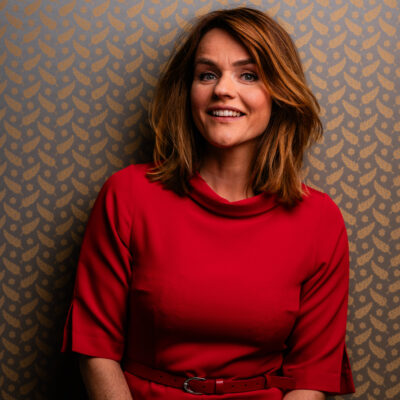
Thanks to this support, we raised €5,831,845, enabling 334,294 children and young people to embrace their right to education and confidently shape their futures.
The year 2024 also marked a period of rapid change. Political shifts and significant subsidy cuts in the NGO sector have influenced the fundraising landscape, intensifying competition among donors, corporates, and foundations. Edukans has responded to these challenges by strengthening existing relationships, deepening our understanding of our audiences, and staying agile in a fast-evolving environment. Innovation, adaptability, and maintaining a fun and impactful approach remain at the heart of our mission.
This year, we worked diligently to develop a forward-thinking Engagement & Fundraising strategy, placing a strong emphasis on data-driven and client-centred approaches. We also continued to build strategic partnerships with corporates, foundations, and knowledge institutes, recognising the growing potential of international fundraising. One shining example of our global collaboration is the Wear the Green Future project, which showcases the power of teamwork across borders. This flagship initiative not only inspires our colleagues but also external partners, making it a true co-creation success.
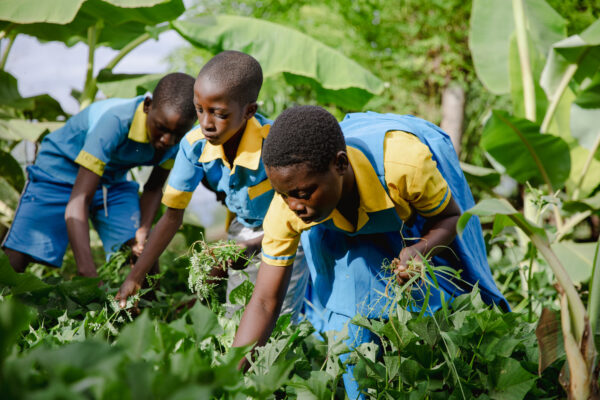
The importance of green education became a central theme in our campaigns, including ‘The Greenies’ and Green Wish campaigns, which resonated deeply with a broad audience. Our enhanced social media presence played a key role in amplifying these messages, getting strong support from a growing community of followers.
In the sections below, you will find more details about our donors, partners, activities, and the outcomes we have achieved together. If you have any questions, we invite you to reach out to our Engagement & Fundraising team at info@edukans.nl. We will be happy to respond personally.
Thank you for being part of our transformative journey to unleash the power of education.
4.1 Sources of income
Sources of income
Private donors
In 2024 we received €2,968,034 from our private donors, an increase of €84,592 compared to 2023. Structural support was provided by 62% of our 44,182 private donors and we welcomed 2,886 new structural donors, mostly due to a successful year of recruiting new donors via face-to-face acquisition. We have seen an increase of 17.9% in income from monthly donors who started supporting us after face-to-face acquisition.
“There are many people in the world who face real challenges. I’m fortunate, and I’m glad to contribute where I can. That’s why I became an Edukans donor. Education is so important – not just for learning to read and write, but for learning about others, playing with peers, and building a second family. When I saw a video from Edukans showing children learning how to plant trees, I thought: ‘Wow!’ I love nature – being outdoors, surrounded by green. We shouldn’t be cutting down life, we should be helping it grow.”
- Edukans supporter Samsam Salah
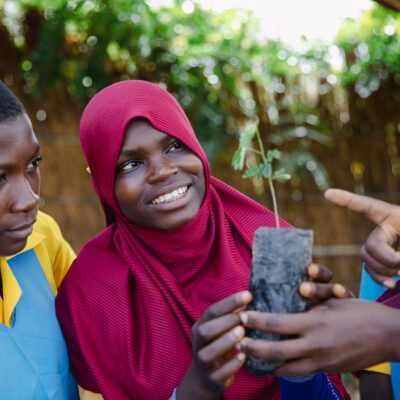
“I support an organisation like Edukans because you inspire people to learn. Not only do children get better opportunities, teachers also develop themselves because they are equipped with the competencies to teach better.”
- Edukans supporter Rachel Heijkoop
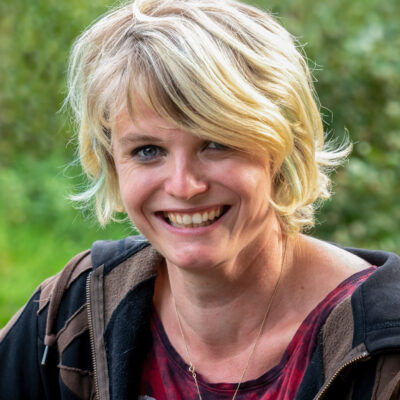
Trust funds
Last year 59 foundations supported Edukans with generous contributions amounting to €840,893. Some trust funds have been supporting our work for many years for example, ASML Foundation who has supported us before, contributed again in 2024 to further expand and validate our approach to climate education and green schools with the Green Start Heroes project. Although the ASML Foundation is closing, we are delighted that ASML remains committed to the mission of improving lives through inclusive and quality education.
Another trusted partner for many years is the AFAS Foundation. Their contribution has enabled us to train 9,000 young people in Kenya, equipping them with professional and personal skills tailored to labour market demands, enabling them to secure employment or start their own businesses. In October, we were honoured to present this programme at the annual AFAS partner event.
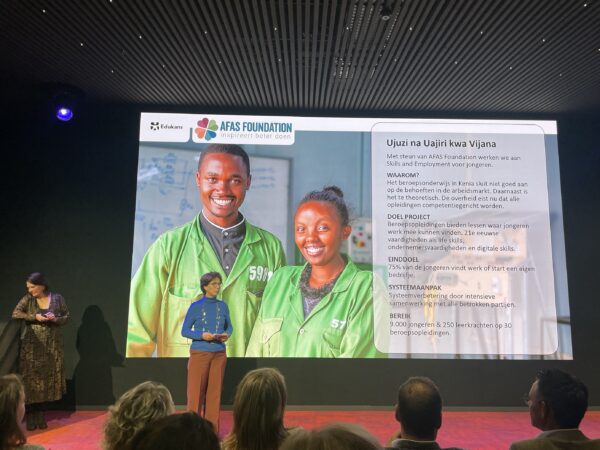
The video below showcases the programme funded by the AFAS Foundation: the training of teachers and school directors, highlighting the positive impact of qualitative vocational education in their schools.
With the support of partners such as CCHO, we expanded the AFAS-project by providing start-up kits with essential tools to some of the young participants who want to start their own businesses. The tools give them the opportunity to execute their business plans and realise their dreams.
In 2024, Edukans also partnered with The Chocolonely Foundation to improve the quality of education and the prospects for girls in rural cocoa-producing communities in Ghana. Thousands of children benefit from empowered teachers who were trained in Active Teaching and Learning methodologies and from strengthened parental and community involvement.
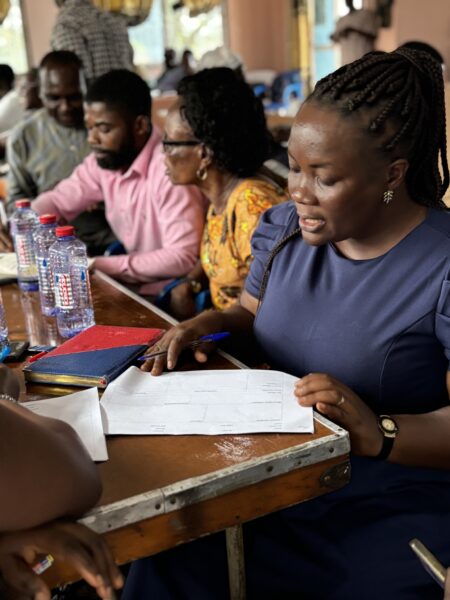
After several years of supporting emergency education in Ethiopia, this year Dioraphte choose to support a validation and research project on ‘Active Teaching and Learning,’ one of Edukans’ core programmes. This project will be carried out in 2025 in both the Netherlands and Kenya in collaboration with knowledge partners from both countries.
Dutch Postcode Lottery (Nationale Postcode Loterij)
Since 2015, Edukans has been a proud partner of the Dutch Postcode Lottery, a collaboration that has unlocked opportunities for thousands of children, young people, and teachers in the countries we work in. Thanks to the lottery’s players, those children, young people, and teachers have been impacted with quality education, empowering them to shape their futures with confidence.
In 2024, Edukans received an annual contribution of €500,000 from the Postcode Lottery. This vital, unearmarked funding gives us the opportunity to invest sustainably in empowering schools and the education system in the countries we work in.
“It’s imperative that children and youth have access to quality education enabling them to shape their future with confidence.”
- Marieke Rodenhuis, Head of Charities Dutch Postcode Lottery
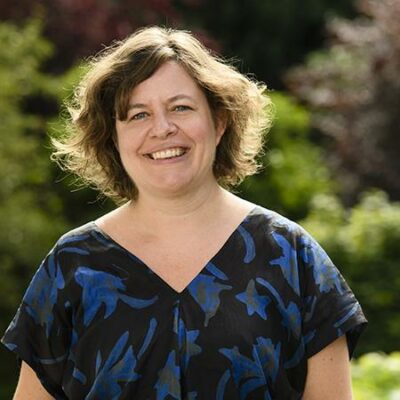
Besides the annual contribution, the Dutch Postcode Lottery also awarded funds to our daring project, Wear the Green Future, enabling a long-held dream for Edukans to place education at the heart of a circular, green, and futureproof economy in Kenya and Ethiopia.
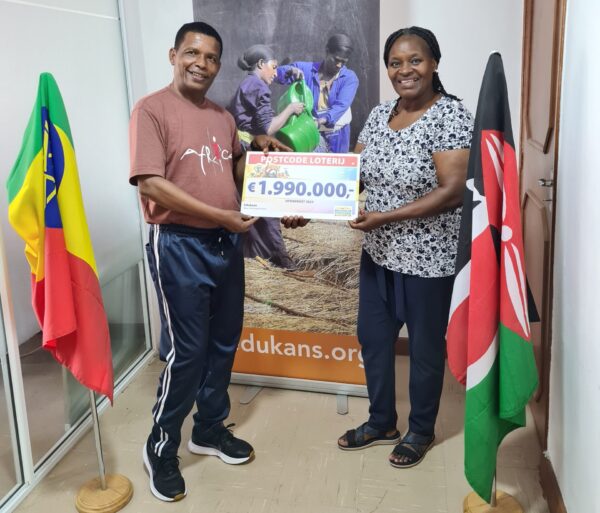
Besides the annual contribution, the Dutch Postcode Lottery also awarded funds to our daring project, Wear the Green Future, enabling a long-held dream for Edukans to place education at the heart of a circular, green, and futureproof economy in Kenya and Ethiopia.

“We are very grateful for this fantastic contribution from the Postcode Lottery. With Wear the Green Future we are empowering young people to create sustainable and innovative solutions for a more sustainable fashion and textile industry in Kenya and Ethiopia. This investment allows Edukans to further work on our climate education ambition, equipping young people with the skills and knowledge needed to work in sustainable industries while contributing to a more green and circular economy. Together, with the support of the Postcode Lottery and its players, we are working towards a greener and more just world.”
- Petra van Haren, Director of Edukans
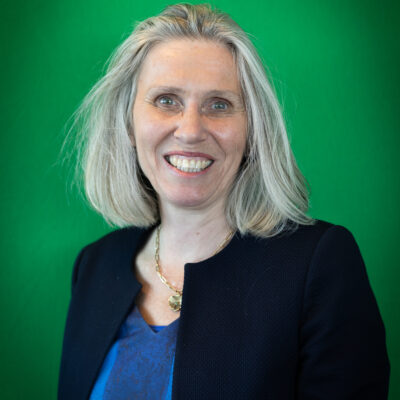
Companies
Support from the private sector plays a vital role in enabling Edukans to carry out its mission effectively. In 2024, our work was supported by 168 companies contributing €159,539 to Edukans. Their motivation and commitment to create opportunities for children and young people through supporting Edukans maximises our impact.
We are especially proud of our long-term partnerships with Noordhoff, LabBuddy, SucceedIT and ScoliX. In addition to financial support, these companies also provide Edukans with knowledge and services or mobilise their network to unleash the power of education. In the coming years Edukans will further build partnerships and engage with companies to achieve more impact for children and young people. One example of an inspiring collaboration, further elaborated on below, is with Noordhoff.
Noordhoff
Noordhoff and Edukans have been partners since 2007, working together to create opportunities for teachers, children and young people. Together we seek opportunities to strengthen each other and actively engage Noordhoff’s employees in our collaboration. In 2024, Noordhoff not only made its annual donation but also provided two employees who travelled to Kenya to conduct research for Edukans.
“Where is your cradle? And in what kind of environment do you grow up? The answer to these kinds of questions still largely determines your life path. At Noordhoff, we stand for equal opportunities for every child. In the Netherlands, but also beyond. That’s why we have been supporting Edukans with full conviction for many years. They made it their motto: creating opportunities for children and young people.”
- Quote Noordhoff

Schools
Edukans is grateful for the contribution of €80,275 from schools. Besides their fundraising activities, the exchange of information and expertise from both students and teachers is highly valued.
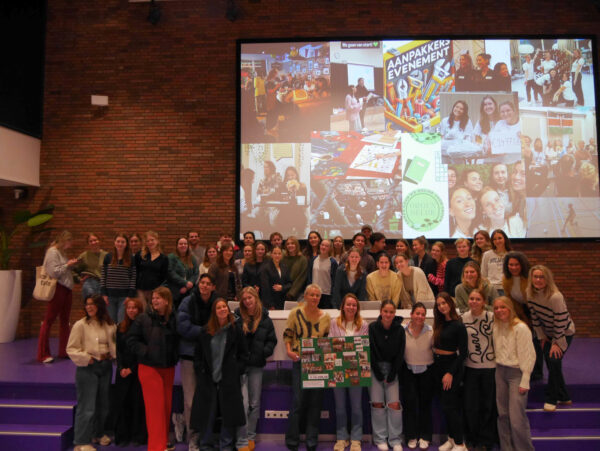
Churches
Each year, Edukans can rely on the commitment and support of churches in the Netherlands. The total amount that Edukans received the past year through various church congregations and church organisations is €119,008. This is close to the amount received in 2023.
Institutional donors
Available funds from institutional funds are under pressure, largely due to shifts in budget priorities both in the Netherlands and globally. In 2024, we obtained over 0.9 million euros in funding from institutional donors. While revenue from institutional grants came in below expectations, this reflects a more competitive landscape and fewer opportunities in the education funding space for 2024. At the same time, our efforts to collaborate with strategic partners are progressing, though they have required more time and engagement than initially planned – laying a stronger foundation for long-term impact.
Our long-standing collaboration with UNICEF remains strong and our partnership with UNHCR has continued to grow and evolve. We are especially proud that Edukans has been selected as a key education partner for UNHCR for the next five years – a clear recognition of our expertise and a significant step in reinforcing our leadership in the field.
We have expanded our reach through new collaborations. With funding from the ILO, we are strengthening the financial and technical capacity of non-profit youth-led organisations in Ethiopia. If successful, this pilot project will open new pathways for supporting youth employment within Edukans. To reinforce our collaboration, our CEO and Partnership Manager visited the ILO headquarters in Geneva in June 2024.
Additionally, Edukans has joined a consortium dedicated to improving literacy in primary schools across Malawi, funded by Imagine Worldwide.
Looking ahead, we are committed to deepening our engagement with international funding partners. Building a strong partnership with the Mastercard Foundation is a key focus, with programmes aimed at enhancing teaching capacity set to launch in 2025.
Strengthening relationships with international and institutional donors remain central to our strategy, ensuring long-term projects with sustainable impact. By doing so, we actively contribute to the United Nations Sustainable Development Goal 4: ensuring inclusive and equitable quality education for all.
4.2 Campaigns draw new supporters
We are always exploring new and innovative ways to engage Dutch audiences in supporting Edukans’ mission. Over the past year, we reached our target groups through a variety of campaigns, with a special focus on green education. We have effectively raised public awareness of green education in an engaging and positive way. Read on to discover the highlights!
Crowdfunding campaign
‘The Greenies’ (De Groentjes)
In June, we launched our new crowdfunding initiative, ‘The Greenies’ (De Groentjes), aimed at supporting high-quality green primary education in Malawi. Due to extreme weather conditions, children and young people in Malawi are increasingly facing hunger and poverty. Using recent videos and photos taken at schools to highlight the issues faced, we successfully reached both existing and new supporters through various channels. Thanks to the participation of numerous individuals, companies, and schools, we raised an amount of €43,765. This funding has enabled the establishment of 11 new eco-schools in Malawi.
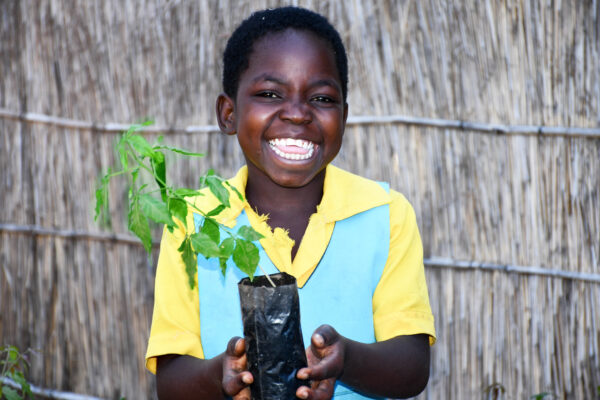
Brand awareness campaign
The Green Wish Campaign (Groene Wensactie)
In December, around the holiday season, we launched our second campaign focused on high-quality green education: The Green Wish. This campaign highlighted the severe impact of climate change – such as hunger and poverty – on children and young people in Ethiopia, Kenya, Malawi, and Uganda. The main goal was to boost brand awareness and position Edukans as a key player in green education. We successfully captured public attention, reaching nearly 250,000 new people. Our advertisements were shown more than 543,081 times across various channels, further amplifying our message. Through sympathetic videos, powerful imagery, and the invaluable support of our ambassadors, we raised an impressive €19,032.40 in donations. These funds will enable us to develop innovative green teaching methods and train more teachers to provide this vital education.
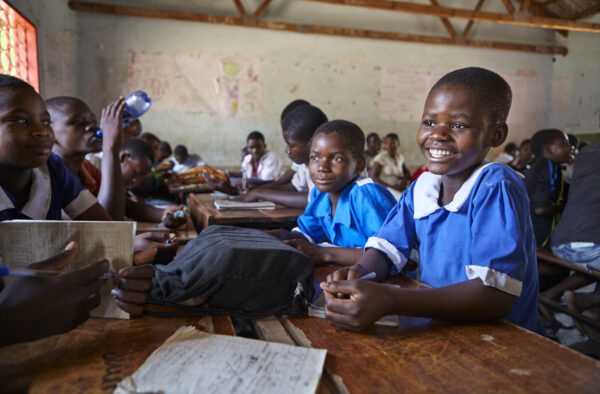
Crowdfunding campaign
‘The Greenies’ (De Groentjes)
In June, we launched our new crowdfunding initiative, ‘The Greenies’ (De Groentjes), aimed at supporting high-quality green primary education in Malawi. Due to extreme weather conditions, children and young people in Malawi are increasingly facing hunger and poverty. Using recent videos and photos taken at schools to highlight the issues faced, we successfully reached both existing and new supporters through various channels. Thanks to the participation of numerous individuals, companies, and schools, we raised an amount of €43,765. This funding has enabled the establishment of 11 new eco-schools in Malawi.
Brand awareness campaign
The Green Wish Campaign (Groene Wensactie)
In December, around the holiday season, we launched our second campaign focused on high-quality green education: The Green Wish. This campaign highlighted the severe impact of climate change – such as hunger and poverty – on children and young people in Ethiopia, Kenya, Malawi, and Uganda. The main goal was to boost brand awareness and position Edukans as a key player in green education. We successfully captured public attention, reaching nearly 250,000 new people. Our advertisements were shown more than 543,081 times across various channels, further amplifying our message. Through sympathetic videos, powerful imagery, and the invaluable support of our ambassadors, we raised an impressive €19,032.40 in donations. These funds will enable us to develop innovative green teaching methods and train more teachers to provide this vital education.
Positioning
‘Always on’ strategy
The Green Wish Campaign marked the beginning of our new ‘Always On’ strategy. This approach allows us to continuously engage with everyone we reached during the campaign, ensuring that Edukans remains fresh in the minds of our target audience. Our goal is to strengthen brand awareness and firmly position Edukans as the leading specialist in education in Eastern Africa. A stronger brand presence and increased recognition will, in the long term, help us generate more leads from companies, funds, foundations, and schools, while also boosting donations from private individuals. The development of new corporate materials – such as television and radio spots, as well as print advertisements – has been postponed until 2025.
“In 2024, the Always On strategy significantly boosted donations, visibility, and brand awareness. In 2025, it will strengthen our position as the leading education specialist in Eastern Africa. At the same time, we must focus more on sustainability and innovative green teaching methods, as climate change continues to impact the region severely. Every euro is needed to support and build resilience among children and young people in Eastern Africa.”
- Remco Phillipson, Marketeer at Edukans

4.3 Our ambassadors
In 2024, our ambassadors Sofie van den Enk, Nick Schilder, Ron Boszhard, Bracha van Doesburgh and Martine van Os supported us greatly. They promoted us in various media and with our campaigns (‘The Greenies’ and Green Wish campaign). We are proud of our ambassadors and how they advocated for unleashing the power of education, resulting in a growing support for the work of Edukans. We look forward to resuming our activities in 2025.
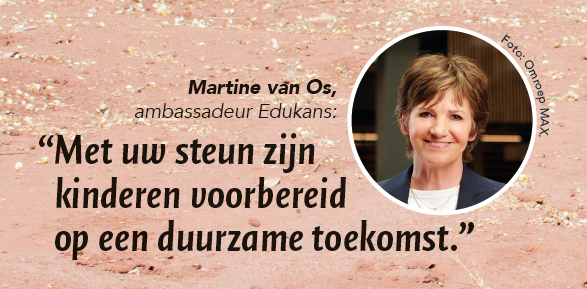
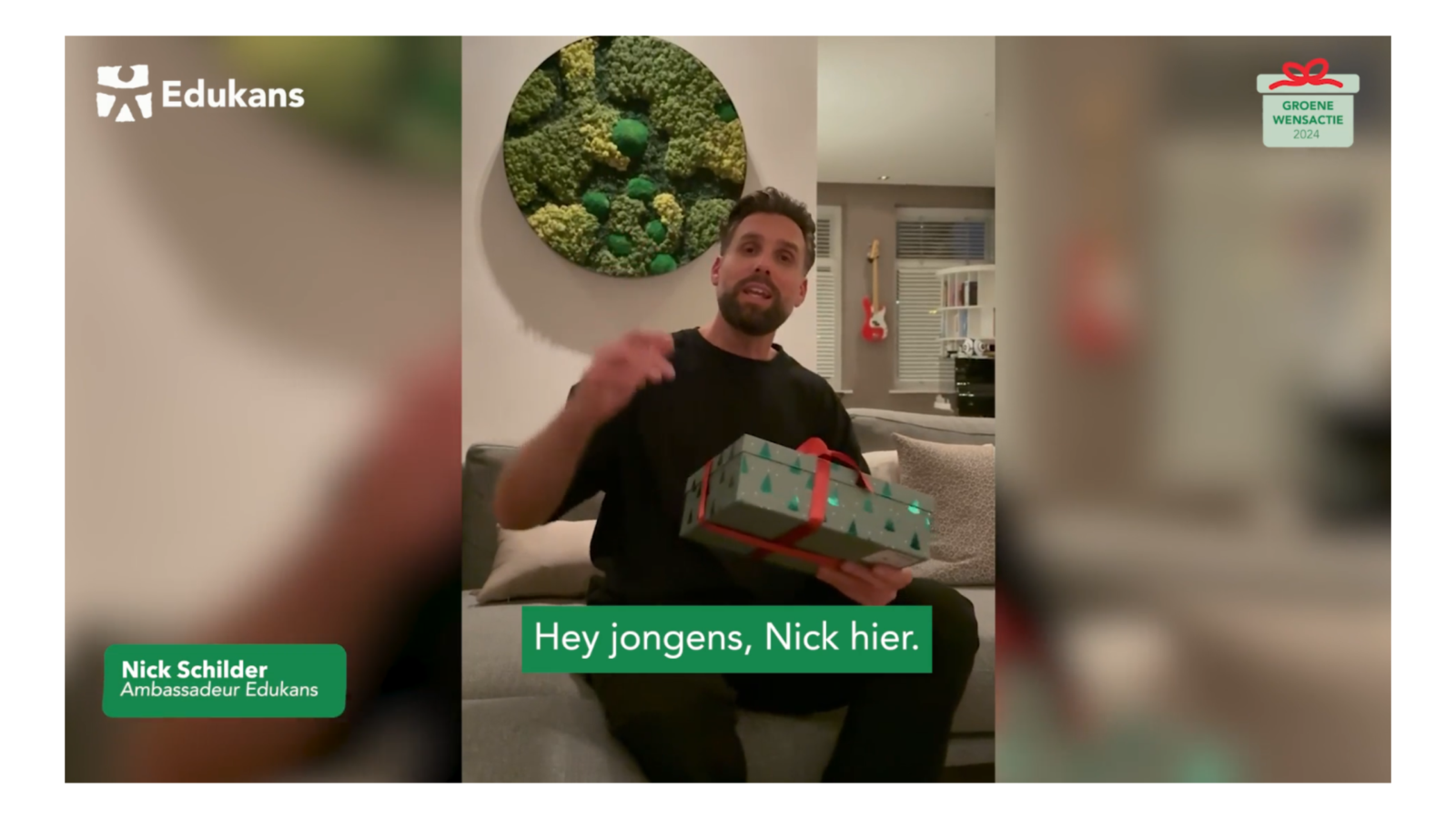
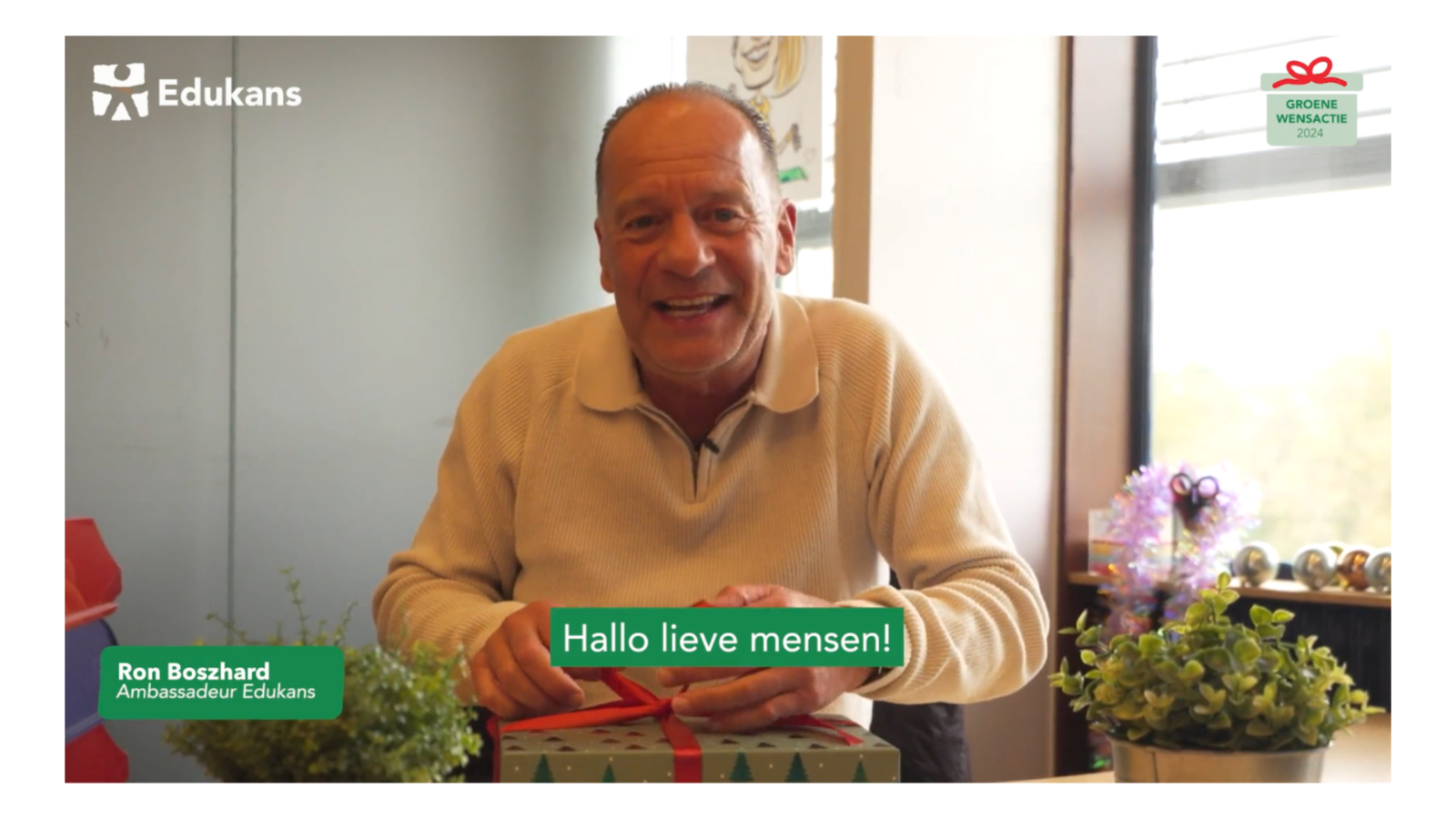
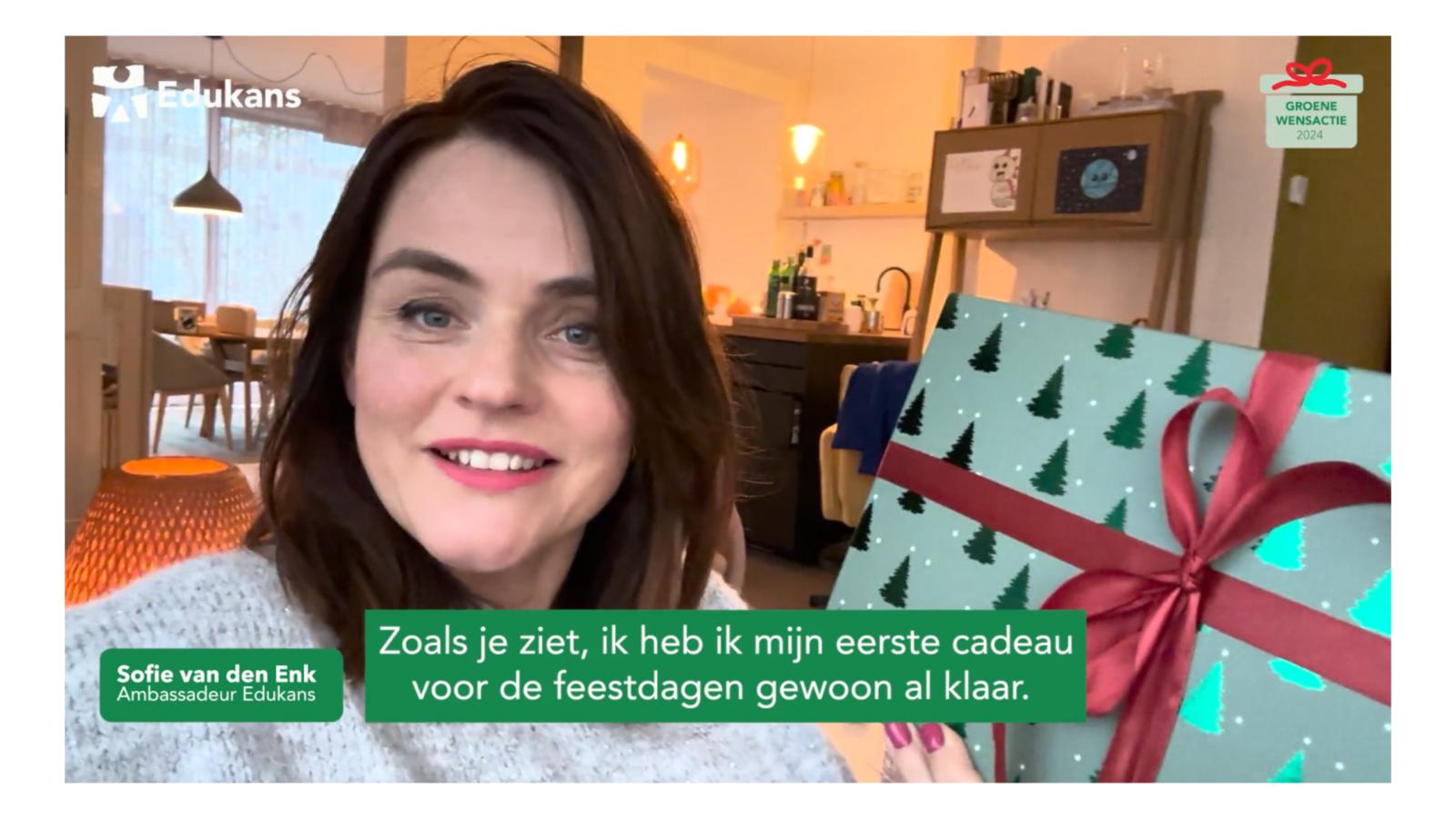
- 0
- 1
- 2
- 3
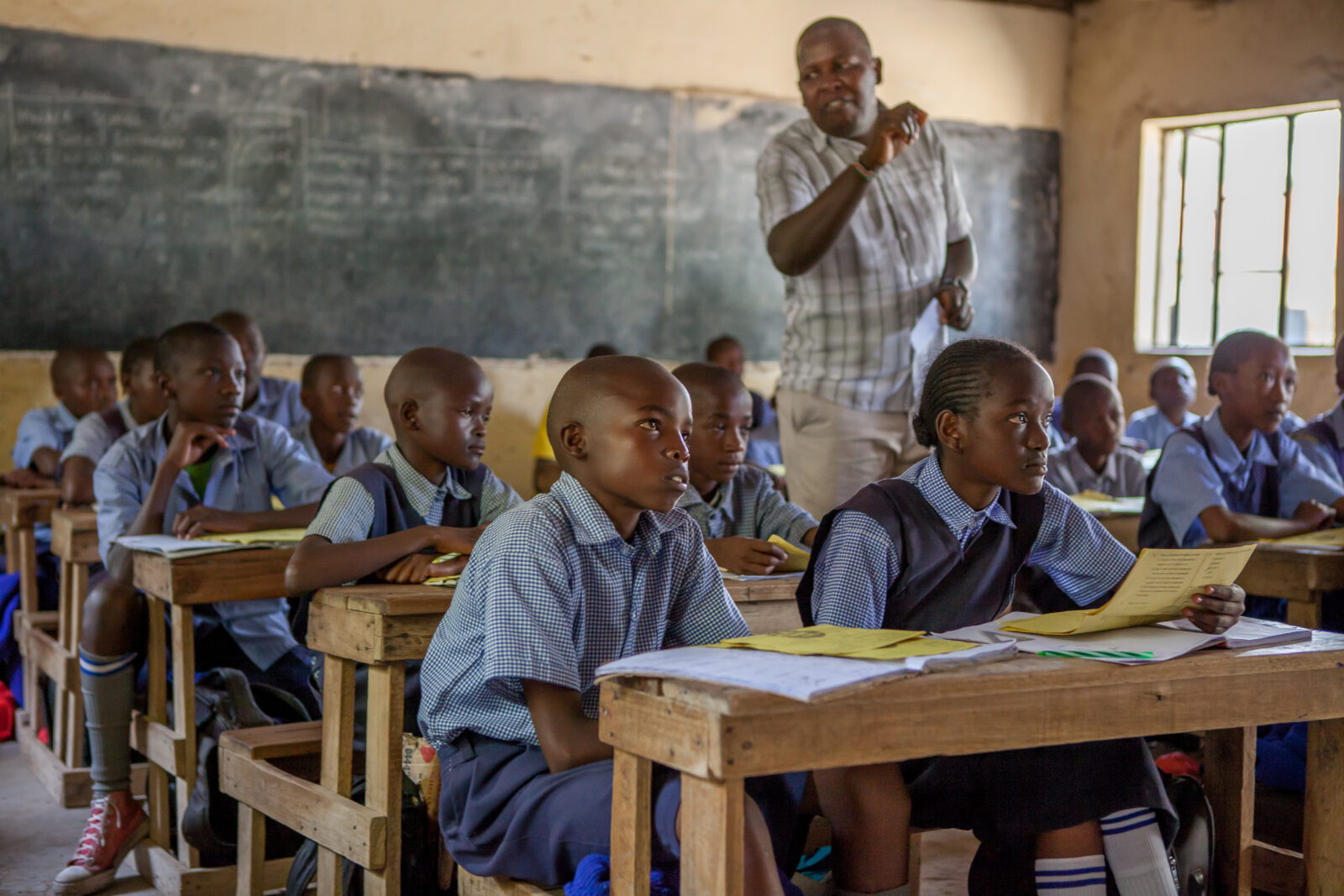
How are we shaping the public agenda?
5. Lobby and advocacy

5. Lobby and advocacy

Education on the political agenda
In 2024 Edukans actively participated in the Global Campaign for Education in the Netherlands (GCE-NL), both as a member and, this year again, as chair. GCE is driven by the conviction that education is a universal human right and that quality education for all is achievable.
The past year GCE NL and its partners have worked hard to advocate for and support quality education in the Global South both on national and European level. One of many examples: The Adopt an SDG campaign from Building Change. Member of Parliament Isa Kahraman has adopted SDG 4 ‘Quality Education’ which means that as the SDG 4 ambassador, he will dedicate himself to help ensure equal access to quality education and promoting lifelong learning for everyone and GCE NL will support these efforts.
Edukans joined the Global Black Impact Summit in February 2024, in Dubai, hosted by the Black Impact Foundation. Mary Mugo, Country Director Edukans Kenya, emphasised the importance of education and mentorship in empowering communities. We value platforms such as these to advocate for quality education and its transformative impact.
Over the past years the political landscape has grown less favourable for international cooperation and education in the Global South. Through coalitions such as KROS, PerspActive and Partos we have worked hard to highlight the urgency of investing in international cooperation, children’s rights and inclusive and equitable education in the Global South. Initiatives have ranged from engaging joint campaigns about the importance and impact of international cooperation to joint reach out to policy makers and members of parliament.
There is an urgent need for education systems to impact higher skills aligned with the needs of growing economies, where job skill sets are fast changing, many being automated. Edukans is also member of the PerspActive Network, involved in a joint effort to advocate for the importance of skills development and decent job creation for young people.
Before summer started the Dutch Minister for Foreign Trade and International Cooperation (BHOS) presented the government’s Africa Strategy until 2032 to support relationships and cooperation with Africa. Through the network’s Global Campaign for Education Netherlands (GCE-NL), together with Partos and PerspActive, Edukans responded to the lack of educational support in the strategy. Our response covered a strong push for the necessary attention to basic skills such as reading and writing, teacher training, and education financing. This resulted in a political party requesting the inclusion of the development of education and workforce programmes within the Africa Strategy short-term priorities. This suggestion was approved by the members of parliament and the points on education will be adopted into the strategy.
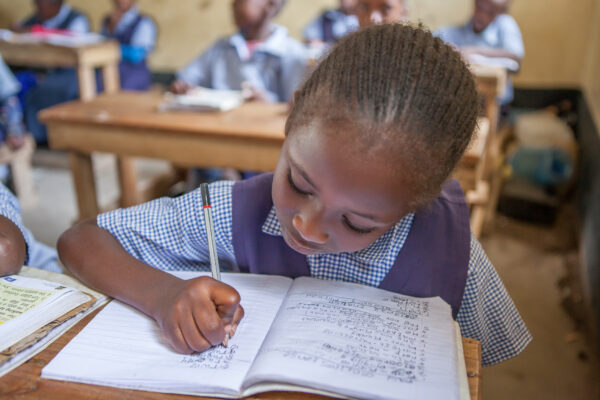
Advocacy in our country offices
All Edukans country offices are members of Global Campaign for Education (GCE). Our advocacy work is illustrated by the examples below.
The African Union has declared 2024 as the Year of Education, highlighting the continent’s dedication to advancing Sustainable Development Goal 4 (SDG 4). As part of this initiative, the AU organized a Heads of State Summit for the Southern African Development Community (SADC). Edukans was proudly represented by our colleague from Malawi at a civil society meeting, focused on the critical theme of education financing in Zimbabwe.
Advocacy in Uganda
Edukans Uganda successfully lobbied to be included in the Mastercard Foundation’s secondary school programme. As a result, the organisation became a partner in the Leaders for Teaching programme, alongside eight other organisations. Edukans was also engaged in lobbying for fair tax policies for non-governmental organisations in Uganda.
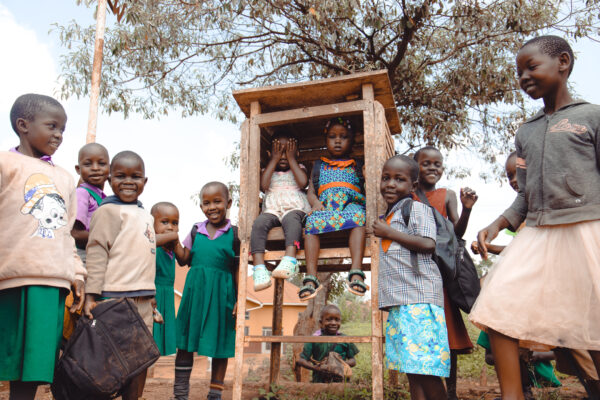
Advocacy in Kenya
Edukans Kenya, represented by Country Director Mary Mugo, attended the United Nations Civil Society Conference in Nairobi, Kenya. This conference provides civil society organisations with a platform to address global issues, bringing together senior UN officials, leading international civil society organisations, youth changemakers, academia, public opinion leaders, and international media. As a result, Edukans established a connection with the UNESCO Youth Forum, which has since been actively involved in its programmes. Additionally, Edukans participated in the Ethics Education Fellowship Programme in collaboration with KNATCOM for UNESCO. This collaboration has seen Ethics in Education incorporated in the national curriculum by the ministry of Education. The Kenya office has played an active role in the Elimu Yetu Coalition, through which civil society organisations advocate for education policies and realisation of quality learning outcome at the national level.
Advocacy in Malawi
Edukans Malawi participated in the Annual Joint Sector Review Meeting, highlighting the importance of collaboration in improving education. Key points included innovative partnerships with communities and government, prioritising education for marginalised children, and the need for data-driven decision-making to create effective policies and programmes. Edukans Malawi participated in the Validation Workshop for the Higher Education Bill, focusing on promoting high-quality standards in higher education. Key contributions included advocating for strong quality assurance mechanisms, emphasising inclusive and accessible education, and highlighting the importance of industry-academia partnerships to boost graduate employability and entrepreneurship. At the Curriculum Review Meeting, Edukans Malawi presented a compelling case for integrating environmental education into the national curriculum under review.
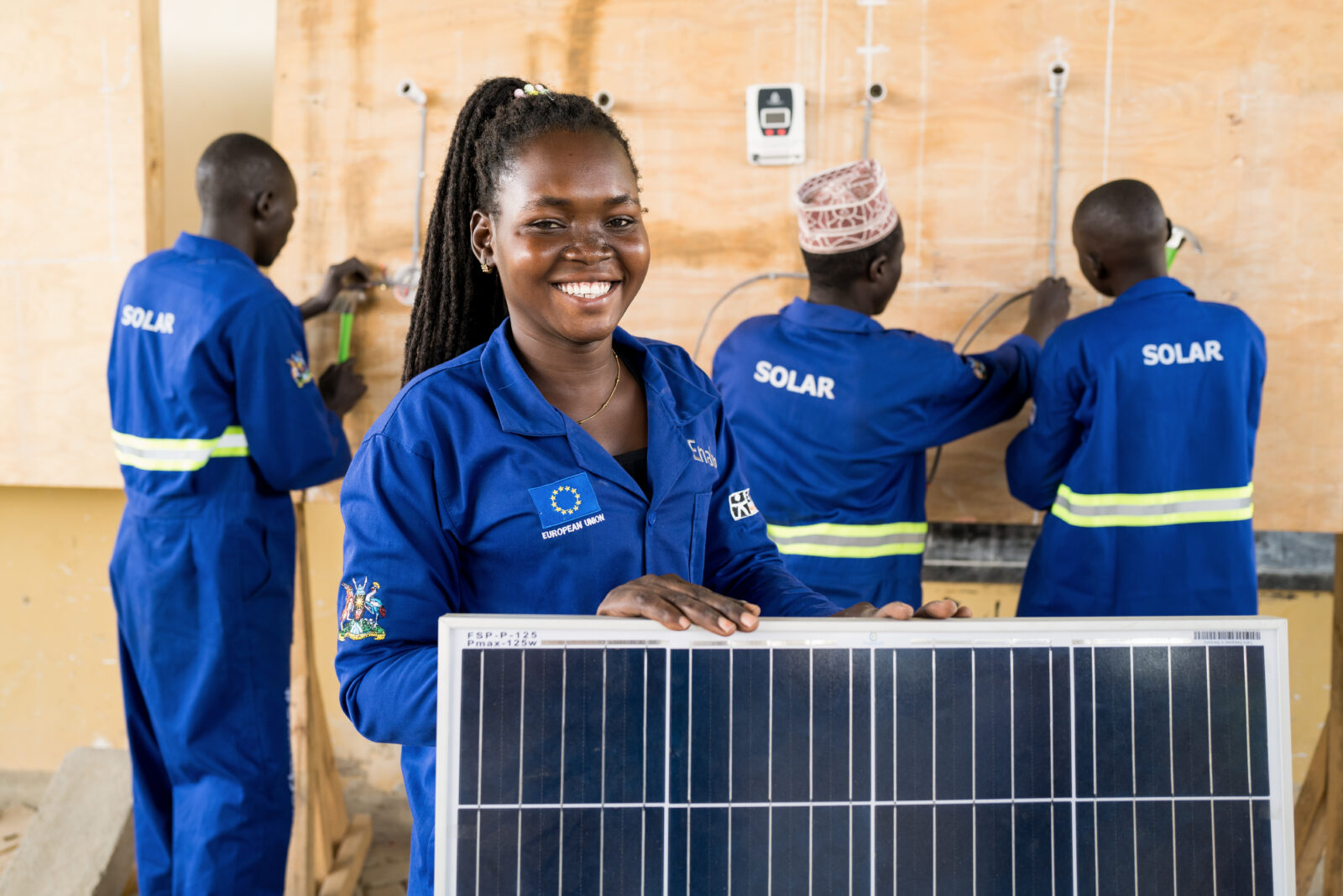
What did we learn from last year?
6. Lessons learned

6. Lessons learned

Strategy
Building long-term partnerships and adopting a programmatic approach took time and came with its challenges. However, in the end it paid off, laid a strong foundation and established a comprehensive programme in our focus countries.
Edukans is currently implementing its strategic focus for 2021-2025. Priority is now being placed on ensuring quality education and creating future prospects for children and young people in Eastern Africa.
To be more successful, we learned that working as One Edukans – with an internationally connected management – enables us to exchange knowledge, strengthen education systems, and scale up programmes.
Engagement & Fundraising
Funding for programmes and projects is essential to generate the desired impact on education. The constantly changing donor landscape and the role of civil society and INGOs require deep reflection and the ability to adapt to these developments, without losing focus on our mission and realisation of our strategic agenda. Therefore, the Engagement & Fundraising (E&F) team is even more committed to working in a data-driven way and staying closely attuned to the needs of diverse donor groups and evolving market trends.
In 2024, Edukans transitioned from one-off partnerships with foundations, corporations, and schools to more strategic, multi-year collaborations with these key segments. This approach strengthened our existing relationships and resulted in a renewed and more diverse stakeholder base.
Programmes
Basic Education
Basic education covers the core learning necessary for personal development, social participation, and future learning. This is not only the domain of schools for Primary Education but also that of Early Childhood Education and Lower Secondary Education. In 2024, following the needs of government stakeholders, we have been engaged in consultation (Malawi), co-creation (Uganda) and implementation (Ghana) in secondary education programmes.
In all these efforts, community involvement continues to prove crucial. Engaging local communities ensures that our educational programmes are culturally relevant, widely accepted, and sustainably implemented.
Furthermore, we worked on validation of our approaches and further developing effective approaches in the area of teaching and learning foundational literacy and numeracy (FLN). By increasing cross-country learning, we shape our efforts to stay informed about innovations and developments in the educational field, and in 2024 particularly the focus was on Edukans’ cross-cutting theme of climate change. A community of practitioners has been put together to further develop and implement approaches for Education for Sustainable Development (ESD) in Basic Education.
Both FLN and ESD will only become more important in the years to come, highlighting the need for ongoing focus and development in these areas.
We continue to learn more about how education intersects with many other social issues, such as child labour, and can serve as a protective factor. By strengthening our efforts to integrate education with broader social initiatives we aim to address complex issues more effectively.
Education in Emergencies
Edukans has effectively adapted and scaled its Education in Emergencies programme across multiple countries, showcasing its ability to respond to diverse crisis contexts. In 2024 the Active Teaching and Learning (ATL) method was funded by an NGO as a consultancy job. The method was introduced to NGO-staff to improve classroom engagement and learning outcomes in emergencies. Digital training modules such as classroom videos were used, focusing on child-centred pedagogy and school management.
In addition, we continued to stress the importance of Mental Health and Psychosocial Support (MHPSS) for conflict affected teachers and their pupils. Even in locations where protection services are available, teachers need the tools for themselves and their pupils whose trauma manifests in bullying, discrimination, and other types of social pressures. To enable this, Edukans integrates life skills in the teaching methodology, in addition to involving pupils in art and music. Painting and playing music – especially in an emergency setting – supports the mental health of individuals, empowering them with coping skills and tolerance through self-expression in the arts, resulting in proven improvement in the school performance and mental wellbeing of the pupils.
Skills for Work and Life
We have worked on updating a number of our manuals and trainings. This remains a continuous effort to align the content with new insights especially in relation to our drive towards sustainability and circularity. For example, our entrepreneurship module has been updated, and a new working method called design-thinking will be further developed and introduced in various projects. Design-thinking is a human-centred, iterative approach to problem-solving and innovation. It emphasises understanding the needs of users, challenging assumptions, and redefining problems to create effective solutions.
Alongside focussing on skills training, we have incorporated more concrete links with the labour market. We have done this, for example, by working more closely with the private sector and including aspects such as mentorship, coaching, and start-up kits in our projects. We have also placed Entrepreneurship at the centre of our approach as there are often not enough formal jobs for the number of graduates entering the labour market. Entrepreneurship could be part of the solution to ensure the students can transition from ‘learn to earn’.
Over the past year, the number of stakeholders we cooperate with has continued to grow. We will continue to invest in strategic partnerships as well as growing our network to benefit project implementation, strategy development, and capacity strengthening.
Organisational culture
In 2024, as One Edukans, we reinforced our commitment to an inclusive and culturally sensitive work environment, especially in the context of working across countries and cultures. As our teams become increasingly international, we recognised the importance of bridging cultural differences and enhancing communication across diverse backgrounds.
Our efforts in 2024 reflect our belief that an organisation’s culture is not static but continuously evolving. By fostering a culture that embraces diversity and international collaboration, we strengthen our collective ability to innovate, exchange, connect, and succeed on a global scale.
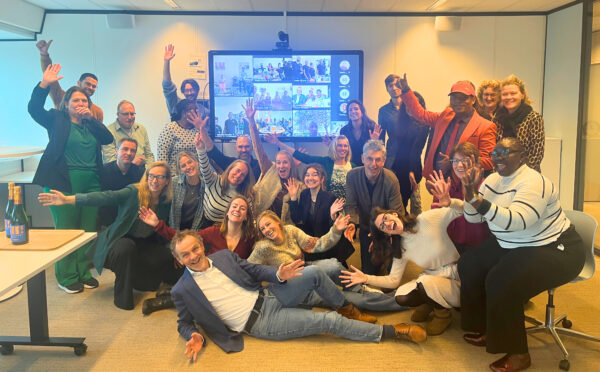
Safety and security
Edukans’ safety and security policy, together with the crisis management protocol, has proven to be effective and offers support in handling safety situations. In doing so, Edukans struck a good balance between acting in accordance with protocol and policy and paying attention to the impact on the organisation and employees.
Integrity
To make sure that the integrity system is completely implemented, it is necessary to keep integrity on the agenda and actively invite staff members and partners to discuss sensitive issues together, with respect for each other. Therefore, in 2025, moral deliberations will be continued to contextualise integrity and support a culture of open communication.
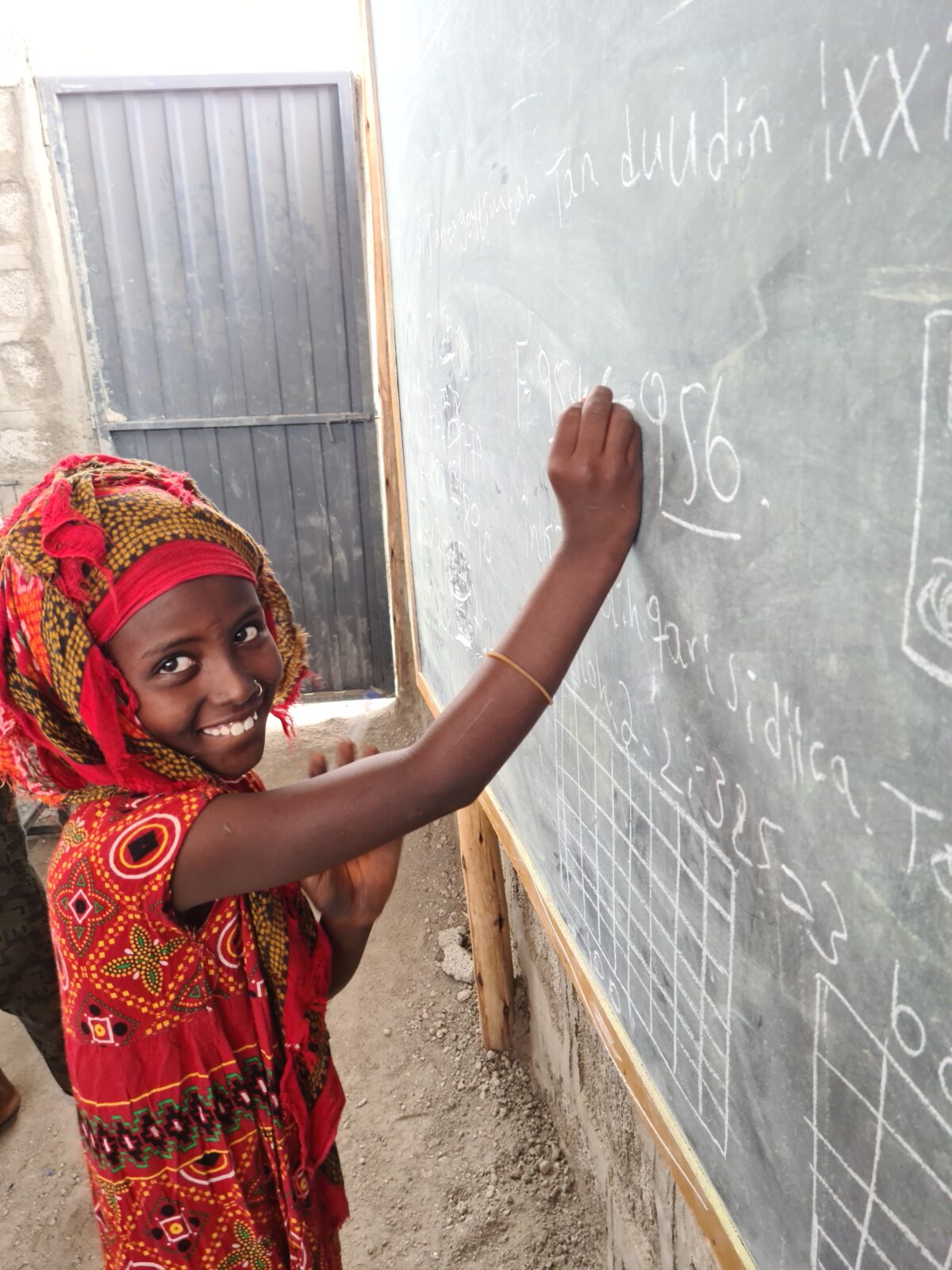
What does our organisation look like?
7. Governance and organisation

7. Governance and organisation

Edukans was founded in 2002 and is pursuing a mission to create opportunities, enabling children and young people in Eastern Africa to shape their futures with confidence. Edukans’ work could not succeed without our professional and dedicated staff across the world, our dedicated volunteers, and our ambassadors.
7.1 Organisational chart
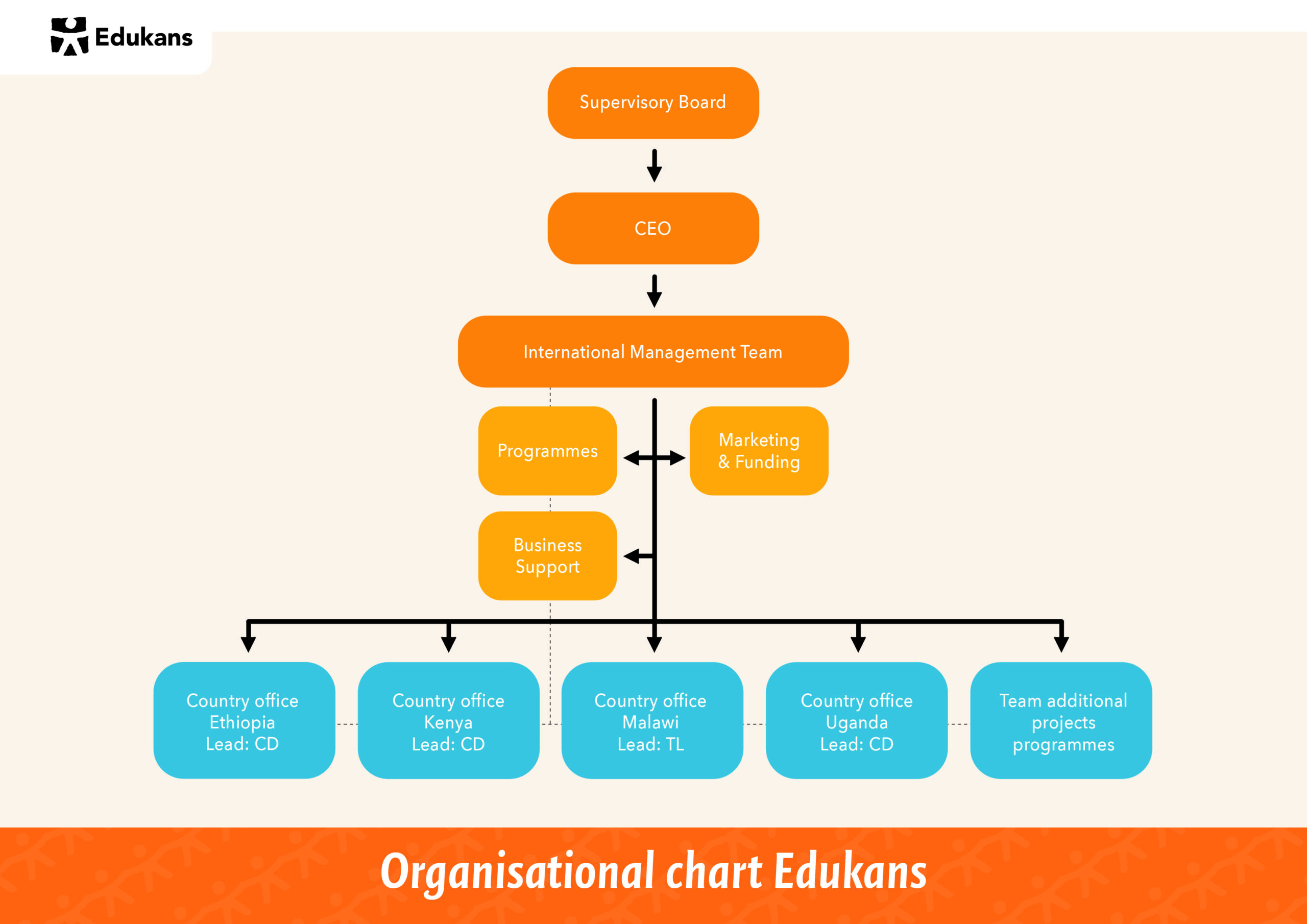
7.2 Organisational structure and cornerstones approach
Edukans operates as one organisation with five offices located in Ethiopia, Kenya, Malawi, the Netherlands, and Uganda. Country Directors represent the Country Offices in relationships with our stakeholders, and are responsible for country office management. Country Offices are tasked with designing and implementing projects, forging strategic partnerships at the national level, and mobilising resources through country-based institutional donors.
Edukans Netherlands is responsible for the organisational planning and control cycle, overall financial management, fundraising, marketing, partnership and stakeholder management, as well as the development of education programme strategies. It focuses on designing and enhancing educational approaches and tools, fostering stakeholder engagement, driving strategic fundraising, and building strategic partnerships both globally and within the Netherlands. Edukans Netherlands and its Country Offices collaborate seamlessly through international teams, ensuring effective teamwork and providing support wherever it is needed.
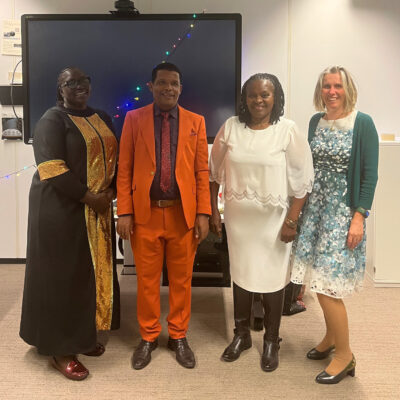
Environmental Social Governance (ESG)
Edukans further implemented its Environmental Social Governance (ESG) policy in 2024. Implementing this policy enhances our sustainable development and decision-making processes, better communicates our mission, and deepens stakeholder engagement. Key areas of focus included:
- Reducing greenhouse gas emissions by further tightening our travel policy with criteria when the importance of travel outweighs CO2 emissions. In addition, Edukans’ Dutch office will relocate in 2025 and sustainability and, where possible, reusability of materials will be taken into account in the preparations for furnishing the office premises.
- Promoting diversity and inclusivity in the workplace, emphasising health and safety with tools such as OpenUp to facilitate the well-being of staff members.
- Ensuring a balanced representation on the board and in IMT in terms of gender and geography.
Progress on the targets as stated in this policy for 2025 will be reported in the trimester reports and the annual report for 2025.
Cornerstones approach
The essence of Edukans is built on four fundamental cornerstones:
- Core values
- Strategic partnerships
- People to Value
- Environmental Social Governance
Obviously, quality education is at the heart of the organisation.
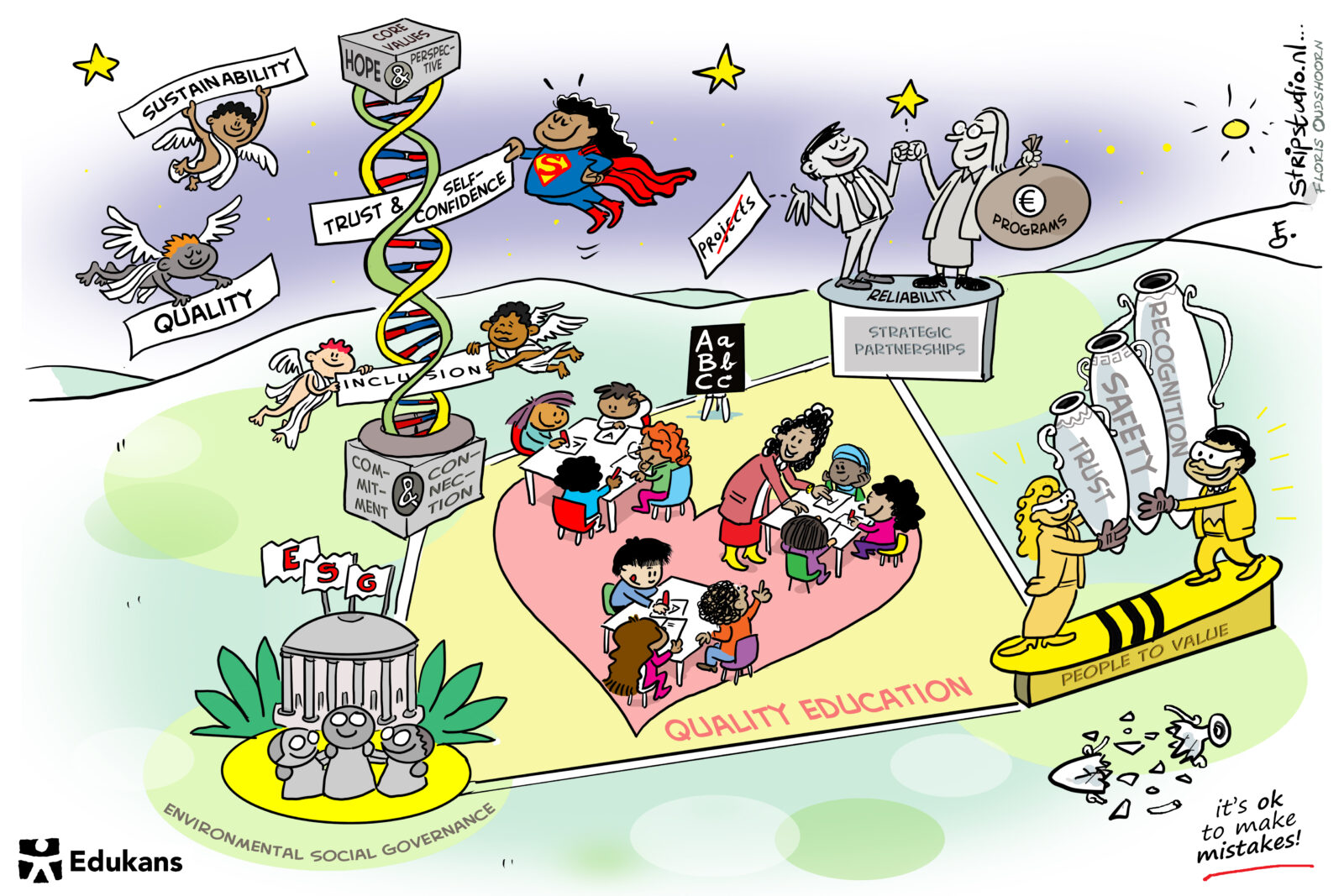
7.3 HR
Valuing People: HR Strategy and Commitment at Edukans
At Edukans, people are at the heart of our success. We aim to create a workplace where everyone feels respected, trusted, and appreciated for their unique contributions. Trust is key to our team dynamics and essential for growth.
We promote critical reflection and constructive feedback to support continuous learning. Mistakes are seen as opportunities for development and staff are encouraged to learn and grow in a supportive environment.
Our commitment to a safe workplace includes not only physical safety but also integrity, well-being, and security. Diversity, equity, and inclusion are embedded in our recruitment and HR policies, ensuring equal opportunity for all.
In a competitive labour market, we strive to attract and retain top talent by offering fair conditions and adapting to evolving challenges, both globally and in the Netherlands.
As we grow, our focus remains on valuing people and creating an environment where both individuals and the organisation can thrive.
Our staff – done
| Edukans | Netherlands | Edukans | Ethiopia | Edukans | Uganda | Edukans | Malawi | Edukans | Kenya | |
|---|---|---|---|---|---|---|---|---|---|---|
| 2024 | 2023 | 2024 | 2023 | 2024 | 2023 | 2024 | 2023 | 2024 | 2023 | |
| Average number of FTE | 20.6 | 21.4 | 19.9 | 24.0 | 5.2 | 6.0 | 6.9 | 5.3 | 6.1 | 6.0 |
| End of the year number of staff | 26.0 | 26.0 | 20.0 | 27.0 | 3.0 | 6.0 | 14.0 | 6.0 | 6.0 | 6.0 |
| Gender balance | ||||||||||
| Female | 65% | 69% | 20% | 34% | 67% | 50% | 36% | 67% | 50% | 50% |
| Male | 35% | 31% | 80% | 66% | 33% | 50% | 64% | 33% | 50% | 50% |
7.4 Volunteers
In 2024 Edukans worked with 6 volunteers who enthusiastically and unselfishly committed themselves to Edukans. They provide a valuable contribution to our organisation and offer support by doing a wide range of work activities at the Edukans office. A very special thanks therefore goes out to our volunteers who never wavered in their commitment and enthusiasm to support Edukans in striving for quality education.
7.5 Supervisory Board
Members of the Supervisory Board of Edukans are appointed for a period of four years and may be reappointed twice. As of 31 December 2024 the Supervisory Board consisted of the following members:
- J. Mesman, chairman, as a member responsible for integrity, Professor (Youth & Society) at Leiden University. Field of expertise: education, pedagogical skills, diversity and inclusion (appointed in 2023).
- D.M.J. Haaksma, chairman audit committee, Director Finance, Control & Analytics at Stichting Hogeschool in Utrecht. Field of expertise: accountancy (appointed in 2022).
- K.R. Rosalina, as a member responsible for integrity, educationalist and consultant at Drakenfruit. Field of expertise: education (appointed in 2023).
- R.N. Zomer, member audit committee, Manager International Business at Evofenedex. Field of expertise: Fundraising, small medium enterprises, (appointed in 2023).
None of the members of the Supervisory Board have declared additional positions which may conflict with their membership of the Supervisory Board of Edukans. Each year, the members of the Supervisory Board receive attendance fees in line with the guidelines of Goede Doelen Nederland and CBF.
The Supervisory Board acts in accordance with the provided framework and the ‘Regulations of the Supervisory Board’. The audit committee consists of two members of the Supervisory Board. The Supervisory Board monitors continuity, supervises the realisation of strategic objectives, reviews the quality of management, and advises the management board about relevant social developments. The Supervisory Board approves the strategic plan, the annual plan and budget, the annual accounts and the annual report, including auditors report, as part of the financial planning and control cycle, and focuses on the assessment of financial management and the quality of controls. In 2023, The Supervisory Board held 5 meetings.
The current Strategic Agenda 2021-2025 was approved by the Supervisory Board in November 2020. In December 2022 the Supervisory Board approved a revision of the strategic plan supporting sustainable investment in the development of Edukans as one global organisation as part of the annual plan for 2023.
7.6 Executive board and management
Petra van Haren is the executive director. The executive board of Edukans is appointed by the Supervisory Board. The authority of the executive director and the relationship between the executive director and the Supervisory Board are laid down in the articles of association, the Regulations of the Supervisory Board and the Bylaws. Based on the managerial assessment framework and the job description of the executive director, there are performance reviews with the executive director every year.
The salary of the executive director of Edukans has been determined in accordance with the Dutch Standards Committee (Erkenningsregeling Commissie Normstelling), set in scale 15 of the Civil Servants’ Pay Decree.
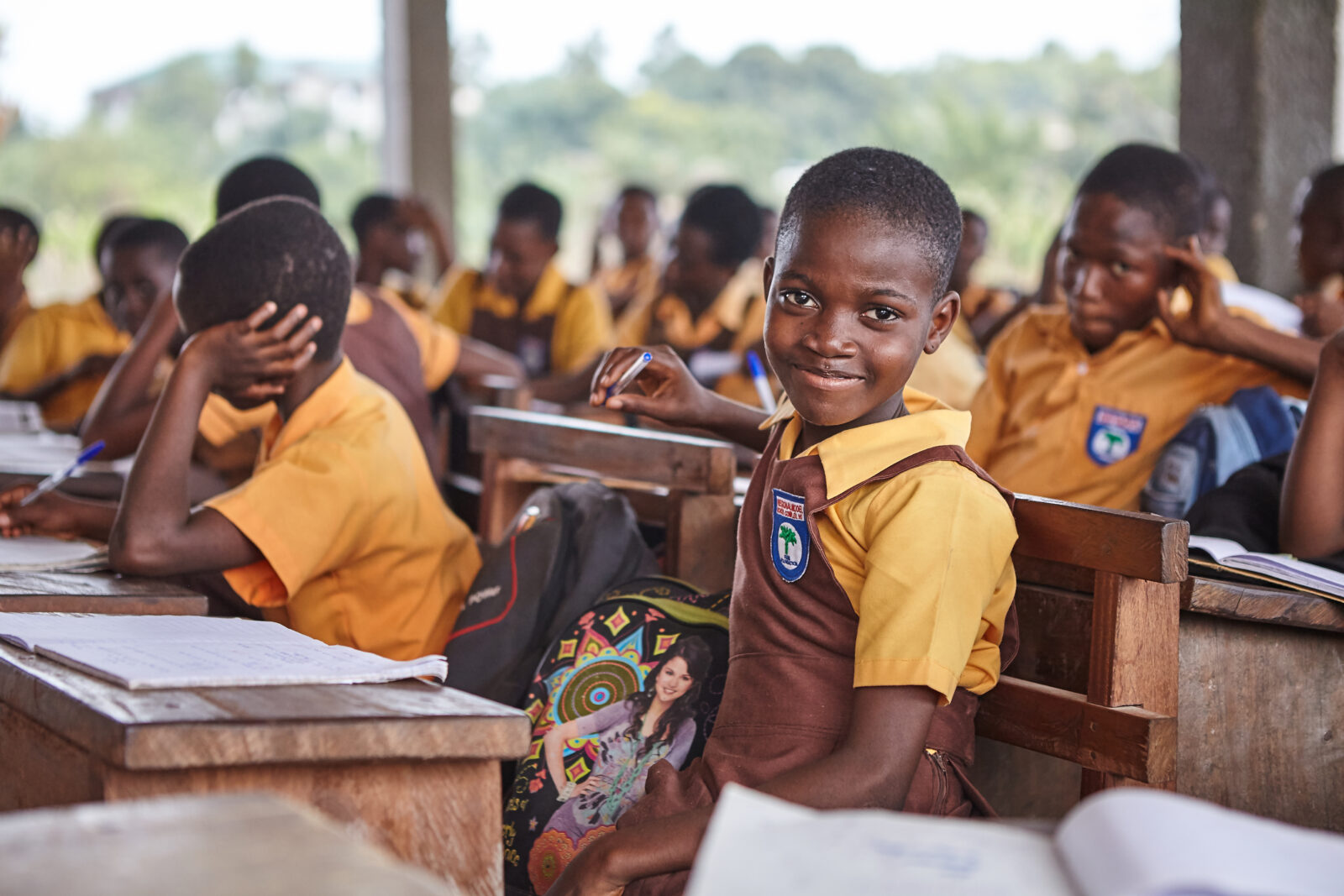
How do we stay transparent and accountable?
8. Transparency and accountability

8. Transparency and accountability

8.1 Statement of responsibility
Edukans holds a quality mark issued by the Dutch Central Fundraising Bureau (CBF). Our organisation complies with the Dutch Standards Committee (Erkenningsregeling Commissie Normstelling). In the statement of responsibility, Edukans indicates how it implements the three main principles of the CBF quality mark:
1. Distinguishing supervision, management, and performance
2. Optimisation of effectiveness and efficiency of spending
3. Optimisation of dealings with stakeholders
1. Governance structure
Edukans Foundation has an Executive Board, which consists of 1 Board member, the Chief Executive Officer who is responsible for managing the Foundation. The CEO reports to the Supervisory Board. Our organisation operates with a decentralised structure and following the subsidiarity principles, supported by an international management team that includes Country Directors / Representatives from the offices in Ethiopia, Kenya, Malawi and Uganda and from the office in the Netherlands the Manager Programmes, and Manager Engagement & Fundraising (formerly known as Marketing, Communication and Fundraising), completed by the HR Manager and Financial Controller. The CEO also serves as the chair of the International Management Team (IMT).
In Kenya, Malawi, and Uganda, we have established in-country advisory boards to comply with national laws and regulations.
To guarantee a separation of functions and to prevent conflicts of interest, no close relationships are permitted between members of the Supervisory Board and the International Management Team. In addition, no connections are permitted between any of these members and an organisation with which Edukans, in the normal course of its work, conducts transactions that can be valued in monetary terms. In case of a potential conflict of interest, this will be resolved through discussion.
2. Optimisation of effectiveness and efficiency of spending
Edukans is always seeking to improve quality. For the implementation of its educational programmes Edukans has an extensive knowledge system that monitors the quantitative and qualitative results that were targeted for each programme. This shows both the increase in the number of children and young people going to school or enjoying better quality schooling, as well as the extent to which learning outcomes have improved and whether young people experience an increase of employment opportunities as a result of the interventions by Edukans. For each programme, several qualitative results are also monitored, for example the available educational resources or the level of training of the teachers. Both the availability and quality of education are key indicators for Edukans. Through the strategic plan and the budget, Edukans determines the guiding objectives.
Following the CBF guidelines on ratios for effective and efficient spending, the management board has set standards for objectives and the costs that may be incurred to achieve the objectives. A multi-annual forecast and annual budget is prepared, discussed in the audit committee and approved by the Supervisory Board. If there is a difference between the spending of resources with that provided for in the budget this is reported to the International Management Board, addressed in the audit committee and stated in the management report to the Supervisory Board.
3. Optimisation of dealings with stakeholders
The direct stakeholders of Edukans are children and young adults, teachers and public and private partner organisations in the focus countries, donors, subsidy providers, employees and volunteers. Expectations and means of collaboration are made explicit in Memoranda of Understanding and other legal agreements. Due diligence is performed to mitigate financial, capacity and integrity risks. Contact with these stakeholders is maintained through various means of communication. Regularly, stakeholders are asked for their feedback which is then used to improve our services. Guidelines and procedures are laid down in the ISO procedure. In addition to personal contacts, collaboration with partner organisations is given substance through partner consultations, closely connected as they are with future policy development.
8.2 Integrity
Providing a safe working environment for staff members, teachers, students and partner organisations is high on the agenda within Edukans. An Integrity Committee consisting of three senior members monitors the effectiveness of the integrity system, coordinates the handling of a formal report and leads the development and implementation of policies, procedures, and tools that support a culture in which people feel safe to discuss ethical dilemmas (moral deliberation) and dare to speak-up.
All staff members, Supervisory Board Members, volunteers and participants representing Edukans are required to sign the Edukans Code of Conduct, the Child Protection Policy and the Code of Conduct: Protection from Sexual Exploitation and Abuse Policy. In addition, all staff members need to successfully complete the Prevention of Sexual Exploitation and Abuse (PSEA) training on the UNICEF Agora platform and a VOG statement is part of the recruitment and selection procedure for staff in the Netherlands. A Confidentiality Advisor has been appointed and trained for staff members to discuss any concern confidentially. Edukans participated in the moral deliberations organised by Partos in the Netherlands and in 2024 moral deliberation sessions took place during the (international) stand-ups. To make sure that the integrity system is implemented completely, it is necessary for talking about integrity to become a regular point of attention within the organisation and integrated in our daily work. The Edukans Integrity Policy, which was updated and approved in June 2023, includes guidelines on how to file a report and provides links to communication channels. In addition to the formal reporting channel integrity@edukans.nl Edukans opened up an additional communication channel (via WhistleB) where people can report any concerns anonymously.
In 2024 two cases have been reported to the integrity committee, one of them turned out to be a human resources issue and has been addressed accordingly.
The second case was an integrity case at one of our country offices that was reported to and investigated by the integrity committee in May 2024. It concerned our financial administration in 2023. Although reported to the integrity committee in 2024, the financial implications were incorporated in the annual report 2023. This case has been investigated in line with our integrity policy. Edukans has zero tolerance of any violation of our integrity policy and adequate measures have been taken as a follow-up to the investigation by the integrity committee.
We do our utmost to make the integrity system at Edukans work and to create a safe space for everyone. Edukans will continue to build on the trust placed in us by our stakeholders and lower the threshold for anyone wishing to raise a concern by paying specific attention to moral deliberations and the contextualisation of Integrity.
8.3 Compliance, quality and transparency
Edukans, as a recipient of public funds and receiving gifts and donations from private donors, foundations and companies, churches and schools, needs and wants to be transparent, accountable and efficient. This is why continuous learning, improvement of quality, progress and efficiency are laid down in the strategic plan, the management report and the quality system (in accordance with ISO standard 9001: 2015 and the Partos Declaration 9001-2015, version 2018).
ISO 9001:2015 & Partos Declaration (version 2018)
Edukans has been ISO-certified since 2006. Edukans is certified under the ISO 9001:2015 standard and holds a valid Partos declaration (version 2018). The ISO-standard provides a quality management framework and ensures a philosophy of continual improvement, good governance, integrity and transparency. The Partos Declaration is a sector-specific application to implement ISO 9001:2015 (version 2018) which takes into consideration the specific circumstances of our work and the activities we undertake, with specific attention to integrity. Operations are audited internally and externally by KIWA, and findings are discussed with management and the Supervisory Board. At the beginning of 2024 Edukans was again assessed as having no shortcomings. The recommendations of the audit in 2023 were addressed successfully.
Central Bureau on Fundraising (CBF)
The Central Bureau on Fundraising (CBF) monitors all philanthropic bodies in the Netherlands and evaluates their management and policy in order to increase the transparency of the charitable sector. Edukans holds the CBF Seal of Approval and complies with its requirements.
Tax Authorities
Edukans is recognised by the Dutch Taxation Department as a charitable institution (ANBI), which means that donations and bequests to Edukans are not taxed. Donors can obtain income tax deductions for their contributions to Edukans.
Dutch Association of Fundraising Organisations (GDN)
The Dutch Association of Fundraising Organisations (GDN – Goede Doelen Nederland) is the umbrella organisation for philanthropic organisations that raise private funds in the Netherlands. Edukans upholds the principles of GDN in relation to respect, reliability, openness and quality.
Dutch Accounting Standards Board (DASB)
Our annual accounts are drawn up in accordance with the Guidelines (650) for Financial Reporting by Fundraising Institutions of the Dutch Accounting Standards Board (DASB). External reporting includes an annual report and accounts, which are verified by an auditor and accompanied by an auditor’s statement. Edukans has appointed Crowe Foederer as its external auditor. The external audit covers the audit of the annual accounts as well as those for various projects. The auditor does not provide any non-auditing (e.g., advisory) services.
OPTA
In its telemarketing activities, Edukans complies with the laws and regulations of the Netherlands’ Independent Post and Telecommunications Authority (abbreviated in Dutch as: OPTA). For donations via text messaging through ‘Geef SMS (4333)’, Edukans complies with the SMS Service Provision Code of Conduct and the Advertising Code.
Complaint procedure
Should anyone wish to make a complaint, Edukans provides multiple channels and has a complaint policy, all of which are published on the Edukans websites. This includes one external channel facilitating anonymity on integrity complaints.
8.4 Risks
Edukans proactively identifies and assesses both internal and external organisational and project factors that could pose risks to our organisation. This includes potential threats to the health and wellbeing of our staff and beneficiaries in the communities we work with. Our approach to risk management emphasises prevention and the development of effective coping strategies to adequately handle these risks when they do occur.
Learning poverty
Over 250 million children worldwide are not in school, and an even greater number of children cannot read or write proficiently (UNESCO, 2024). Without foundational learning like reading and writing, pupils often fail to thrive later in school or when they join the workforce. Edukans believes that education is a universal human right, and quality education for all is achievable. We advocate both at a global level and in focus countries for the importance of good quality education and the allocation of financial resources in realisation of SDG4.
However, access to good quality education is not sufficiently high enough on the agenda of the governments in our focus countries. The political climate worldwide has become less supportive of international cooperation and strengthening civil society in general, and education in particular. Financial resource allocation of donors prioritises humanitarian aid and quick wins which threatens the chances of achieving the Sustainable Development Goals (SDGs) on and through better education.
Global cuts in development aid
The global budget for development cooperation has been cut by half, and the landscape for civil society organisations is undergoing a transformative change. Edukans is responding to these changes by strengthening current partnerships, further building on strategic partnerships, intensifying donor relations and adapting to market developments and trends. This will result in our new multi-annual strategy for 2026-2030.
Financial risks
Internal control procedures are in place and, following the integrity issue mentioned in paragraph 8.2, these have been improved to mitigate and/or absorb financial risks relating to potential misuse of funds and potential losses (i.e., due to corruption, fraud, theft, or high inflation rates), as well as for receiving, allocating, and the payment of funds. Edukans constantly works to improve cost recovery ratios, as well as financial reporting systems. Edukans has adopted a sustainable investment strategy, with a diversified investment portfolio which offers better safeguards against volatile market developments.
Staff well-being, safety & security
Edukans prioritises the safety and well-being of its staff in all countries where we operate. Project areas in these countries might be disrupted due to political, climate and/or economic crises. We mitigate risks through comprehensive safety, security, and HR policies combined with mandatory security trainings for staff ensuring a supportive and responsible environment for our team members. Edukans acknowledges the vital role that our human resources play in ensuring the delivery of quality education as an organisation. Our staff members often take on multiple roles beyond their primary responsibilities due to the structure and size of the company. To support this dynamic, managers work closely with our HR team to offer coaching and support for managing work-related stress, fostering a healthy and positive work environment.
Alignment of policies
Strategic priorities of governments and partners organisations can change over time. Education programmes can only be effective when aligned to governmental objectives and priorities. Edukans works closely with governmental agencies and certification institutes to prevent misalignment of policies and strengthen the education system now and in the future.
Cybersecurity & AI
At Edukans, we recognise the importance of a secure digital environment and take a proactive approach to managing risks in the fields of cybersecurity and artificial intelligence. While threats such as hacking, data breaches, and identity fraud remain a concern – particularly within an international operating context – our organisation has implemented robust measures to effectively mitigate these challenges. The increasing use of artificial intelligence offers great potential for innovation, but also introduces new responsibilities. We embrace these opportunities while ensuring that the associated risks are carefully managed. To safeguard our organisation and those we serve, Edukans uses managed laptops within a secure IT infrastructure. Key preventive measures include continuous network monitoring and comprehensive staff awareness programmes. By 2025, all employees will participate in ongoing online cybersecurity training, fostering a vigilant and well-prepared workforce.
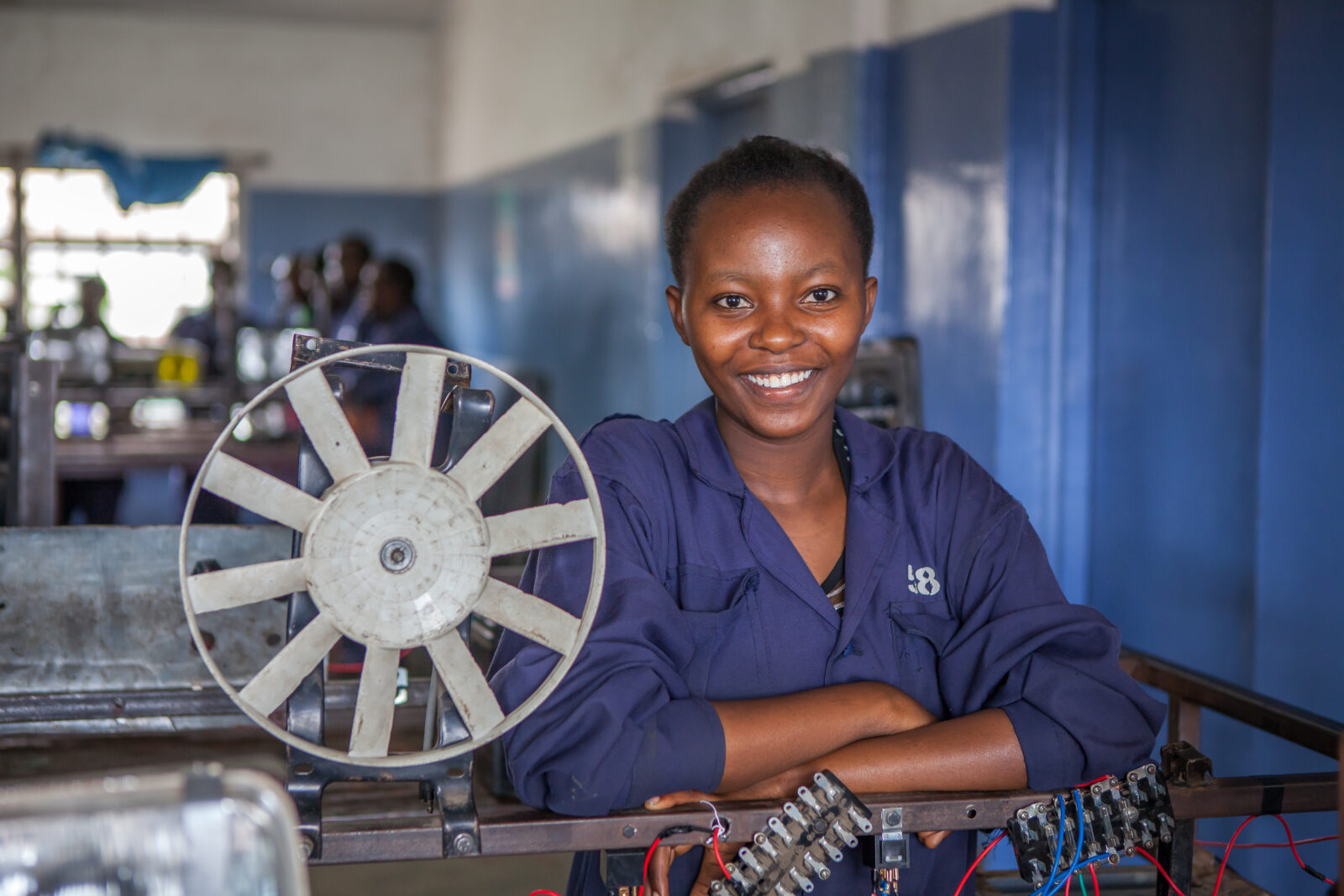
What are our goals for 2025?
9. Outlook

9. Outlook

At Edukans, we strive to make a lasting impact on the lives of millions of children and young people. We are committed to continuing this mission in the years to come. Education is undeniably a driving force behind development through education and learning. To consolidate and enhance our comprehensive programming, we will prioritise scalable initiatives such as building a solid foundation for education through innovation and technology, database analysis, strengthening pre-service training for teachers, and scaling programmes such as Wear the Green Future. By focusing on these initiatives, we aim to maximise our reach and effectiveness, ensuring that resources are allocated where they can have the greatest impact.
Furthermore, we will adopt a strategic, data- and market driven approach to fundraising and build strategic partnerships with corporates, foundations and schools, refining our efforts to align with the renewed E&F strategy.
In 2025, Edukans will define its new multi-annual strategy 2026 – 2028/30, focusing on our evolving role as a leading education expertise organisation. We are committed to responding effectively to global developments and continuing to make a lasting impact.
Through this strategic process, we continue to define Edukans’ future direction, guided by our mission to empower children and young people to realise their full potential.
We believe that through our work Edukans can have a significant impact on the lives of children and young people through quality education.
Together with our partners, staff, and the communities we serve, we will navigate the path towards unleashing the transformative power of education.

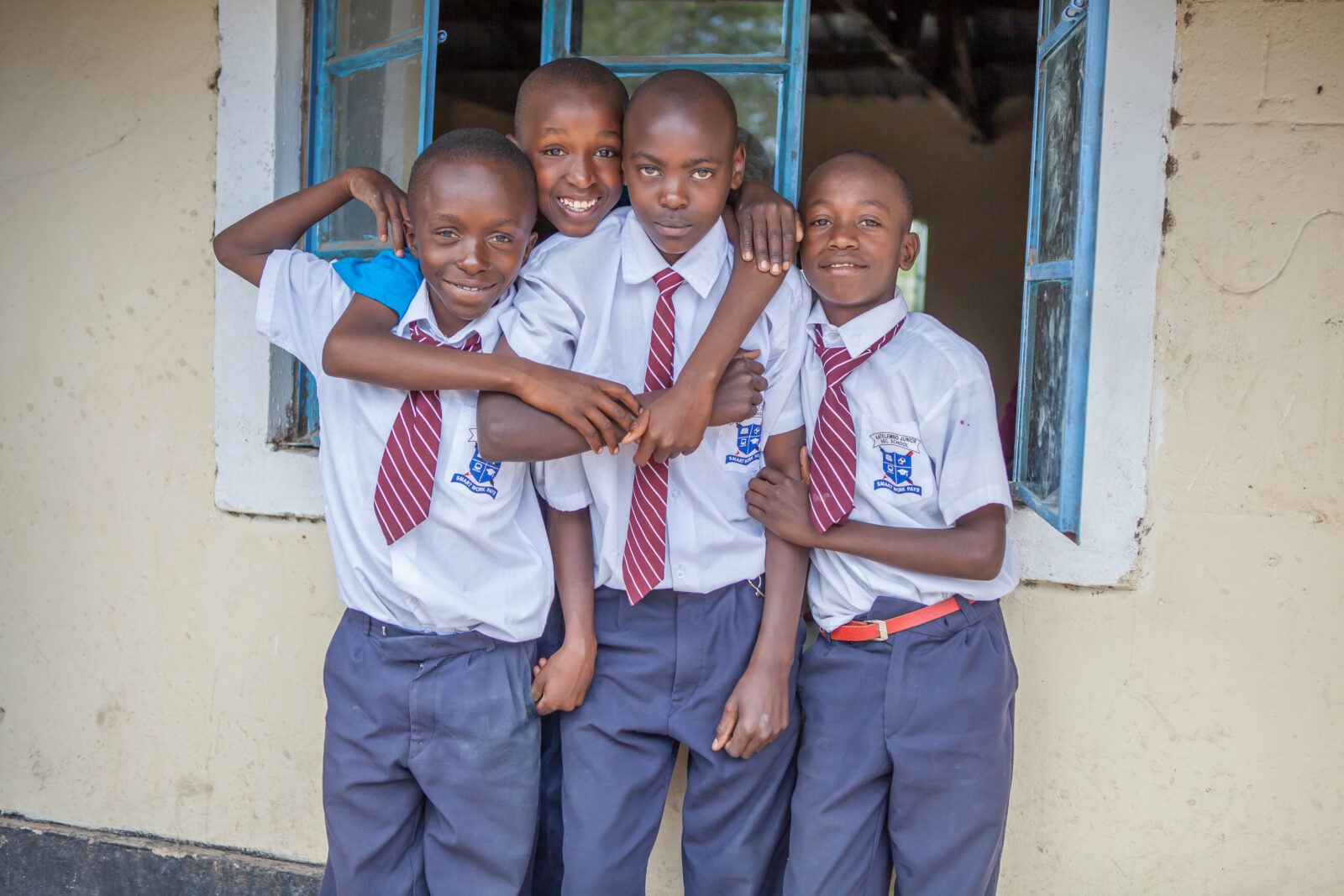
What does our financial statement look like?
Navigate to
- Introduction
- Budget realisation 2024
- Budget 2025
- Financial statements 2024, Edukans Foundation
- Notes on the balance sheet at 31-12-2024
- Notes to the statement of income and expenditure, 2024
- Appendix 1: Project subsidies and contributions per continent and country
- Appendix 2: List of projects 2024 (spending per project)
10. Financial report

10. Financial report

Net result and result distribution
In 2024 Edukans realised a net result on recurring activities of €297,912. A strong improvement on 2023 (-/- €512,040).
This improvement is also reflected in the deficit on the continuity reserve, which in 2024 was €129,554 (compared to €246,551 in 2023). The budgeted deficit on the continuity reserve was €180,678.
The net result for 2024 was distributed to restricted funds (€314,495) and earmarked reserves (€112,941). In 2024 Edukans received a legacy from a couple who were previously personally involved with Edukans’ work. This legacy will be used to strengthen Edukans’ education programmes, starting in Ethiopia. One of our corporate partners supported Edukans with a donation from its foundation. The funds will be used to validate and evaluate our interventions on ‘green education’ and ‘school gardens’.
The tables below provide an overview of the budget realisation of Edukans in 2024, and a comparison of key figures with the previous 3 years.
Budget realisation 2024
| € * 1,000 | |
|---|---|
| Budget | -621 |
| A. Higher income from non-profit organisations | 245 |
| B. Lower income institutional grants | -996 |
| C. Lower other income | -129 |
| D. Lower spending on objective | 1,555 |
| E. Lower fundraising costs and management/administration | 29 |
| F. Higher financial income and expenditure/incidental results | 215 |
| Net result | 298 |
Key figures
| € * 1,000 | 2024 | Budget | 2023 | 2022 | 2021 |
|---|---|---|---|---|---|
| Revenues | 5,832 | 6,712 | 6,460 | 5,914 | 6,904 |
| Spent on objectives | 4,312 | 5,867 | 5,433 | 5,224 | 5,165 |
| Fundraising expenses | 1,023 | 1,205 | 1,201 | 973 | 1,142 |
| Mangement and administration expenses | 463 | 310 | 454 | 362 | 278 |
| Expenditure | 5,798 | 7,382 | 7,088 | 6,559 | 6,585 |
| Net financial income and expenditure | 264 | 50 | 240 | -418 | 78 |
| Incidental results | 0 | 0 | -124 | 0 | 0 |
| Result from participation | 0 | 0 | 0 | 0 | 36 |
| Net result recurring activities | 298 | -620 | -512 | -1,063 | 433 |
| One time gift UnieNzv | 0 | 0 | 0 | 0 | 2,200 |
| Net result | 298 | -620 | -512 | -1,063 | 2,633 |
Income and expenses
In 2024 an amount of €5,831,845 in revenues was generated, a decrease of €627,817 compared to 2023 (-/-9.7%). Below are some notes on the development of Edukans’ income.
- Individual giving increased by 2.9% on 2023, mostly driven by strong income from legacies.
- Income from private profit organisations increased to an amount of €159,539 (up from €85,007). We expect further growth in the coming years.
- Income from lottery organisations is a stable source of income due to the annual contribution of €500,000 from multi annual partnership with the Dutch Postcode Lottery. In 2023 a new contract was signed with the Dutch Postcode Lottery, extending their commitment for a further 5-year period. In 2025 the Dutch Postcode Lottery increased that amount to a standard annual contribution of €600,000.
- In 2024 we also received additional project funding from the Dutch Postcode Lottery, for the amount of €1,990,000. This money is for our flag-ship project “Wear the Green Future” and will be allocated to our annual income in the coming years, according to project spending. For 2024 an amount of €301,794 was allocated.
- The revenue from international grants was lower than in 2023. Edukans is targeting a number of leads with our strategic partners, but the process of transforming those leads into actual revenue takes significantly more time than originally anticipated, meaning that the growth ambition for institutional grants has not yet been realised. Edukans’ income from institutional grants was also affected by the reduction in international donor funding of national governments. This reduction is leading to reductions and delays in both existing and new programs.
- Building on consistent and loyal support from foundations and following a renewed fundraising strategy to engage with new partners Edukans managed to maintain its revenue from non-profit organisations. We expect further growth in the coming years.
Total spending in 2024 was €5,798,656, a decrease of 18,2% as compared to 2023. This decrease largely follows from the reduction in revenue from institutional grants, which resulted in lower spending on our key educational objectives.
Costs percentages
| 2024 | Budget | 2023 | 2022 | 2021 | |
|---|---|---|---|---|---|
| Spending on objectives relative to income | 73.9% | 87.4% | 84.1% | 88.3% | 74.8% |
| Spending on objectives relative to expenditure | 74.4% | 79.5% | 76.7% | 79.6% | 78.4% |
| Costs fundraising relative to income | 17.5% | 18.0% | 18.6% | 16.5% | 16.5% |
| Costs fundraising relative to income excl. grants | 20.5% | 24.8% | 26.0% | 23.4% | 21.4% |
| Costs management & administration relative to expenditure | 8.0% | 4.2% | 6.4% | 5.5% | 4.2% |
Edukans spent €4,312,046 on its core objectives in 2024, 20.6% down on 2023.
Spending ratios
Spending relative to income dropped because certain projects are still under development. The spending on these projects (related to €565,000 in income in 2024) will come in 2025 and 2026.
Spending on objectives relative to expenditure slightly dropped to 74.4% (down from 76.7% in 2023).
Fundraising costs ratio
In 2024, the percentage of the fundraising costs in relation to the income (excluding grants) was 20.5% (down from 26.0% in 2023), which means it costs Edukans 1 euro to raise 5 euros in donations.
Management and administration costs ratio
In 2024 management and administration costs ratio increased to 8.0%, up from 6.4% in 2023. The increase in the ratio was caused by the drop in spending on the objectives, rather than by an increase in costs (costs in 2024 were €463,353, marginally up on 2023).
In June 2024, after evaluation of the interim results, Edukans decided to develop a focused boosting strategy for 12 months, aimed at increasing income and managing expenditure in the short term. In 2025, at the end of the strategic framework 2021-2025, Edukans will redefine the organisation’s management and governance model, with the aim to bringing down this ratio to 5%.
Reserves and funds
| € * 1,000 | 2024 | 2023 | 2022 | 2021 |
|---|---|---|---|---|
| Continuity reserves | 2,491 | 2,621 | 2,764 | 3,472 |
| Earmarked reserves | 917 | 804 | 1,042 | 1,100 |
| Restricted funds | 1,055 | 740 | 767 | 1,064 |
| 4,463 | 4,165 | 4,573 | 5,636 |
Continuity reserves
In 2024 an amount of €129,524 was withdrawn from the continuity reserves, which leaves the reserve at €2,491,136.
Earmarked reserve “Sustainable Borderless Organisation”
An earmarked reserve of €1,100,000 was established in 2022 as part of the Sustainable International Edukans one-time gift from UnieNzv of €2,200,000. This earmarked reserve, referred to as “Sustainable Borderless Organisation”, enables Edukans to invest in developing further as a financially sustainable, innovative and professional civil society organisation.
In 2024 an amount of €127,059 was withdrawn from this reserve. €80,131 in costs were for the annual investments in the further professionalisation of the organisations in Ethiopia, Kenya, Malawi and Uganda. The remaining costs were for one-time activities in support of this process, such as desk studies and fundraising support. In 2025, when preparing the new long-term strategy for the period 2026-2030, it will be decided how investments from this reserve (with a balance of €676,532 per 31 December 2024) will be best aligned with the new strategy.
Earmarked reserve “Green Star School”
In 2024 Edukans received a donation from a corporate partner that will be used to validate and evaluate our interventions on ‘green education’ and ‘school gardens’.
Restricted funds
A balance of €314,495 was added to the various restricted funds that have been built over the previous years. In 2024 €803,543 was received in new funding, and €489,048 was spent on the project activities related to these funds.
The total amount in the restricted funds per 31 December 2024 was €1,054,505.
Budget 2025
| Incoming revenues | € * 1,000 |
|---|---|
| Individual giving | 2,975 |
| For profit organisations | 150 |
| Lottery organisations | 1,388 |
| Institutional Grants | 1,947 |
| Other non-profit organisations | 1,005 |
| Total revenues | 7,466 |
| Spend on objectives | |
| Basic Education | 2,372 |
| Education in Emergencies | 849 |
| Skills for Work | 1,846 |
| Capacity-building | 234 |
| Exchange programmes | 18 |
| Information activity | 870 |
| Total spend on objectives | 6,189 |
| Fundraising expenses | 1,566 |
| Management and administration expenses | 403 |
| Total expenditure | 8,157 |
| Result before financial income and expenditures | -691 |
| Financial result investments | 100 |
| Net result | -591 |
In 2025 the total anticipated income is €7,466,000, an increase of 28.8% compared to 2024. This increase will come from the allocation of the project funding received from Dutch Postcode Lottery (estimated at €850,000 in 2025). Edukans also expects to sign the multi-annual partnership with the Mastercard Foundation for a 5-year programme in Uganda (total value USD 4,5 million). The estimated income from the programme in 2025 is €800,000.
An amount of €95,900 from the continuity reserve will be used to fund part of the operational costs, and a budget of €194,300 will be made available from the earmarked reserves. Furthermore, €301,200 will be made available from the restricted funds in 2025.
Multi-annual forecast
2025 marks the last year of our current 5-year strategy. In the course of 2025, the new strategy will be developed. Following the strengthening of the organisation during 2024, the validation of our learning methodologies, and the investments we will make in our fundraising capacity and methodologies in 2025, we anticipate a modest further growth in revenue.
The strengthening of the organisation, combined with the validation of our methodologies, will increase our capacity te secure more, larger and longer-term institutional funding projects. This will not only lead to a growth in revenue, but also to a better cost recovery.
We expect the investments in our fundraising capacity and methodology to lead to a growth in revenue of 4-5% annually on our fundraising from private donors and foundations, based on modest projections. In more ambitious projections a growth of 8-10% is possible.
In our current five-year strategy, we are working towards a more programmatic approach through long-term strategic partnerships, resulting in more substantive and multi-year programmes which is a driver for modest growth.
FINANCIAL STATEMENTS 2024, EDUKANS FOUNDATION
Balance sheet at 31 December 2024 (after result appropriation)
| ASSETS | Ref. | 31 December 2024 | 31 December 2023 | ||
|---|---|---|---|---|---|
| Fixed assets | |||||
| - Intangible fixed assets | 1 | 0 | 336 | ||
| - Tangible fixed assets | 2 | 98,322 | 96,971 | ||
| 98,322 | 97,307 | ||||
| Current assets | |||||
| Receivables | 3 | 253,549 | 572,726 | ||
| Investments | 4 | 3,043,251 | 2,838,402 | ||
| Cash | 5 | 3,912,668 | 1,901,390 | ||
| 7,209,468 | 5,312,518 | ||||
| Total assets | 7,307,790 | 5,409,825 | |||
| LIABILITIES | Ref. | 31 December 2024 | 31 December 2023 | ||
| Reserves and funds | 6 | ||||
| Reserves | |||||
| - Continuity reserves | 2,491,136 | 2,620,660 | |||
| - Earmarked reserves | 916,532 | 803,591 | |||
| 3,407,668 | 3,424,251 | ||||
| Funds | |||||
| - Restricted funds | 1,054,505 | 740,010 | |||
| 4,462,173 | 4,164,261 | ||||
| Provisions | 7 | 64,647 | 141,642 | ||
| Short term liabilities | 8 | 2,780,970 | 1,103,922 | ||
| Total liabilities | 7,307,790 | 5,409,825 |
Statement of income and expenditure, 2024
| Ref. | Actual 2024 | Budget 2024 | Actual 2023 | |
|---|---|---|---|---|
| Incoming revenues | 9 | |||
| Individual giving | 2,968,034 | 3,206,000 | 2,883,432 | |
| For profit organisations | 159,539 | 125,000 | 85,007 | |
| Lottery organisations - multi annual partnership | 500,000 | 500,000 | 500,000 | |
| Lottery organisations - project funding | 301,794 | 227,417 | 0 | |
| Institutional Grants | 852,096 | 1,848,275 | 1,836,837 | |
| Other non-profit organisations | 1,050,382 | 805,000 | 1,154,387 | |
| Total revenues | 5,831,845 | 6,711,692 | 6,459,662 | |
| Spent on objectives | 10 | |||
| A. Basic education | 961,663 | 1,426,354 | 1,437,059 | |
| B. Education in Emergencies | 1,331,804 | 755,920 | 1,688,917 | |
| C. Skills for Work | 1,091,535 | 1,716,939 | 971,218 | |
| D. Capacity-building | 103,099 | 797,508 | 257,094 | |
| E. Exchange programmes for teachers and students | 60,192 | 263,226 | 416,025 | |
| F. Information activity | 763,753 | 906,763 | 662,395 | |
| Total spent on objectives | 4,312,046 | 5,866,709 | 5,432,708 | |
| G. Fundraising expenses | 1,023,257 | 1,205,210 | 1,200,694 | |
| H. Management and administration expenses | 463,353 | 310,451 | 454,125 | |
| Total expenditure | 5,798,656 | 7,382,370 | 7,087,527 | |
| Result before other income and expenditure | 33,189 | -670,678 | -627,865 | |
| Incidental results | 11 | 0 | 0 | -124,000 |
| Financial result investments | 12 | 211,773 | 50,000 | 222,144 |
| Interest | 13 | 52,950 | 0 | 17,681 |
| Net result | 297,912 | -620,678 | -512,040 | |
| Additions to/withdrawls from: | ||||
| Continuity reserve | -129,524 | -180,678 | -246,551 | |
| Earmarked reserves | 112,941 | -290,000 | -238,108 | |
| Restricted funds | 314,495 | -150,000 | -27,381 | |
| 297,912 | -620,278 | -512,040 | ||
Cashflow statement 2024
| 2024 | 2023 | |
|---|---|---|
| Cashflow from operating activities | ||
| Result before financial income and expenses | 33,189 | -627,865 |
| Adjustments for: | ||
| - Depreciation (in)tangible fixed assets | 27,810 | 57,164 |
| - Change in provisions | -52,931 | -6,095 |
| -25,121 | 51,069 | |
| Movements in working capital | ||
| - Change in current assets | 319,177 | -238,210 |
| - Change in current liabilities | 1,677,048 | -400,786 |
| 1,966,225 | -638,996 | |
| Cash generated from operations | 2,004,293 | -1,091,794 |
| Interest received | 52,950 | 0 |
| Net cash generated from operating activities | 2,057,243 | -1,091,794 |
| Cashflow from investing activities | ||
| Investments in (in)tangible fixed assets | -50,267 | -27,735 |
| Incidental results | 0 | -124 |
| (Un)realized gains and losses on investments | 211,773 | 239,824 |
| Repayment of share in participation | 0 | 0 |
| Cashflow from financing activities | ||
| none | 0 | 0 |
| Net cashflow | 2,218,749 | -1,003,703 |
| Additional from new consolidated per 1 January | 0 | 321,510 |
| Currency exchange difference | -2,623 | 17,289 |
| Change in cash and cash equivalents | 2,216,126 | -664,904 |
| Cash, investments and cash equivalents at beginning of period | 4,739,793 | 5,404,696 |
| Change in cash and cash equivalents | 2,216,126 | -664,904 |
| Cash, investments and cash equivalents at end of period | 6,955,919 | 4,739,792 |
| The cashflow statement was prepared using the indirect method. |
General explanatory notes and accounting principles
General
Activities
The Edukans Foundation, which was founded in 2002, has its registered office in Amersfoort and is registered at the Chamber of Commerce of the Netherlands (no. 32092131).
The foundation has two objectives:
a) Access to education and the quality of education in developing countries
b) Involving the Dutch public and in particular the educational sector in the Netherlands with this mission
and beyond this, everything that directly or indirectly relates to this or can be conducive to this, in the broadest sense of the word.
Consolidation
Since 2023 the Edukans Foundation Ethiopia, Kenya, Malawi and Uganda financial statements are included in the consolidated financial statements.
Continuity
The annual accounts have been prepared on a going concern basis.
Accounting principles for valuation of assets and liabilities and revenue recognition
The financial statements have been drawn up in conformity with the guidelines for financial reporting by fundraising organisations (RJ 650) provided by the Dutch Council for Accounting Standards (Raad voor de Jaarverslaggeving). In general, assets and liabilities have been valued at acquisition price. If no specific accounting principle is mentioned, valuation has been made at acquisition price. The actual rate differences on stocks (bonds and shares) and foreign currencies have been processed directly in the statement of income and expenditure. Income and expenditures are allocated to the year to which they relate and/or have been granted to third parties.
Estimates
In order to be able to apply the principles and rules for preparing the annual accounts, it is necessary for the management of Edukans to evaluate various matters and make estimates that can affect the amounts recorded in the financial statements. If it proves necessary, to provide the insight described in Art. 2:362 paragraph 1 of the Dutch Civil Code, the nature of these opinions and estimates, including the underlying assumptions, are described in the related notes to the financial statements.
Functional and presentation currency
The entries in the financial statements have been valued in accordance with the currency of the economic environment in which Edukans mainly operates (functional currency). The annual accounts have been prepared in euros; the euro is both the functional and the presentation currency of Edukans.
Amounts in foreign currencies are converted into euros at the rates of exchange applicable at the balance sheet date. Transactions denominated in foreign currencies are converted at the rates of exchange applicable at the time of the transaction. The average rate for the current financial year is applied.
Any resulting exchange differences are taken into account in the statement of income and expenditure.
Financial instruments
‘Financial instruments’ is understood to mean both primary financial instruments such as receivables and debts, and financial derivatives. For the principles underlying the primary financial instruments, reference is made to the treatment of each balance sheet item.
VALUATION PRINCIPLES FOR THE BALANCE SHEET
Intangible and tangible fixed assets
Software and other inventory and operating assets are valued at historical cost or manufacturingprice including directly attributable expenditure, less straight-line depreciation over their estimateduseful lives and impairment losses.
Financial fixed assets
A historical cost-based accounting system has been used. In general, assets and liabilities have been valued at acquisition price.
Participations (associates), over which significant influence can be exercised, are valued according to the net asset value method. The net asset value is calculated in accordance with the accounting principles that apply for these financial statements; regarding participations in which insufficient data is available for adopting these principles, the valuation principles of the respective participationare applied. If the valuation of an associate based on the net asset value is negative, it will be stated at nil. If and in sofar as the Edukans Foundation can be held fully or partially liable for the debts of the associate or has the firm intention of enabling the participation to settle its debts, a provision is recognised for this.
Receivables
Receivables have been recorded at fair value and thereafter at amortised cost, after deduction of the necessary provisions for the risk of non-payment.
Investments
Investments (bond and share funds) are measured at fair value. Changes in value and transaction costs are noted in income and expenditure.
Provisions
Provisions are made for legally enforceable or actual liabilities existing on the accounting date, which are likely to entail an outflow of resources, the size of which can be estimated in a reliable manner.
Debts
In the initial accounting, debts have been valued at fair value. Transaction costs that are directly attributable to the acquisition of debts have been included in the valuation in the initial accounting. After the initial accounting, debts have been valued at the amortised cost, being the amount received taking into account the premium or discount and after deduction of the transaction costs.
ACCOUNTING PRINCIPLES FOR REVENUE RECOGNITION
General
The balance (result) is defined as the difference between total income and total expenditure. The revenues are accounted for in the year in which they are realised; expenses are accounted for as soon as they are foreseeable. Income that is received in the form of goods or services is valued at fair value, to the extent that this can be determined. In such cases, this income is included in the statement of income and expenditure.
Revenues that are designated for a particular purpose have been incorporated into the statement of income and expenditure; if these revenues are not spent in full in the year under review, the unspent funds are included in the relevant earmarked reserve or restricted fund, respectively. A withdrawal from an earmarked reserve or restricted fund is recorded as an expense in the statement of income and expenditure.
Expenses are determined on a historical basis and assigned to the year under review to which they relate.
Gifts
Gifts are accounted for in the year in which a specific campaign was held, or – if no specific campaign took place – in the year in which the gift was received.
Legacies
Revenues from legacies are accounted for in the financial year if a deed of partition is available per balance date. Payments in the form of advances are accounted for in the financial year of receipt.
Government subsidies and other grants
Subsidies from governments, municipalities, etc., that are received to carry out projects or programmes, whereby the subsidy-provider acts as a financer or co-financer, have been accounted for separately in the income statement. Operating grants are accounted for as income in the statement of income and expenditure in the year in which the subsidised costs are incurred or revenues foregone, or when a subsidised operating deficit occurs. The income is accounted for if it is likely to be received and if the foundation can demonstrate the conditions for receipt.
Fundraising expenses
The costs of Edukans’ own fundraising are allocated per cost item and personnel costs on the basis of the estimated number of hours spent. Other expenses – including housing costs – are likewise attributed to the objectives based on the actual time spent by staff.
Implementation costs of own organisation
The implementation costs of the organisation are allocated per cost item and personnel costs based on estimated hours spent. The implementation costs of the organisation are divided on the basis of the amount of time spent by staff members.
Management and administration expenses
According to Guideline 650 of the Dutch Council for Accounting Standards, the statement of income and expenditure should include a separate line about management and administration costs. The management chose the model attribution method provided by Goede Doelen Nederland. The management and administration expenses are expressed as a percentage of total expenditure. The management set a target of 5% as the maximum norm for management and administration expenses.
Pensions
The Edukans Foundation has placed all employee pension schemes with the PFZW pension fund, based on the standard PFZW pension scheme (average pay scheme). Guideline 271 offers the possibility of treating this scheme as a defined contribution scheme, because:
a) the foundation is affiliated with a sectoral pension fund (PFZW) and uses the same pension scheme as other legal entities.
b) the foundation is under no obligation to make supplementary contributions, there being no rise in future premiums in the event of a deficit at PFZW.
The PFZW (pre-) pension scheme satisfies both conditions. The scheme may therefore be treated as a defined contribution scheme under RJ 271. This means that the premium invoices from PFZW have been accounted for under pension expenses and the outstanding part of the premiums under short-term liabilities.
Staff remuneration
Periodic payable remuneration such as salaries and social security expenses has been included in the statement of income and expenditure on the basis of the terms of employment, to the extent that this is owed to employees. Edukans foundation adheres to the collective labour terms and conditions of PKN.
ACCOUNTING PRINCIPLES FOR THE CASHFLOW STATEMENT
The funds in the cashflow statement consist of cash and floating stocks. The stocks can be seen as highly liquid assets. Cashflow in foreign currency has been valued at the transaction rate.
NOTES ON THE BALANCE SHEET AT 31 DECEMBER 2024
01. Intangible fixed assets
| 2024 | 2023 | |
|---|---|---|
| Software | ||
| Cost | 88,253 | 88,253 |
| Accumulated depreciation | 87,917 | 71,133 |
| Balance as of 1 January | 336 | 17,120 |
| Purchases | 0 | 0 |
| Depreciation | -336 | -16,784 |
| -336 | -16,784 | |
| Cost | 88,253 | 88,253 |
| Accumulated depreciation | 88,253 | 87,917 |
| Balance as of 31 December | 0 | 336 |
| The depreciation rate is 20% per year. | ||
02. Tangible fixed assets
| 2024 | 2023 | |
|---|---|---|
| Inventory and other operating assets | ||
| Cost | 469,774 | 412,136 |
| Accumulated depreciation | 372,804 | 315,628 |
| Balance as of 1 January | 96,971 | 96,508 |
| New consolidated Kenya, Malawi and Uganda | ||
| Cost | 0 | 32,213 |
| Accumulated depreciation | 0 | 16,796 |
| 0 | 15,417 | |
| Cost | 469,774 | 444,349 |
| Accumulated depreciation | 372,804 | 332,424 |
| Corrected balance as of 1 January | 96,971 | 111,925 |
| Purchases | 50,267 | 27,735 |
| Currency exchange difference | -21,441 | -2,310 |
| Depreciation | -27,475 | -40,380 |
| 1,351 | -14,954 | |
| Cost | 498,600 | 469,775 |
| Accumulated depreciation | 400,278 | 372,804 |
| Balance as of 31 December | 98,322 | 96,971 |
| The depreciation rate is 20% per year. | ||
03. Receivables
| 31 December 2024 | 31 December 2023 | |
|---|---|---|
| Accounts receivables | 5,757 | 18,422 |
| Prepaid expenses programmes | 130,368 | 130,368 |
| Outstanding grants | 12,002 | 265,933 |
| Other | 105,422 | 158,003 |
| 253,549 | 572,726 |
For ‘Accounts receivables’, a provision for doubtful debts is not necessary.
Prepaid expenses programmes mainly contain expenses for programmes which will be implemented in 2025.
04. Investments
| 2024 | 2023 | |
|---|---|---|
| Insinger Gilissen - Share fund | ||
| Balance as of January 1 | 923,857 | 821,954 |
| Purchases | 0 | 0 |
| (Un) realised gains and losses | 147,510 | 101,903 |
| Balance as of December 31 | 1,071,367 | 923,857 |
| As of 31 December 2024, this portfolio consisted of 825 units with a price of €1.298,63 per share. | ||
| Insinger Gilissen - Dynamic Fixed Income fund | ||
| Balance as of January 1 | 1,914,545 | 1,791,130 |
| Purchases | 0 | 0 |
| (Un) realised gains and losses | 57,339 | 123,415 |
| Balance as of December 31 | 1,971,884 | 1,914,545 |
| As of 31 December 2024, this portfolio consisted of 2,708 units with a price of €728,17 per share. | ||
| 3,043,251 | 2,838,402 |
Edukans selected Insinger Gillisen as their asset manager. The asset manager is instructed to invest following a defensive green sustainable profile.
The investment mix in fixed income (bonds) and shares is 70% fixed income and 30% shares, with a bandwidth of 10%.
05. Cash
| 31 December 2024 | 31 December 2023 | |
|---|---|---|
| Bank accounts (Edukans Netherlands) | 3,447,238 | 1,617,036 |
| Bank accounts (Edukans Country Offices) | 465,430 | 284,354 |
| 3,912,668 | 1,901,390 |
Cash and bank comprise the cash and bank balances of the Edukans office in Amersfoort as well of the Country Offices in the four focus countries.
06.1 Reserves and funds
| Continuity reserves | Earmarked reserves | Restricted Funds | Total | |
|---|---|---|---|---|
| Balance as of 1 January 2024 | 2,620,660 | 803,591 | 740,010 | 4,164,261 |
| Added | 0 | 240,000 | 803,543 | 1,043,543 |
| Withdrawn | -129,524 | -127,059 | -489,048 | -745,631 |
| Balance as of 31 December 2024 | 2,491,136 | 916,532 | 1,054,505 | 4,462,173 |
Continuity reserves
As a precautionary measure, the Edukans Foundation maintains a continuity reserve to cover setbacks in revenues and costs for a calculable period (short-term risks). Such setbacks can result from harm to the organisation’s image, for example, the short-term effects of financial crises, the loss of major donor partners or seasonal factors. Goede Doelen Nederland has set a norm for the continuity reserve of a maximum of 1.5 times the annual expenses of the work organisation. Based on the costs in 2024, the maximum continuity reserve is €5,965,265. The size of Edukans’ continuity reserve is 62.6% of the annual organisational costs (base year 2024). Management considers this sufficient for the short term, in view of expected developments in relation to both revenues and expenditure.
06.2 Earmarked reserves
| Earmarked reserves | Balance as of 1 January 2024 | Added | Withdrawn | Balance as of 31 December 2024 |
|---|---|---|---|---|
| Sustainable international Edukans | 803,591 | 0 | -127,059 | 676,532 |
| Green Star School Fund | 0 | 240,000 | 0 | 240,000 |
| 803,591 | 240,000 | -127,059 | 916,532 | |
Earmarked reserves
Funds that have been allocated by Edukans for specific activities are accounted for through earmarked reserves. The two reserves are described below.
Sustainable International Edukans
Edukans decided to create an earmarked reserve to invest in the development of an impactful and financially sustainable international organisation. This requires further professionalisation and boosting capacity at regional and national level in our countries of operation.
Green Star School Fund
In 2024 Edukans received a donation from a corporate partner that will be used to validate and evaluate our interventions on ‘green education’ and ‘school gardens’.
06.3 Restricted funds
| Restricted funds | Balance as of 1 January 2024 | Added | Withdrawn | Balance as of 31 December 2024 |
|---|---|---|---|---|
| Emergency aid | 86,626 | 1,577 | 10,000 | 78,203 |
| DARE2GO educational exchanges | 224,015 | 13,015 | 56,542 | 180,488 |
| Teaching with Impact | 81,924 | 1,410 | 26,332 | 57,002 |
| UNICEF Ethiopia | 57,893 | 46,065 | 2,100 | 101,858 |
| Basic education Kenya | 109,656 | 0 | 99,801 | 9,855 |
| Skills and Employment AFAS | 27,729 | 116,607 | 109,836 | 34,500 |
| Sustaining Lives and Education Ethiopia | 51,045 | 3,558 | 40,645 | 13,958 |
| Ethiopia Greening Schools and Communities | 36,329 | 48,025 | 23,883 | 60,471 |
| Rural Youth Ghana Tony Chocolonely | 25,774 | 96,822 | 63,044 | 59,552 |
| Legacy Fund | 0 | 325,000 | 0 | 325,000 |
| Other restricted funds | 39,019 | 151,464 | 56,865 | 133,617 |
| 740,010 | 803,543 | 489,048 | 1,054,505 |
Restricted funds
Gifts received for a specific purpose are accounted for through restricted funds. Major funds are described below.
Emergency aid
In 2022, a campaign was held for emergency aid in Ethiopia due to the drought. These donations were added to the Emergency aid fund, some of which has been spent on this objective and further spending will take place in 2025.
DARE2GO educational exchanges
In 2016, Edukans decided to take over the exchange programme previously provided by Youth and Mission under the brand name DARE2GO. Edukans recovered €400,000 in 2016. As of 1 January 2024, an amount of €224,015 remained. The fund will be invested in the development of new exchange programmes. Fundraising continues, with €13,015 in new funds received in 2024. As of 1 January 2025, an amount of €180,488 remained.
Teaching with Impact
The EDU Active Learning Project uses a learning resource (Correctbook) that helps learners to practice basic skills (e.g. in writing, maths, art) and carry out application and problem-solving tasks individually and together. It provides new opportunities to train teachers and reach learners at STAR schools, reach new schools, offer third parties a partnership possibility and practice training on digital platforms. Several projects have been completed and new projects related to the EDU Active Learning Project will be rolled out in 2025.
UNICEF Ethiopia
Edukans started raising funds to finance the improvement of access to safe and protective education for displaced boys and girls in Afar. UNICEF is an important cooperation partner in Ethiopia. For UNICEF projects, own contributions are raised from donors in the Netherlands. As soon as the projects are implemented, the raised contribution is transferred to the projects in Ethiopia.
Basic education Kenya
Edukans received a legacy in December 2021, to be spent on basic education in Kenya. Another amount was received from this same legacy in 2022. An implementing programme started in 2022, and this will be completed in 2025.
Skills and Employment AFAS
AFAS Foundation supports the Skills and Employment project which involves strengthening and increasing the capacity of TVETs in providing value-based, quality, market-oriented, relevant skills training to young people. The long-term impact of this project is to improve the productivity and employability of graduates of TVETs in the Kenyan labour market. This project started in 2022 and will continue to be implemented in the coming years.
Sustaining Lives and Education Ethiopia
Edukans launched a crowdfunding campaign to supply drink water, meals, and school supplies in the regions in Ethiopia that have been heavily affected by extreme drought and the war in Tigray. The programme is expected to continue to run for the coming years.
Ethiopia Greening Schools and Communities
Funded by several foundations Edukans offers education to refugees in the north of Ethiopia. The programme, which involves ‘greening’ the environment, aims to make young people and their families aware of the importance of fruit and vegetables. A curriculum on climate change has been put together to raise awareness amongst the children and within the communities affected and help them with measures to combat the effects of climate change. The programme will continue until 2026.
Rural Youth Ghana Chocolonely Foundation
Funded by the Chocolonely Foundation, Edukans started a project that aims to improve education and strengthen the position of girls, who often drop out of school and face early marriages and pregnancies. This programme is set to run until 2025.
Legacy Fund
This fund was formed in 2024 from a legacy received from a couple who were previously personally involved with Edukans’ work. It will be used to strengthen Edukans’ education programmes, starting in Ethiopia.
07.1 Provisions for employees
| 2024 | 2023 | |
|---|---|---|
| Provision for employee benefits | ||
| Balance as of 1 January | 17,642 | 23,737 |
| Withdrawn | 2,499 | 6,095 |
| Balance as of 31 December | 15,143 | 17,642 |
This provision is intended to cover expenses arising from obligations in collective labour agreements (CAOs) for staff anniversaries. The provision for anniversaries is recorded as the cash value of the expected payments during the period of employment. No interest is added to the provision.
07.2 Provision integrity issue
| 2024 | 2023 | |
|---|---|---|
| Provision integrity issue | ||
| Balance as of 1 January | 124,000 | 0 |
| Added | 0 | 124,000 |
| Withdrawn | -74,496 | 0 |
| Balance as of 31 December | 49,504 | 124,000 |
This provision is intended to cover the direct costs of an integrity issue in one of our country offices. In addition to the direct costs, amounts are included for investigation of the issue, as well as legal advice. In 2024 expenses were made related to this, and these have been charged to this provision. Further expenses will be incurred in 2025.
08.1 Short term liabilities
| 31 December 2024 | 31 December 2023 | |
|---|---|---|
| Project obligations | 130,365 | 130,365 |
| Amounts received in advance National Postcode Lottery | 1,688,206 | 0 |
| Personnel expenses | 282,988 | 309,368 |
| Suppliers and trade credits | 241,767 | 166,748 |
| Prepaid amounts international grants | 386,581 | 403,118 |
| Other liabilities | 51,062 | 94,324 |
| 2,780,970 | 1,103,922 | |
Prepaid amounts international grants represent received grants for defined projects which continue in 2024. The grants are mainly received from International World Wide (€215,218) and UNHCR Ethiopia (€46,997).
The changes in liabilities for education projects and development cooperation can be summarised as follows:
08.2 Project obligations
| 2024 | 2023 | |
|---|---|---|
| Obligation as at 1 January | 130,365 | 264,053 |
| Commitments in the accounting year | 2,315,973 | 3,455,001 |
| Expired projects | 0 | 0 |
| Payments and credit transfers | -2,315,973 | -3,588,689 |
| Obligation as at 31 December | 130,365 | 130,365 |
The commitments during the year are the contractual commitments entered into during the year. The payments are the payments made relating to commitments.
08.3 Obligations not included in the balance sheet
| 2025 | 2026 | 2027 | Total | |
|---|---|---|---|---|
| Projects development cooperation | 724,993 | 47,250 | 0 | 772,243 |
| Lease Edukans Office Amersfoort | 76,916 | 75,704 | 75,704 | 228,324 |
| 801,909 | 122,954 | 75,704 | 1,000,567 | |
The amount ‘projects development cooperation’ of €772,243 represents conditionally committed funds by international partners for the coming years.
Edukans has a total lease obligation for the office in Amersfoort of €228,324 for the coming 3 years.
NOTES TO THE STATEMENT OF INCOME AND EXPENDITURE, 2024
Incoming revenues
In 2024 an amount of €5,831,845 in revenues were generated, a decrease of €627,817 compared to 2023 (-/- 9.7%).
Revenues from individual giving consist of €2,499,012 of donations and gifts and €469,023 of legacies.
Lottery organisations
The income from Lottery organisations concerns the donation from multi annual partnership with the National Postcode Lottery of the Netherlands. In addition, in 2024 Edukans received additional project funding of €1,990,000, from which an amount of €301,794 was spent on the Wear the Green Future project.
09.1 Institutional grants can be itemised as follows:
| 2024 | 2023 | |
|---|---|---|
| UNICEF | 225,325 | 1,319,751 |
| Enabel | 151,204 | 294,259 |
| UNHCR | 306,857 | 140,149 |
| ILO | 17,102 | 14,092 |
| Imagine World Wide | 77,720 | 0 |
| Nuffic | 0 | 19,770 |
| Other Institutional fundraising | 73,887 | 48,816 |
| 852,096 | 1,836,837 |
In 2024, opportunities for securing educational funding through institutional fundraising were limited. Furthermore, the process of converting leads into revenue and working together with strategic partners, takes significantly more time than originally anticipated. Also, in 2024 Edukans’ revenue was affected by the reduction of international donor funding, leading to reductions/delays of both existing and new programmes. Edukans is forging strategic partnerships to effectively transform this trend in a positive direction.
09.2 Other non-profit organisations
| 2024 | 2023 | |
|---|---|---|
| Schools | 80,275 | 181,553 |
| Private charitable foundations | 840,893 | 680,060 |
| Churches | 119,008 | 121,573 |
| Other non-profit organisations | 10,206 | 171,201 |
| 1,050,382 | 1,154,387 | |
10.1 Spent on objectives, fundraising and management and administration expenses
| Basic Education | Education in Emergencies | Skills for Work and Life | Capacity building | Exchange programmes | Information activity | Spent on objectives | |
|---|---|---|---|---|---|---|---|
| (Project) subsidies granted and (project) contributions | 128,572 | 135,216 | 46,512 | -82,067 | 0 | 0 | 228,233 |
| Direct project expenses | 178,617 | 736,66 | 321,028 | 3,372 | -3,084 | 0 | 1,236,593 |
| Communication expenses | 3,657 | 530 | 6,601 | 13,967 | 14,020 | 311,957 | 350,732 |
| Personnel expenses | 537,954 | 338,453 | 562,372 | 101,620 | 28,534 | 376,462 | 1,945,395 |
| Housing expenses | 27,572 | 36,832 | 45,076 | 14,744 | 5,814 | 21,820 | 151,858 |
| Office and general expenses | 78,871 | 75,935 | 103,392 | 51,463 | 13,960 | 50,093 | 373,714 |
| Depreciation | 6,420 | 8,178 | 6,554 | 0 | 948 | 3,420 | 25,520 |
| Total expenses | 961,663 | 1,331,804 | 1,091,535 | 103,099 | 60,192 | 763,752 | 4,4312,045 |
| Spent on objectives | Fundraising | Management & administration | Actual total 2024 | Budget 2024 | Actual total 2023 | ||
| (Project) subsidies granted and (project) contributions | 228,233 | 0 | 0 | 228,233 | 567,508 | 1,922,330 | |
| Direct project expenses | 1,236,593 | 0 | 6,256 | 1,242,849 | 2,952,930 | 792,507 | |
| Coomunication expenses | 350,732 | 501,399 | 0 | 852,131 | 1,238,500 | 989,038 | |
| Personnel expenses | 1,945,395 | 431,795 | 386,077 | 2,763,267 | 2,145,432 | 2,588,685 | |
| Housing expenses | 151,858 | 26,087 | 11,229 | 189,174 | 139,000 | 209,871 | |
| Office and general expenses | 373,714 | 59,888 | 53,916 | 487,518 | 317,000 | 527,031 | |
| Depreciation | 25,520 | 4,088 | 5,875 | 35,483 | 22,000 | 58,069 | |
| Total expenses | 4,4312,045 | 1,023,257 | 463,353 | 5,798,655 | 7,382,370 | 7,087,531 |
The salaries, social security expenses, pension expenses and other staff costs have been allocated in accordance with the estimated hours spent. The direct project expenses consist of expenses that are directly attributable to the objectives (including materials and travel costs). The other costs are likewise attributed to the objectives in accordance with the estimated time spent by the staff.
(Project) subsidies granted and (project) contributions
Elsewhere in the annual report, we explain how we achieved our objectives and what this entailed.
Direct project expenses (for example materials, travel expenses) are those spent on objectives.
10.2 Communication expenses
| 2024 | 2023 | |
|---|---|---|
| Communication and information | 44,838 | 78,827 |
| Fundraising costs for companies, churches, trust funds | 9,135 | 53,630 |
| Fundraising costs for individual giving | 734,272 | 766,304 |
| Fundraising costs for Exchange | 0 | 4,889 |
| Fundraising costs for innovations | 23,734 | 9,923 |
| Communication for Business Development | 24,808 | 41,534 |
| Internationalisation | 15,344 | 33,931 |
| 852,131 | 989,038 |
The communication expenses cover items such as leaflets, posters and other printed matter, but also public campaigns, the website and Edukans’ WIJS! magazine. This allows us to inform our donors, supporters and partners about our results.
10.3 Personnel expenses
| 2024 | 2023 | |
|---|---|---|
| Salaries | 2,192,883 | 1,952,629 |
| Social security expenses | 383,008 | 331,458 |
| Pension expenses | 210,481 | 187,176 |
| Internal occupational schemes | 94,124 | 301,272 |
| Personnel costs in projects | -159,959 | -238,056 |
| Travel expenses | 42,730 | 54,208 |
| 2,763,267 | 2,588,685 | |
10.4 Number of FTEs
| Edukans Netherlands | 2024 | 2023 |
|---|---|---|
| Program development | 14.1 | 14.1 |
| Fundraising | 4.0 | 5.2 |
| Management and administration expenses | 2.5 | 2.1 |
| Total | 20.6 | 21.4 |
| Edukans Focus Countries | ||
| Program development | 30.3 | 32.3 |
| Fundraising | 1.0 | 1.5 |
| Management and administration expenses | 6.9 | 7.5 |
| Total Edukans Focus Countries | 38.2 | 41.3 |
| Total Edukans | 58.8 | 62.7 |
In order to allocate the management and administration expenses, the management of Edukans selected the model provided by Goede Doelen Nederland. This model states that expenses that are not directly attributable to the objectives fall under ‘management and administration’. The costs of the director of Edukans, ICT and human resource management have been attributed proportionally to the objectives and to ‘management and administration’. The following overview shows in percentages the extent to which the cost types have been attributed to ‘management and administration’:
10.5 Cost type
| Management and | Management and | |
|---|---|---|
| administration 2024 % | administration 2023 % | |
| Supervisory Board | 11.1 | 12.0 |
| Managing director of Edukans | 11.1 | 12.0 |
| Finance and control | 100.0 | 100.0 |
| ICT | 11.1 | 12.0 |
| Human Resource management | 11.1 | 12.0 |
| Housing | 11.1 | 12.0 |
10.6 Director’s salary
| Name | P.M. van Haren |
|---|---|
| Fuction | Managing director |
| Employment | |
| Nature (duration) | permanent |
| Hours per week | 36 |
| Part-time percentage | 100 |
| Period | 1/1-31/12 |
| Renumeration (in euros) | |
| Annual income | |
| gross earnings/salary | 106,658 |
| Holiday bonus | 8,373 |
| End-of-year bonus | 8,687 |
| Total GDN annual income | 123,718 |
| Social security contributions | 13,273 |
| Taxable fee/additions | 1,303 |
| Pension costs (employer's share) | 15,436 |
| Total 2024 | 153,729 |
| Total 2023 | 141,842 |
The salary of the director of Edukans is in conformity with the Dutch Civil Servants’ Pay Decree (BBRA). The managing director of Edukans has a maximum salary set at scale 16. This remuneration falls within the norms of the GDN (Goede Doelen Nederland) annual income, which for Edukans is set at 440 BSD points. According to the GDN norm, the managing director’s salary may not exceed €136,639 (full-time). The directors are not awarded any loans, advances or guarantees.
The pension costs concern the employer’s share of the premium owed to the sectoral pension fund.
The GDN norm for the total amount for remuneration is €169,660 (full-time).
Renumeration of the supervisory board
For their supervisory board role for Edukans’ Supervisory Board, Mrs. J. Mesman, Mrs K.R. Rosalina, Mr D.M.J. Haaksma and Mr R.N. Zomer received €827.50 per person. Following a revision of the policy in 2023, in 2024 additional payments of €496.50 per person were made to Mrs J. Mesman, Mrs K.R. Rosalina and Mr R.N. Zomer.
11. Incidental results
| 2024 | 2023 | |
|---|---|---|
| Cost integrity issue | 0 | 124,000 |
| 0 | 124,000 |
12. Financial result investments
| 2024 | 2023 | |
|---|---|---|
| Net investment results (divdend) | 8,064 | 7,293 |
| (Un)realized gains and losses | 225,442 | 225,330 |
| Total financial income and expenses | 233,506 | 232,623 |
| Less: cost of investments | 21,733 | 10,480 |
| 211,773 | 222,144 | |
Edukans selected Insinger Gillisen as their asset manager. The asset manager is instructed to invest following a defensive green sustainable profile.
The investment mix in fixed income (bonds) and shares is 70% fixed income and 30% shares, with a bandwidth of 10%.
The unrealised and realised result is calculated by respectively deducting the market value and the sales value in the financial year less the valuation at the beginning of the financial year.
13. Interest
| 2024 | 2023 | |
|---|---|---|
| Received interest | 52,950 | 17,681 |
| 52,950 | 17,681 |
Other information
Adoption and approval of accounts
The 2024 annual accounts were adopted by the management and approved by the Supervisory Board at the meeting of 22 May 2025.
Result allocation
The management determined the result allocation in accordance with the result appropriation set out in the statement of income and expenditure.
No events have yet occurred in 2025 that have an influence on the net assets at the end of 2024 and the results for 2024.
Auditor’s report
The auditor’s report by an independent audit firm has been included hereafter.
Appendix 1: Project subsidies and contributions per continent and country
| Africa | |
|---|---|
| Ethiopia | 1,065,070 |
| Ghana | 63,044 |
| Kenya | 466,976 |
| Malawi | 289,560 |
| Rwanda | 4,586 |
| Uganda | 347,807 |
| 2,237,043 | |
| Asia | |
| Lebanon | 20,347 |
| Latin America | |
| None in 2024 | |
| Non country related | 58,583 |
| Total project subsidies and contributions | 2,315,973 |
Appendix 2: List of projects 2024 (spending per project)
| Project code | Spending 2024 | |
|---|---|---|
| 1. Africa | ||
| Ethiopia: | ||
| For Every Child a Future 2 | ET-2071 | 149,470 |
| Value chain strengthening for job creation | ET-2096 | 13,005 |
| Skills for Life | ET-2103 | 11,753 |
| Star-school Upscaling with CTEs Partnership | ET-2114 | 31,338 |
| Bete (my home)-II UNICEF, The access to resilient Quality Education | ET-2130 | 162,344 |
| Sustaining Lives and Education | ET-2145 | 31,294 |
| ILO_Youth 2 Youth fund_Ethiopia | ET-2149 | 14,983 |
| Support the Education of Children affected by Conflict in Tigray Region | ET-2153 | 2,068 |
| Ethiopia Greening Schools and Communities | ET-2156 | 19,868 |
| Country Office Ethiopia 2024 | ET-2161 | 158,116 |
| Teach for people and planet | ET-2166 | -4,164 |
| Wear the Green Future | ET-2169 | 102,922 |
| ECW-UNHCR | ET-2170 | 339,210 |
| Edukans Growth Investment Fund 2024 | ET-2173 | 32,863 |
| Ghana: | ||
| Rural youth in Ghana catching up on Education chocolonely foundation | GH-2126 | 63,044 |
| Kenya: | ||
| TWI-CB 2022 Kenya | KE-2099 | 38,250 |
| Education in Emergencies - Samburu | KE-2118 | 32,077 |
| Ujuzi na Uajiri kwa Vijana (Skills and Employment for the Youth) | KE-2119 | 119,235 |
| World Teacher Kenya 2023 | KE-2129 | -3,126 |
| Enhancing Quality Learning and TWI | KE-2136 | 3,128 |
| Country Office Kenya 2024 | KE-2162 | 174,340 |
| Wear the Green Future | KE-2168 | 103,072 |
| Malawi: | ||
| Eco-Star School Project Phase II | MW-2157 | 29,402 |
| Country Office Malawi 2024 | MW-2163 | 120,454 |
| Investment Growth Fund Malawi 2024 | MW-2174 | 37,705 |
| BEFIT ISP | MW-2179 | 101,999 |
| Rwanda: | ||
| Teaching With Impact with Correctbook Pilot | RW-2127 | 4,586 |
| Uganda: | ||
| OKP Industrial Training West-Nile Uganda | UG-2072 | 6,290 |
| EDU Q-card for Education Resilience, ‘EDU-Q Up!’ | UG-2113 | 94 |
| Yumbe Gamechangers: from skills to employability | UG-2133 | 202,97 |
| Country Office Uganda 2024 | UG-2164 | 115,775 |
| Boosting CBC delivery West Nile region of Uganda | UG-2177 | 22,678 |
| 2. Asia | ||
| Lebanon: | ||
| Capacity Building Staff Plan International | LB-2159 | 5,347 |
| Raising community awareness about the importance of education | LB-2172 | 15,000 |
| 3. Non country related | ||
| Worldwide: | ||
| Digitalisation of Entrepeneurschip lessons | NL-2146 | 11,918 |
| Disbursement for consultant needs assessment KE | NL-2160 | 12,684 |
| Wear the Green Future | NL-2171 | 33,981 |
| 2,315,973 | ||
